Also, woo! I got me a battleship! It had to be Superb though didn't it
Let's Play "Rule The Waves" w/ Steve's Custom Country "Cascadia"
Moderator: Thanas
- Eternal_Freedom
- Castellan
- Posts: 10413
- Joined: 2010-03-09 02:16pm
- Location: CIC, Battlestar Temeraire
Re: Let's Play "Rule The Waves" w/ Steve's Custom Country "Cascadia"
Kirk, Sisko, Sheridan, Adama, Cain, Reynolds, Riker and Carter...I wonder where those names come from  I do hope you meant original-series Cain, as he was actually competent, whilst new-Cain was a psycho bitch.
I do hope you meant original-series Cain, as he was actually competent, whilst new-Cain was a psycho bitch.
Also, woo! I got me a battleship! It had to be Superb though didn't it
Also, woo! I got me a battleship! It had to be Superb though didn't it
Baltar: "I don't want to miss a moment of the last Battlestar's destruction!"
Centurion: "Sir, I really think you should look at the other Battlestar."
Baltar: "What are you babbling about other...it's impossible!"
Centurion: "No. It is a Battlestar."
Corrax Entry 7:17: So you walk eternally through the shadow realms, standing against evil where all others falter. May your thirst for retribution never quench, may the blood on your sword never dry, and may we never need you again.
Centurion: "Sir, I really think you should look at the other Battlestar."
Baltar: "What are you babbling about other...it's impossible!"
Centurion: "No. It is a Battlestar."
Corrax Entry 7:17: So you walk eternally through the shadow realms, standing against evil where all others falter. May your thirst for retribution never quench, may the blood on your sword never dry, and may we never need you again.
- U.P. Cinnabar
- Sith Marauder
- Posts: 3932
- Joined: 2016-02-05 08:11pm
- Location: Aboard the RCS Princess Cecile
Re: Let's Play "Rule The Waves" w/ Steve's Custom Country "Cascadia"
I just want to know where the Okita, the Kodai, the Bright, the Ivanova, and the Harlock are.
Not to mention the Leary, and the Longknife.
I'm sure the Dale will be the next DD commissioned.
Not to mention the Leary, and the Longknife.
I'm sure the Dale will be the next DD commissioned.
Last edited by U.P. Cinnabar on 2016-07-04 02:02pm, edited 1 time in total.
"Beware the Beast, Man, for he is the Devil's pawn. Alone amongst God's primates, he kills for sport, for lust, for greed. Yea, he will murder his brother to possess his brother's land. Let him not breed in great numbers, for he will make a desert of his home and yours. Shun him, drive him back into his jungle lair, for he is the harbinger of Death.."
—29th Scroll, 6th Verse of Ape Law
"Indelible in the hippocampus is the laughter. The uproarious laughter between the two, and their having fun at my expense.”
---Doctor Christine Blasey-Ford
Re: Let's Play "Rule The Waves" w/ Steve's Custom Country "Cascadia"
There will be more to come with later classes...Eternal_Freedom wrote:Kirk, Sisko, Sheridan, Adama, Cain, Reynolds, Riker and Carter...I wonder where those names come fromI do hope you meant original-series Cain, as he was actually competent, whilst new-Cain was a psycho bitch.
I thought it would be funny.Also, woo! I got me a battleship! It had to be Superb though didn't it
”A Radical is a man with both feet planted firmly in the air.” – Franklin Delano Roosevelt
"No folly is more costly than the folly of intolerant idealism." - Sir Winston L. S. Churchill, Princips Britannia
American Conservatism is about the exercise of personal responsibility without state interference in the lives of the citizenry..... unless, of course, it involves using the bludgeon of state power to suppress things Conservatives do not like.
DONALD J. TRUMP IS A SEDITIOUS TRAITOR AND MUST BE IMPEACHED
"No folly is more costly than the folly of intolerant idealism." - Sir Winston L. S. Churchill, Princips Britannia
American Conservatism is about the exercise of personal responsibility without state interference in the lives of the citizenry..... unless, of course, it involves using the bludgeon of state power to suppress things Conservatives do not like.
DONALD J. TRUMP IS A SEDITIOUS TRAITOR AND MUST BE IMPEACHED
- Eternal_Freedom
- Castellan
- Posts: 10413
- Joined: 2010-03-09 02:16pm
- Location: CIC, Battlestar Temeraire
Re: Let's Play "Rule The Waves" w/ Steve's Custom Country "Cascadia"
Now that I'm i command of Superb, the Orion Admiralty has quietly ordered Conqueror back to port, with a little help from the Doctor to handle the whole parallel-worlds thing. Friends in high places and all that 
Besides, that Superb was a boring carrier, not a fine dreadnought, so I'm safe.
Besides, that Superb was a boring carrier, not a fine dreadnought, so I'm safe.
Baltar: "I don't want to miss a moment of the last Battlestar's destruction!"
Centurion: "Sir, I really think you should look at the other Battlestar."
Baltar: "What are you babbling about other...it's impossible!"
Centurion: "No. It is a Battlestar."
Corrax Entry 7:17: So you walk eternally through the shadow realms, standing against evil where all others falter. May your thirst for retribution never quench, may the blood on your sword never dry, and may we never need you again.
Centurion: "Sir, I really think you should look at the other Battlestar."
Baltar: "What are you babbling about other...it's impossible!"
Centurion: "No. It is a Battlestar."
Corrax Entry 7:17: So you walk eternally through the shadow realms, standing against evil where all others falter. May your thirst for retribution never quench, may the blood on your sword never dry, and may we never need you again.
Re: Let's Play "Rule The Waves" w/ Steve's Custom Country "Cascadia"
Ha!Eternal_Freedom wrote:Now that I'm i command of Superb, the Orion Admiralty has quietly ordered Conqueror back to port, with a little help from the Doctor to handle the whole parallel-worlds thing. Friends in high places and all that
Besides, that Superb was a boring carrier, not a fine dreadnought, so I'm safe.
Which Doctor was this? Did he look like a ginger Hugh Laurie? Or anything like this?
”A Radical is a man with both feet planted firmly in the air.” – Franklin Delano Roosevelt
"No folly is more costly than the folly of intolerant idealism." - Sir Winston L. S. Churchill, Princips Britannia
American Conservatism is about the exercise of personal responsibility without state interference in the lives of the citizenry..... unless, of course, it involves using the bludgeon of state power to suppress things Conservatives do not like.
DONALD J. TRUMP IS A SEDITIOUS TRAITOR AND MUST BE IMPEACHED
"No folly is more costly than the folly of intolerant idealism." - Sir Winston L. S. Churchill, Princips Britannia
American Conservatism is about the exercise of personal responsibility without state interference in the lives of the citizenry..... unless, of course, it involves using the bludgeon of state power to suppress things Conservatives do not like.
DONALD J. TRUMP IS A SEDITIOUS TRAITOR AND MUST BE IMPEACHED
Re: Let's Play "Rule The Waves" w/ Steve's Custom Country "Cascadia"
No Janeway or Archer?Steve wrote:There will be more to come with later classes...Eternal_Freedom wrote:Kirk, Sisko, Sheridan, Adama, Cain, Reynolds, Riker and Carter...I wonder where those names come fromI do hope you meant original-series Cain, as he was actually competent, whilst new-Cain was a psycho bitch.

This is the price of war,
We rise with noble intentions,
And we risk all that is pure..." - Angela & Jeff van Dyck, Forever (Rome: Total War)
"On and on, through the years,
The war continues on..." - Angela & Jeff van Dyck, We Are All One (Medieval 2: Total War)
"Courage is not the absence of fear, but rather the judgment that something else is more important than fear." - Ambrose Redmoon
"You either die a hero, or you live long enough to see yourself become the villain." - Harvey Dent, The Dark Knight
- Elheru Aran
- Emperor's Hand
- Posts: 13073
- Joined: 2004-03-04 01:15am
- Location: Georgia
Re: Let's Play "Rule The Waves" w/ Steve's Custom Country "Cascadia"
I wonder, is your Mr. Flagg any relation to a certain Randall Flagg, hmm?
Also, 'Jake Roberts' rings a bell. I can't quite place it, though.
"The name, sir, is Bond. Edwin Bond." Nicely done
Also, 'Jake Roberts' rings a bell. I can't quite place it, though.
"The name, sir, is Bond. Edwin Bond." Nicely done
It's a strange world. Let's keep it that way.
Re: Let's Play "Rule The Waves" w/ Steve's Custom Country "Cascadia"
Heh. But not the Bond you're thinking of. Are you familiar with the works of Simon R. Green by any chance?Elheru Aran wrote:I wonder, is your Mr. Flagg any relation to a certain Randall Flagg, hmm?
Also, 'Jake Roberts' rings a bell. I can't quite place it, though.
"The name, sir, is Bond. Edwin Bond." Nicely done
And I'd be lying if I said that I wasn't thinking of our dear poster when trying to come up with a name for a passionate, take-no-shit left-wing type who despises the conservative and expansionist elements of the Cascadian political spectrum.
”A Radical is a man with both feet planted firmly in the air.” – Franklin Delano Roosevelt
"No folly is more costly than the folly of intolerant idealism." - Sir Winston L. S. Churchill, Princips Britannia
American Conservatism is about the exercise of personal responsibility without state interference in the lives of the citizenry..... unless, of course, it involves using the bludgeon of state power to suppress things Conservatives do not like.
DONALD J. TRUMP IS A SEDITIOUS TRAITOR AND MUST BE IMPEACHED
"No folly is more costly than the folly of intolerant idealism." - Sir Winston L. S. Churchill, Princips Britannia
American Conservatism is about the exercise of personal responsibility without state interference in the lives of the citizenry..... unless, of course, it involves using the bludgeon of state power to suppress things Conservatives do not like.
DONALD J. TRUMP IS A SEDITIOUS TRAITOR AND MUST BE IMPEACHED
- Elheru Aran
- Emperor's Hand
- Posts: 13073
- Joined: 2004-03-04 01:15am
- Location: Georgia
Re: Let's Play "Rule The Waves" w/ Steve's Custom Country "Cascadia"
I actually haven't read Simon Green, to be quite honest.
Now I remember where I read Jake Roberts. I had thought initially Harry Turtledove, but that's "Joe Steele" (nice job sneaking a Stalin expy into your books, dude) but isn't Jake Roberts from TBO or some other of Stuart Slade's work? It's been quite some time since I read any of that material.
The Trek references in ship names are appreciated as well. I wonder, will perhaps a Jack O'Neil ("With one 'l', not two. That's another guy.") show up at some point? Or perhaps a brave little destroyer or cruiser named Prometheus?
Now I remember where I read Jake Roberts. I had thought initially Harry Turtledove, but that's "Joe Steele" (nice job sneaking a Stalin expy into your books, dude) but isn't Jake Roberts from TBO or some other of Stuart Slade's work? It's been quite some time since I read any of that material.
The Trek references in ship names are appreciated as well. I wonder, will perhaps a Jack O'Neil ("With one 'l', not two. That's another guy.") show up at some point? Or perhaps a brave little destroyer or cruiser named Prometheus?
It's a strange world. Let's keep it that way.
Re: Let's Play "Rule The Waves" w/ Steve's Custom Country "Cascadia"
I used to name cruisers made for colonial duties off Greek myth figures, but Cascadia was made too weak in this playthrough for such largesse.Elheru Aran wrote:I actually haven't read Simon Green, to be quite honest.
Now I remember where I read Jake Roberts. I had thought initially Harry Turtledove, but that's "Joe Steele" (nice job sneaking a Stalin expy into your books, dude) but isn't Jake Roberts from TBO or some other of Stuart Slade's work? It's been quite some time since I read any of that material.
The Trek references in ship names are appreciated as well. I wonder, will perhaps a Jack O'Neil ("With one 'l', not two. That's another guy.") show up at some point? Or perhaps a brave little destroyer or cruiser named Prometheus?
And frankly... I just came up with "Jake Roberts" out of nowhere. The only "Jake Roberts" I can think of hearing about, now that I think about it, is "Jake 'The Snake' Roberts", a pro-wrestler from the 80s and 90s.
And I highly recommend Simon R. Green. He's a bit of a hack writer in a literal term (dear God, his sheer output of novels over the past years boggles the mind) but while he tends to constantly using the same descriptions for his characters and certain phrases over and over, he's got a lot of imagination for other stuff and knows how to write fun and exciting action-adventure that throws science fiction, science fantasy, urban fantasy, and most other kinds of "fantasy" into a blender for the hell of it. I was introduced to him via his "Nightside" books, and I've since gotten into his "Secret Histories" which stars the character of Edwin Drood, aka Shaman Bond (his cover name, and thus my reference with Lt. Edwin Bond). And to make the "magic/superscience secret agent" stuff even more blatant, every book in the series is a play on a Bond story or novel title (starting with "The Man With The Golden Torc").
And all of those series are actually interlinked, I'll add. Nightside characters and references pop up in the Drood books, they pop up in the later Nightside stuff, the newer "Ghost Fingers" series with the Carnacki Institute is referenced in both and references both, and they've also variously referenced his old Deathstalker books too.
Now, back on topic. No updates for a while, everyone. I'm going to actually finish fighting the war before I start the updates again, so I can have the war narrative flow together reasonably.
”A Radical is a man with both feet planted firmly in the air.” – Franklin Delano Roosevelt
"No folly is more costly than the folly of intolerant idealism." - Sir Winston L. S. Churchill, Princips Britannia
American Conservatism is about the exercise of personal responsibility without state interference in the lives of the citizenry..... unless, of course, it involves using the bludgeon of state power to suppress things Conservatives do not like.
DONALD J. TRUMP IS A SEDITIOUS TRAITOR AND MUST BE IMPEACHED
"No folly is more costly than the folly of intolerant idealism." - Sir Winston L. S. Churchill, Princips Britannia
American Conservatism is about the exercise of personal responsibility without state interference in the lives of the citizenry..... unless, of course, it involves using the bludgeon of state power to suppress things Conservatives do not like.
DONALD J. TRUMP IS A SEDITIOUS TRAITOR AND MUST BE IMPEACHED
- U.P. Cinnabar
- Sith Marauder
- Posts: 3932
- Joined: 2016-02-05 08:11pm
- Location: Aboard the RCS Princess Cecile
Re: Let's Play "Rule The Waves" w/ Steve's Custom Country "Cascadia"
Perhaps if you addressed Roberts by his nickname "Dread Pirate," it might help.Elheru Aran wrote:Also, 'Jake Roberts' rings a bell. I can't quite place it, though.
Also, Jake sounds a little bit like...Jack.
"Beware the Beast, Man, for he is the Devil's pawn. Alone amongst God's primates, he kills for sport, for lust, for greed. Yea, he will murder his brother to possess his brother's land. Let him not breed in great numbers, for he will make a desert of his home and yours. Shun him, drive him back into his jungle lair, for he is the harbinger of Death.."
—29th Scroll, 6th Verse of Ape Law
"Indelible in the hippocampus is the laughter. The uproarious laughter between the two, and their having fun at my expense.”
---Doctor Christine Blasey-Ford
- Eternal_Freedom
- Castellan
- Posts: 10413
- Joined: 2010-03-09 02:16pm
- Location: CIC, Battlestar Temeraire
Re: Let's Play "Rule The Waves" w/ Steve's Custom Country "Cascadia"
Nah, Six owed me a favour so he helped me out. Much grumbling ensued of courseSteve wrote:Ha!Eternal_Freedom wrote:Now that I'm i command of Superb, the Orion Admiralty has quietly ordered Conqueror back to port, with a little help from the Doctor to handle the whole parallel-worlds thing. Friends in high places and all that
Besides, that Superb was a boring carrier, not a fine dreadnought, so I'm safe.
Which Doctor was this? Did he look like a ginger Hugh Laurie? Or anything like this?
Baltar: "I don't want to miss a moment of the last Battlestar's destruction!"
Centurion: "Sir, I really think you should look at the other Battlestar."
Baltar: "What are you babbling about other...it's impossible!"
Centurion: "No. It is a Battlestar."
Corrax Entry 7:17: So you walk eternally through the shadow realms, standing against evil where all others falter. May your thirst for retribution never quench, may the blood on your sword never dry, and may we never need you again.
Centurion: "Sir, I really think you should look at the other Battlestar."
Baltar: "What are you babbling about other...it's impossible!"
Centurion: "No. It is a Battlestar."
Corrax Entry 7:17: So you walk eternally through the shadow realms, standing against evil where all others falter. May your thirst for retribution never quench, may the blood on your sword never dry, and may we never need you again.
Re: Let's Play "Rule The Waves" w/ Steve's Custom Country "Cascadia"
Well, the war's over. I'll start compiling the event posts together. When it comes to battles, I may skip the most boring ones. Like the four or five times it was "raider intercepted, one raider runs for the hills and gets away".
”A Radical is a man with both feet planted firmly in the air.” – Franklin Delano Roosevelt
"No folly is more costly than the folly of intolerant idealism." - Sir Winston L. S. Churchill, Princips Britannia
American Conservatism is about the exercise of personal responsibility without state interference in the lives of the citizenry..... unless, of course, it involves using the bludgeon of state power to suppress things Conservatives do not like.
DONALD J. TRUMP IS A SEDITIOUS TRAITOR AND MUST BE IMPEACHED
"No folly is more costly than the folly of intolerant idealism." - Sir Winston L. S. Churchill, Princips Britannia
American Conservatism is about the exercise of personal responsibility without state interference in the lives of the citizenry..... unless, of course, it involves using the bludgeon of state power to suppress things Conservatives do not like.
DONALD J. TRUMP IS A SEDITIOUS TRAITOR AND MUST BE IMPEACHED
- Eternal_Freedom
- Castellan
- Posts: 10413
- Joined: 2010-03-09 02:16pm
- Location: CIC, Battlestar Temeraire
Re: Let's Play "Rule The Waves" w/ Steve's Custom Country "Cascadia"
Do the new battleships get something suitably dramatic?
Baltar: "I don't want to miss a moment of the last Battlestar's destruction!"
Centurion: "Sir, I really think you should look at the other Battlestar."
Baltar: "What are you babbling about other...it's impossible!"
Centurion: "No. It is a Battlestar."
Corrax Entry 7:17: So you walk eternally through the shadow realms, standing against evil where all others falter. May your thirst for retribution never quench, may the blood on your sword never dry, and may we never need you again.
Centurion: "Sir, I really think you should look at the other Battlestar."
Baltar: "What are you babbling about other...it's impossible!"
Centurion: "No. It is a Battlestar."
Corrax Entry 7:17: So you walk eternally through the shadow realms, standing against evil where all others falter. May your thirst for retribution never quench, may the blood on your sword never dry, and may we never need you again.
Re: Let's Play "Rule The Waves" w/ Steve's Custom Country "Cascadia"
"It has previously been common to divide the two periods of war into two wars: The War of 1903 and the Marianas War. But in truth, these two conflicts are one and the same, divided only by a failed five year armistice. That conflict is the First Pacific War, a war centered one struggle: the struggle of Cascadia and Germany in the Pacific. While much fighting did take place elsewhere, especially in Alsace-Lorraine and Champagne, the crux of the conflict was in the Pacific Ocean and over which of these rising naval powers would have the superior position. That the war expanded beyond that point does not change this central fact."
-Excerpt from "The First Pacific War: A General History" by Sophie Garrett, published 1942
Within days of the declaration of war, the German cruiser Gefion approached the Cascadian coastline near the Columbia River. Her orders were to raid Cascadian shipping if possible.
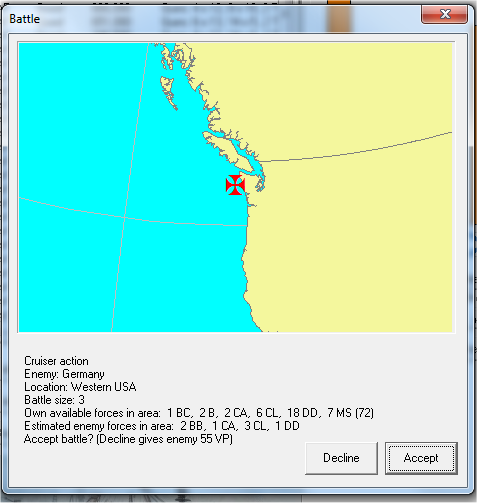
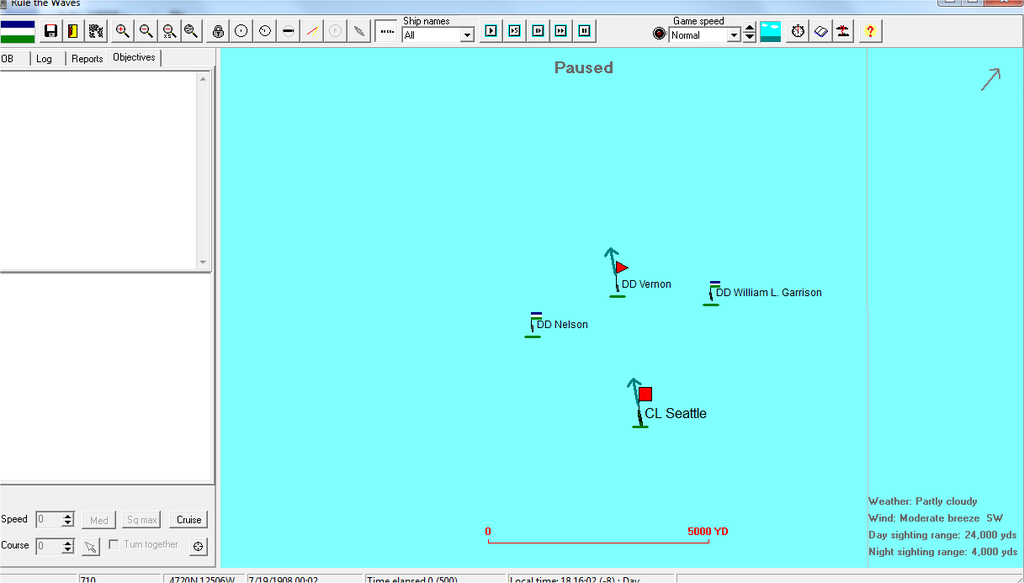
At about 1604 Pacific Time, the Cascadian destroyer Nelson spotted Gefion. She was in formation with the destroyers Vernon and William Garrison, supporting the protected cruiser Seattle. The news was signaled to Seattle and the commander of the force, Captain Geoffrey Ruthers, ordered his force to turn and engage. The captain of the Gefion realized he was being pursued by a superior force and ordered a turn west. After an hour the Seattle got close enough to fire with her 7" bow gun. But the distance and speed made hits unlikely and the Gefion managed to avoid damage. Seattle tried to close the range, but her older engines overheated and she lost speed.
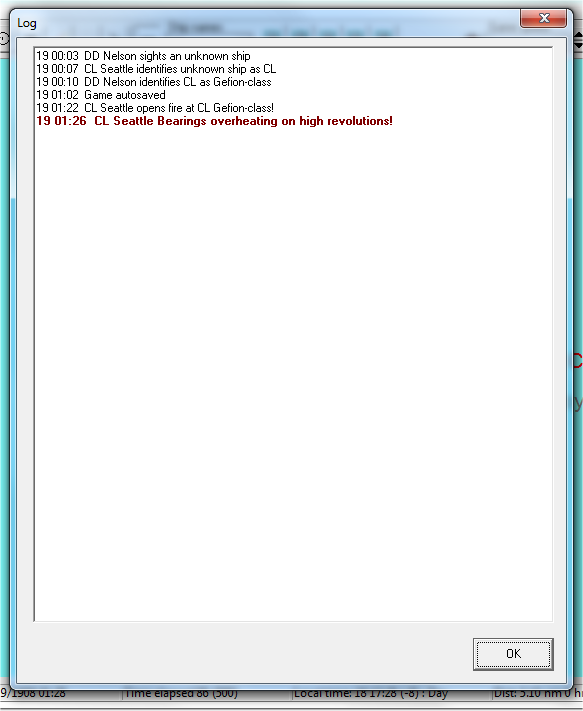
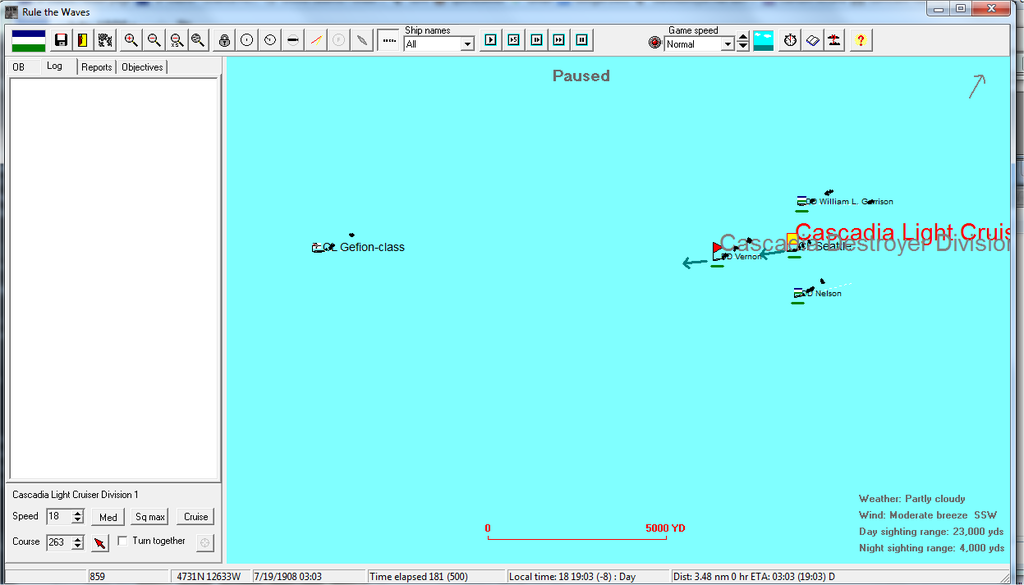
Slowly Gefion gained distance until the setting sun behind them finally obscured her in twilight and Seattle lost contact. After a four hour chase, with darkness having fallen, a disappointed Ruthers ordered his ships back to Astoria. Nelson did not see the signal initially and kept steaming west for several minutes until her skipper, Commander Gordon, ordered his ship back to Astoria as well.
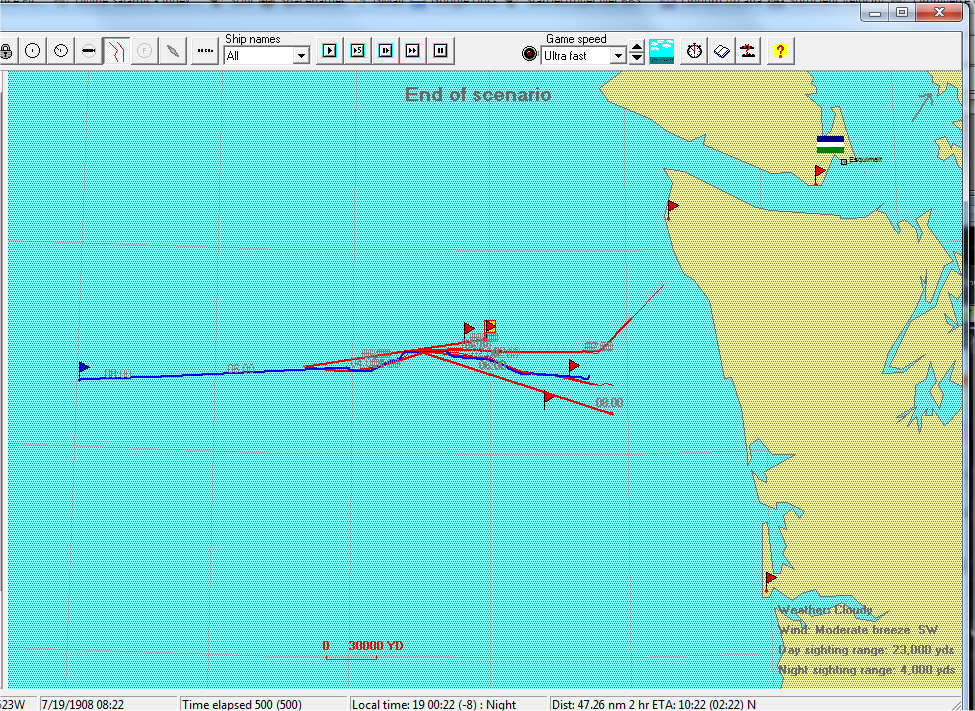
By the end of the month, Admiral Garrett was presented with two possible designs for even larger new capital warships, each with a main armament of 8 14" guns in four double turrets, two bow and two aft with one of each superimposed.
One was a new "super-battlecruiser" dubbed the Aurora. Secondary armament would be 14 5" guns in casemates, 7 per side, and 12 3" deck guns. Protection would be 10" on the main belt area with a 2.5" deck. It would use the new oil-fired boilers for fuel and have a design speed of 28 knots. It would be the fastest and most powerful ship of its kind in the world.
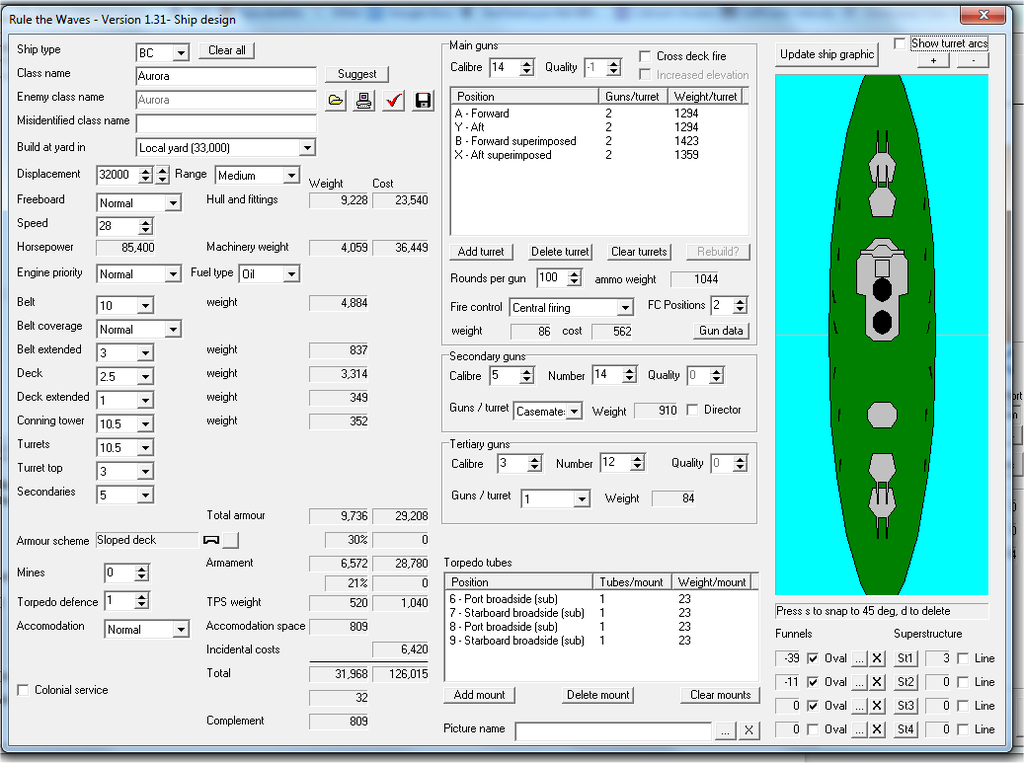
The alternative was a new sovereign-type battleship of similar tonnage and main armament. The secondary guns would be 6" in casemate instead with 16 3" deck guns. 12.5" belt and 3" deck armor would give it superior protection and 23 knot speed would let it outpace the battle-lines of the world, allowing it to dictate battle range. The design name was Constitution.

(Note: Yeah, I had to go back and change the fuel type to oil. Forgot that slider, heh.)
Ultimately, after considering the budget in question and needs for the war, Admiral Garrett authorized the laying of the Constitution, with a second hull to be laid in 1909 and further units as the budget allowed.
Indeed, with the war on, Admiral Garrett enlarged the order for the new 900t destroyers. The O'Neill and Jackson were laid.
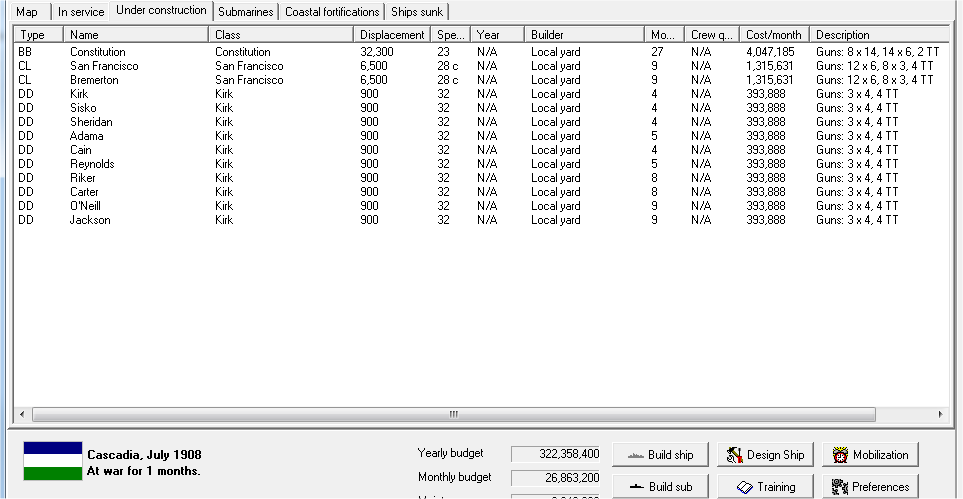
With the war on, the raiding cruisers were ordered out. They would raid German shipping in Southeast Asia, the Indian Ocean, off the West African Coast, and in northern Europe, supported by French bases.
To deal with the concentration of German ships in their Central Pacific island colonies, the Warrior was ordered into the area. The Reprisal and further reinforcements were sent from the home waters to Northeast Asia to make up for the transfer and help prepare the imminent invasion of the German concessions in China.
August 1908
Design teams reported they were nearly done with work on a new kind of scout cruiser. With the switch to oil as fuel, the protected cruiser concept was no longer workable as a protection scheme and had to be replaced.
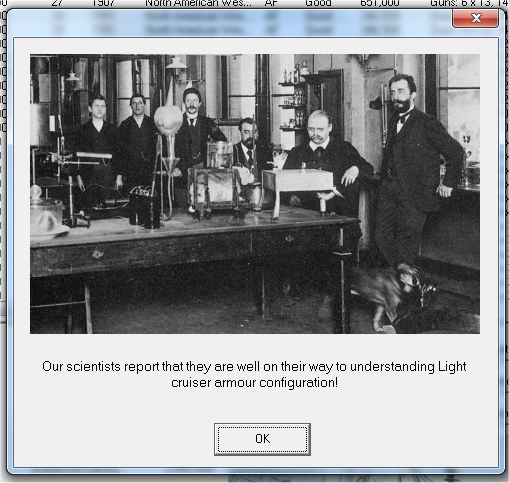
While on maneuvers off Chinese waters, the Tarpon sinks a German merchant ship trying to put into port.
The Cascadian raiding campaign scores several successes. Anchorage leads with the largest tally, sinking three German merchants in the Southeast Asia-Central Pacific zone.
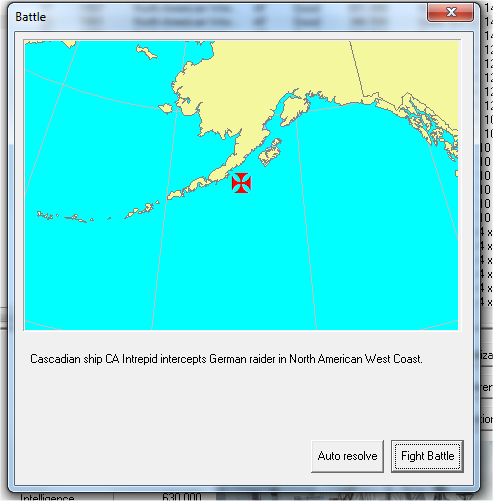
The German raiding cruiser Niobe was off the coast of Alaska hunting Cascadian shipping when it stumbled into the Intrepid.
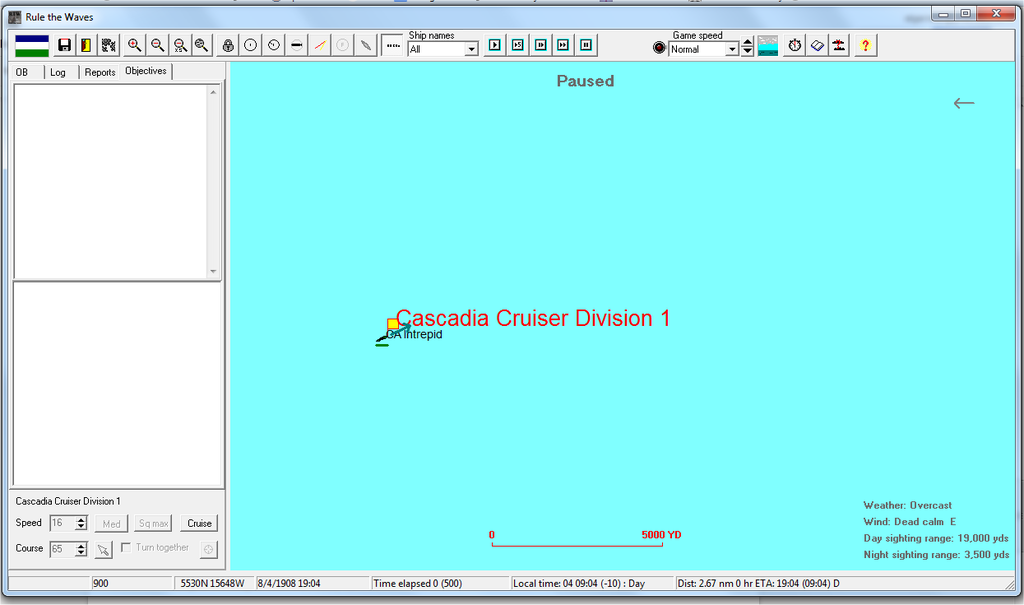
The Cascadian armored cruiser closed the distance with her powerful engines. Niobe attempted to flee northward, but couldn't get out of range in time. Repeated hits from 10" and 5" shells damaged her severely over the next hour.
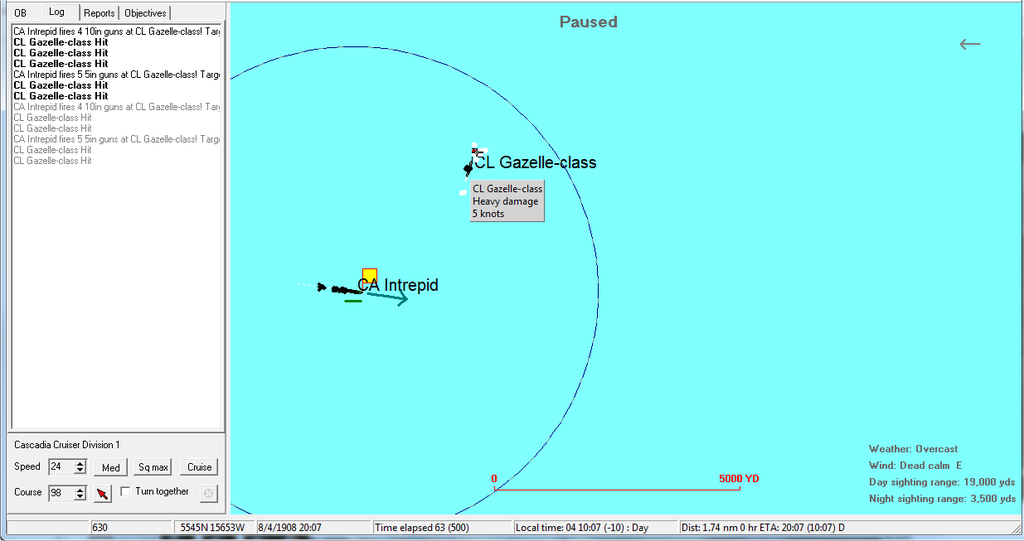
Finally she ground to a halt and, about an hour after the contact between the two, the Niobe was sinking from repeated hits and the resulting flooding.
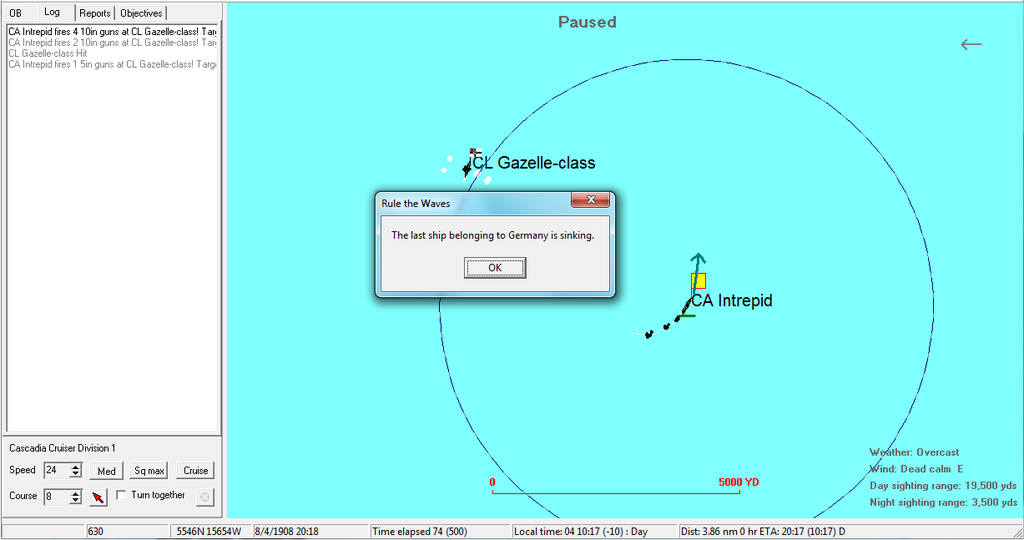
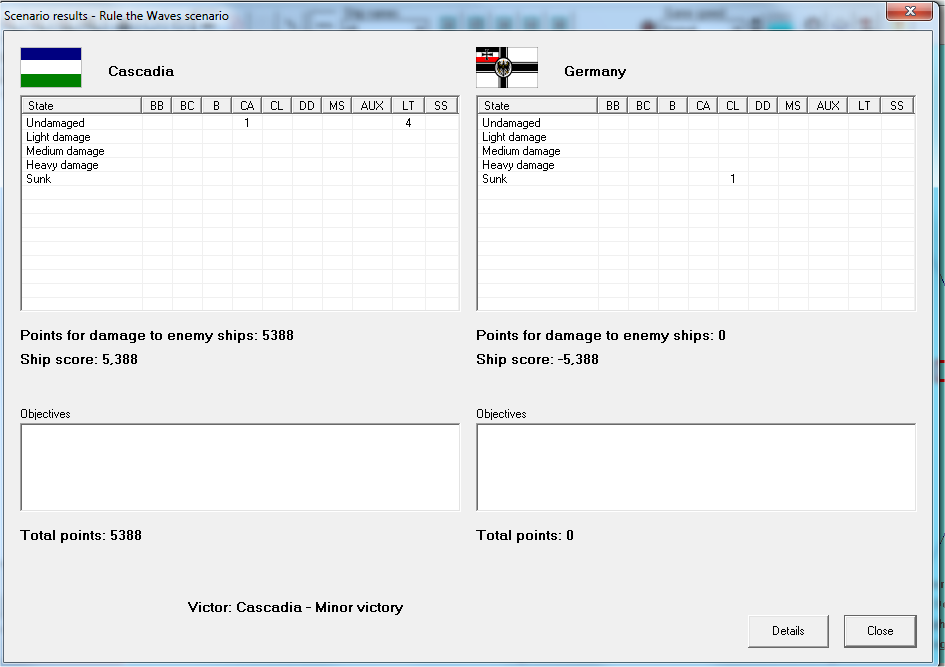
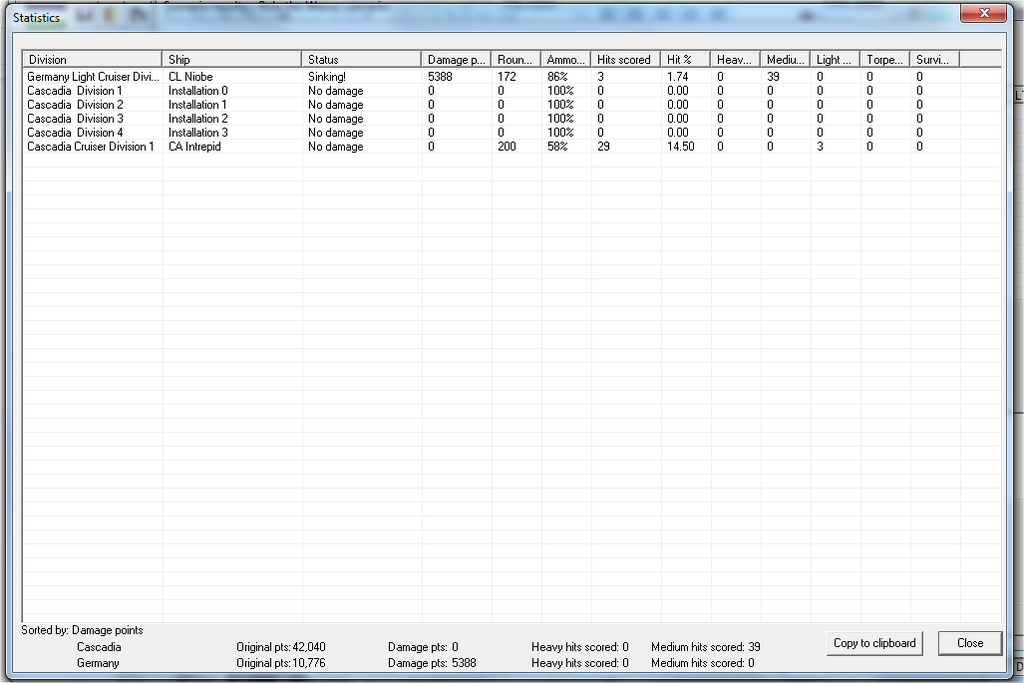
The work on the Constitution was ordered to be accelerated.
With the success of the Tarpon, the Admiralty opted to order three more new submersibles. They are named the Viper, Grayling, and Shark.
In Europe the war began with caution. The slaughter of 1903 had taught both France and Germany the difficulty of maneuver with automatic weapons and neither side wanted to see their forces cut up in a preliminary engagement. Shelling was exchanged between border positions that caused some casualties while the two foes considered their prospects for late summer operations.
France, meanwhile, put out the call to her allies for forces. Yet again the Cascadian Army formed the Cascadian Expeditionary Forces and staffed it heavily with regulars. 120,000 men would be on their way to France by the end of the month, to be joined by over 200,000 more in the following month. Between draftees and the swelling ranks of volunteers, Cascadia hoped to have a million men in arms by the end of the year.
Recruitment was not going as smoothly as hoped. The Socialists continued to proclaim an anti-war message. Neighborhoods of major industrial towns and cities where the Socialists and pro-Socialist trade unionists dominated showed far lower volunteer rates than the rest of the country. Many Socialists took to sheltering draft dodgers - particularly Socialists themselves - and plotted an "underground railroad" to ferry them to safety in Canada, Mexico, or the United States. The Government responded to rumors of these plans with threats to try anyone aiding and abetting a draft dodger. A National Service Enforcement Act was proposed in both the House and the Senate that would impose stiff penalties on the practice.
But the Socialists would not back down. Their argument was an alluring one for many Cascadians not taken with the pomp and grandeur of the moment. Cascadian boys would again be sent to die on European battlefields when, it had seemed, they had only barely avoided that fate in 1903. And this time it wasn't due to German aggressiveness but to Lakeland and his Hawks wanting a war to expand Cascadian power. The anti-imperialist message had a strong resonance with those who had come to Cascadia to get away from European conscription and armies, and those who saw no point in an overseas empire.
Representative Flagg continued to give anti-war speeches and hit the campaign trail, stumping for Socialist presidential candidate Roger Graysmith. With the Conservatives supporting Matthews' re-election, this left just Graysmith and Democratic candidate Crabbins as his adversaries.
September 1908
The war and the need for men in the military spurred on further industrial development. Productivity soared from the benefit of new management and production methods and new technologies.

As Germany faced her worldwide foes, she also continued to try and put down the Spaniards revolting against German rule in the Marianas. Cascadian and now French and Japanese aid to the planters had tripled since July and they were managing to hold control over several sections of both islands. It still remained to be seen if the Allies could secure the surrounding oceans enough to maintain a constant pace of resupply and armaments, or if Germany might yet prevail.
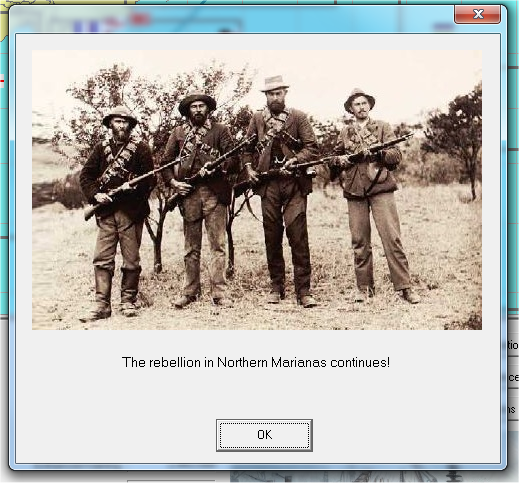
Germany meanwhile continued to look for allies. Its most likely ally was Russia, now in the hands of conservatives who kept a leery eye on the Far East and had little need for French allies. Germany, to these men, seemed more a natural partner in suppressing Polish aspirations and protecting the order of Central Europe against the forces of socialism and rampant democracy, represented in France and Cascadia.
Germany opened talks with the Tsar on greater cooperation. If Russia could be brought into the war, even if it forced Germany to support their aspirations in Turkey or to give them a greater slice in the Far East, it might yet help Germany make the gains she needed to knock France out of the war. Once France was out and compelled to make concessions, a Russo-German fleet would, it was believed, be able to overwhelm the Cascadians and Japanese.
Presuming the two powers had any bases left in the Pacific when that time came.
In Cascadia, design teams finished a new "scout cruiser" concept that would apply sloped deck style armoring to lighter cruiser hulls. Oil-fueled cruisers would thus replace the coal-fueled protected cruisers as the fleet scouts and raiders. The Sacramento-class was recommended to the Admiralty, the first of this new kind of ship with multiple 6" guns along the centreline and wings for a main batteryy and a 28 knot design speed. The Sacramento would be built to begin replacing the aged Olympia-class ships that, with only 23 knots, were simply too slow to function as fleet scouts in the upcoming decade.
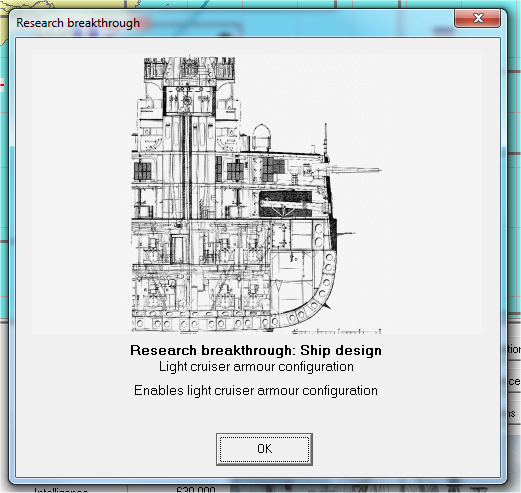
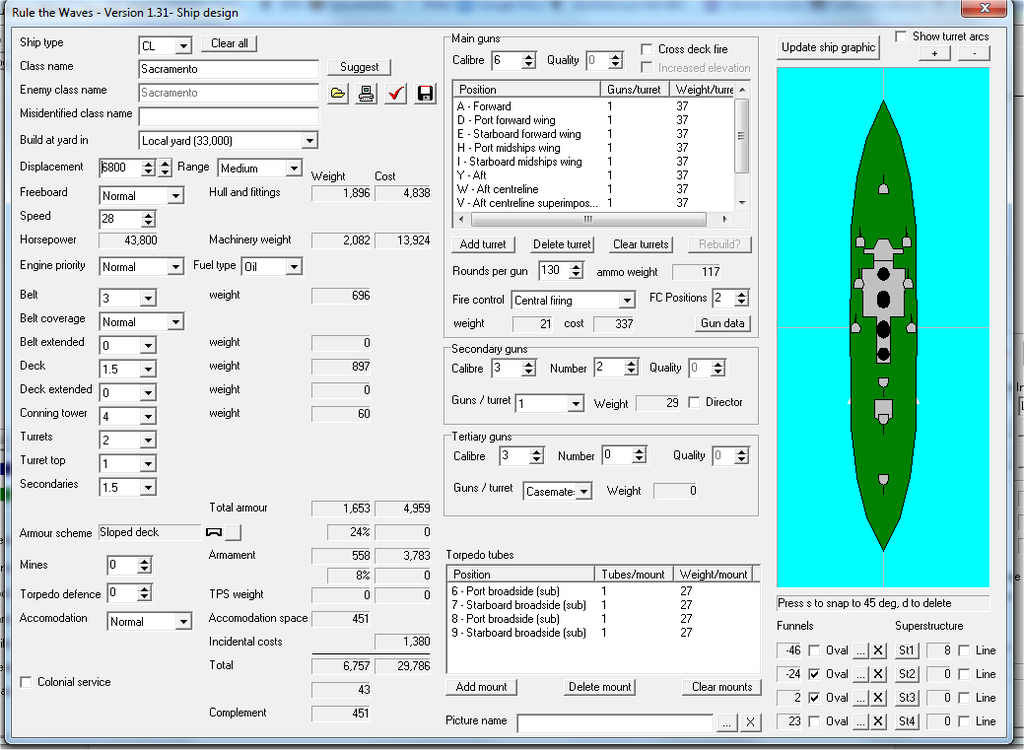
The Marine Nationale scored its first kill of a submersible, sinking a German submersible prowling off the French coast near Calais.
The raiding this month was slimmer, as the larger German cruiser fleet was able to repeatedly foil Cascadian raiders. The Fairbanks got the only merchant kill while still steaming up the Brazilian Coast. Anchorage was compelled to put into dock from mechanical problems in her machinery.
Meanwhile German raiders also put to sea. A Cascadian merchant attempting to slip out of Liverpool was caught off the coast of Ireland and sunk by the armored cruiser Hertha. The German protected cruiser Gefion caught a Cascadian vessel rounding Cape Horn and sunk her off the Argentine coast.
German ships near Hawai'i considered attacking a Cascadian convoy, but withdrew upon verifying the size of the escorting ships.
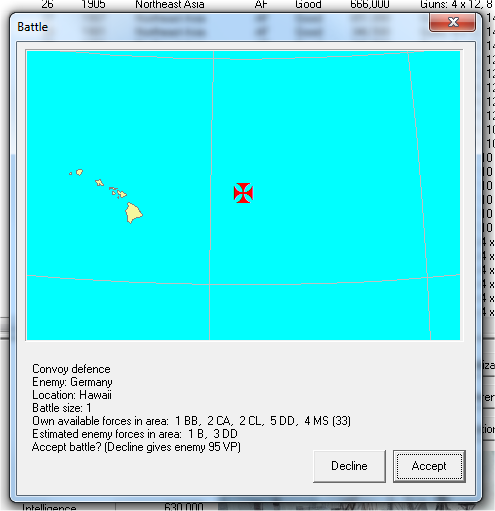
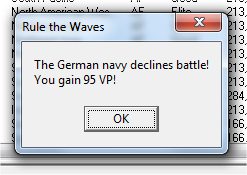
The Marine Nationale conducted several bombardments and maneuvers that isolated the Germans from their African colonies for the month. French troops were again marching into Cameroon and Togo.
Meanwhile Nihon Kaigun under Admiral Togo swept the German squadron at Tsingtao out of the area, allowing the Cascadian Navy to concentrate on the impending invasion of the German Chinese concessions. Cascadian diplomats successfully negotiated a treaty with the Imperial government by which Cascadian troops would not be attacked by Chinese forces so long as they remained within the Concessions.
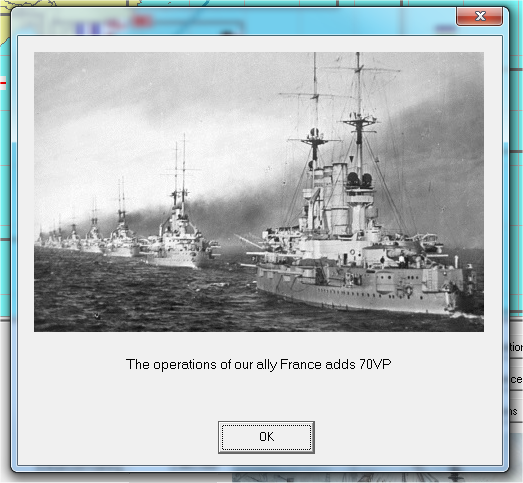
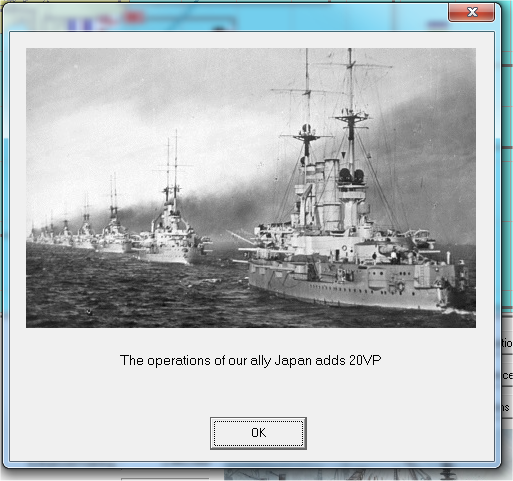
East of the Faklland Islands, a German cruiser intercepted the Denver while she was steaming for the Mediterranean.
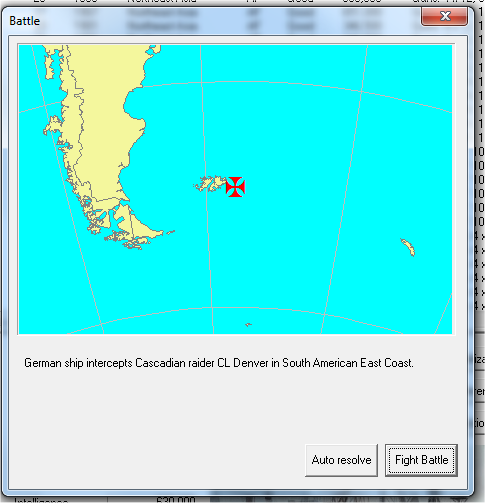
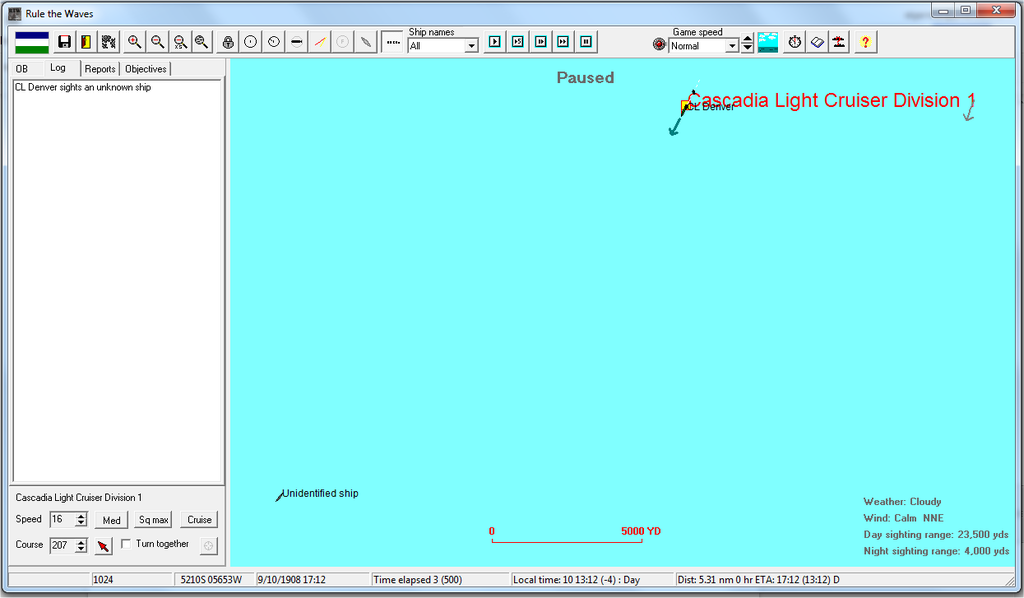
The Denver's skipper, Captain Halling, turned east to keep the range open until he could escape at nightfall.
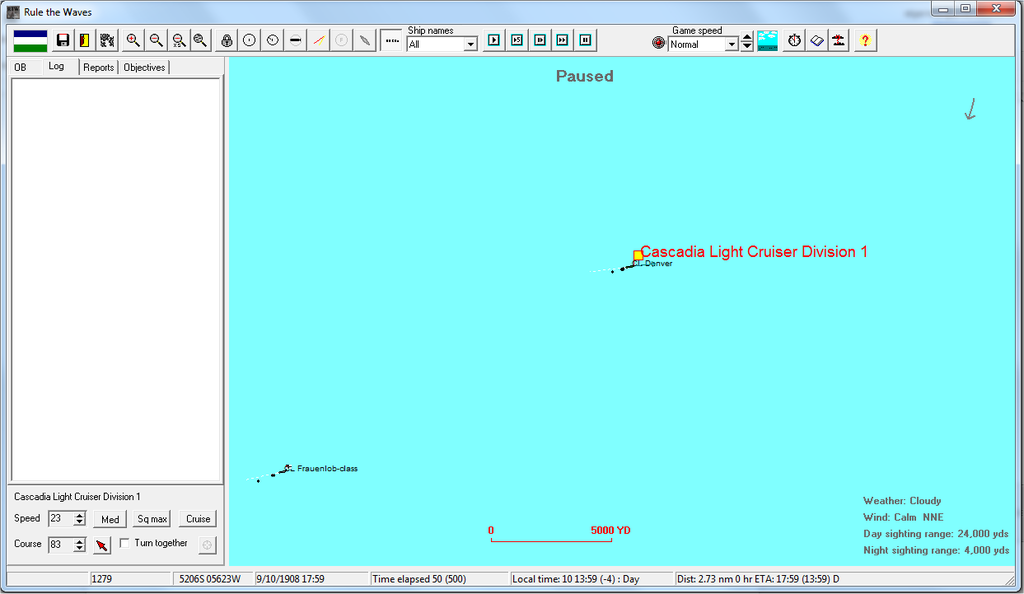
After over 100 minutes of high speed, Denver's engines began to lose power. With speed down to 21 knots the German caught up and opened fire.
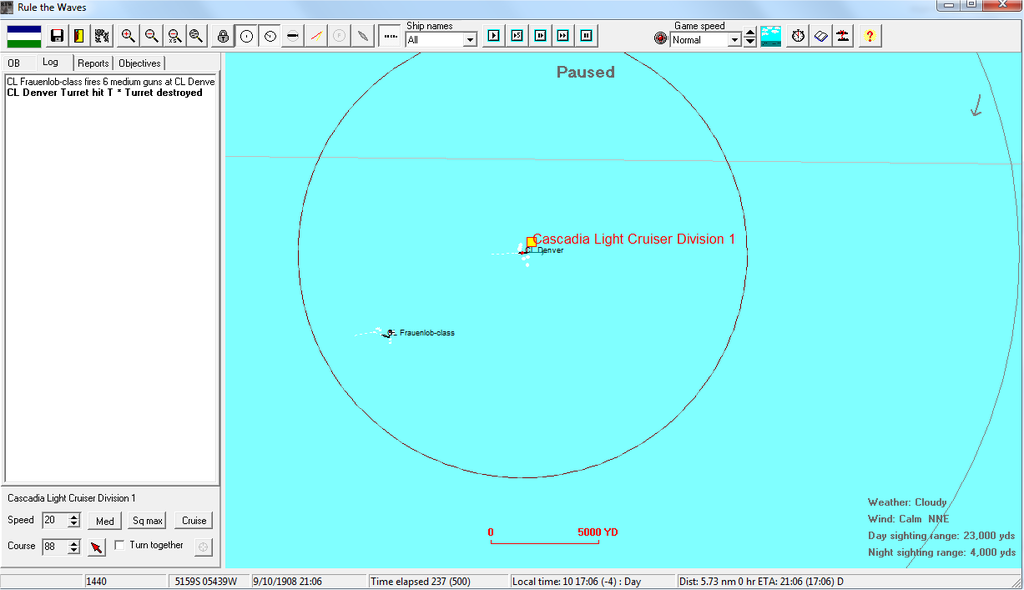
She only managed a few hits before nightfall allowed Denver to slip away, but the damage she inflicted forced the Denver to abort her plan to cross the South Atlantic and instead make for the Mediterranean and the French base at Dakar.
Again, the large German cruiser fleet showed repeated success in thwarting the Cascadian raiding cruisers across the globe.
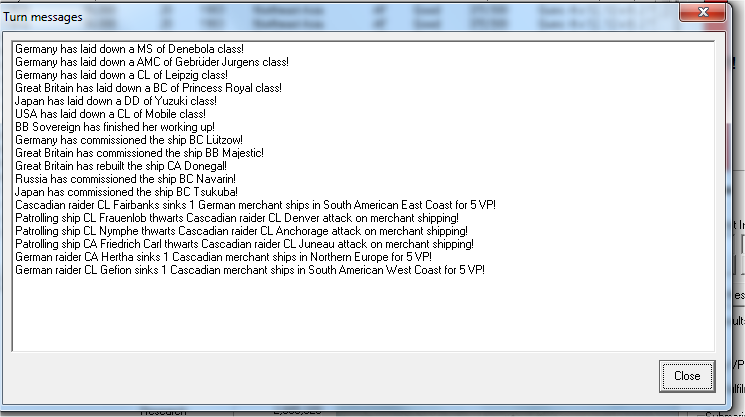
The Admiralty approved laying the Sacramento.
With her working up completed and the ship ready for action, the Sovereign was ordered to join the fleet at Chuuk for operations against the German Pacific Squadron. Vice Admiral Roger MacCallister would fly his flag from Sovereign as CO of the Battle Fleet.
October 1908
Shortly after the beginning of the month, a division of Cascadian troops landed near Tsingtao in the German concessions in China. The landing was covered by the Cascadian fleet and forced the beach clear. By the end of the month the Cascadian forces would more than triple, and the siege of Tsingtao was well underway.
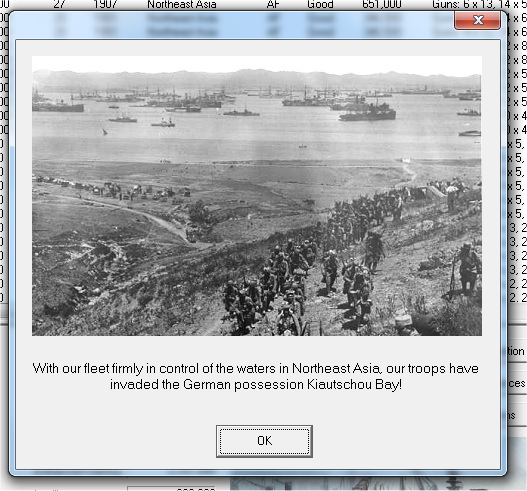
Unable to make Dakar, Denver ended up in the Canaries. Upon making Tenerife, Denver was found to have taken severe strain to her old reciprocating steam engines as well as having several knocked out turrets. The German Embassy in Madrid successfully prevailed upon Spanish officials to intern the Denver when she failed to finish the necessary engine repairs in time.
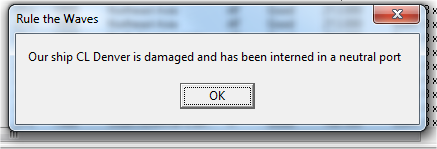
Germany had another success on the diplomatic front when Russian security services arrested a Cascadian named John Bretan in St. Petersburg. He had been entrapped with promises from a compromised clerk at the Russian Navy for the timetable to deploy the Baltic Sea Fleet to the Far East. Bretan was a known figure who served as a clerk at the Cascadian Embassy. Cascadian Intelligence had gotten sloppy over the prior year and became too ambitious for its own good.
The smart thing to do would have been to disavow Bretan as over-enthusiastic. But the Admiralty worried about what he might divulge under duress and acknowledged him, hoping that the acknowledgement might allow a trade for Mikhail Rosovsky, a Russian handler arrested for running the Russians' spy ring in Portland. The acknowledgement went too far in the other direction, however, as it prompted a number of newspapers to paint Bretan as a patriot and national hero. This inflamed tensions with Russia.
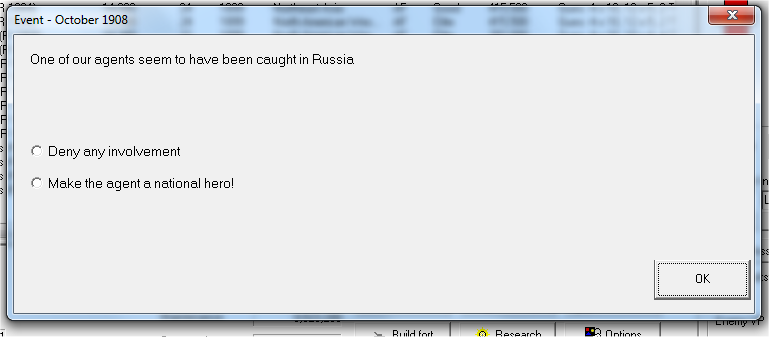
Russia Tension to 11
Brighter news was improved success by the raiding fleet. Fairbanks, Juneau, and Las Vegas all sank a German merchantman. The Hertha also claimed another victim, a Cascadian merchant that was steaming out of Cuba.
[justify]
The French continued their campaign against Germany's African colonies. Japan, meanwhile, used her own fleet to escort a large consignment of arms and supplies to the Saipan rebels and drove the German ships back to port.
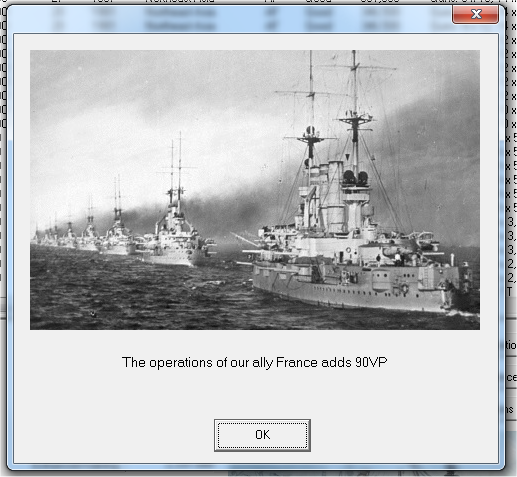
The Germans meanwhile launched their own operation. They approached Palau to draw out local Cascadian patrols to ambush them with superior force.
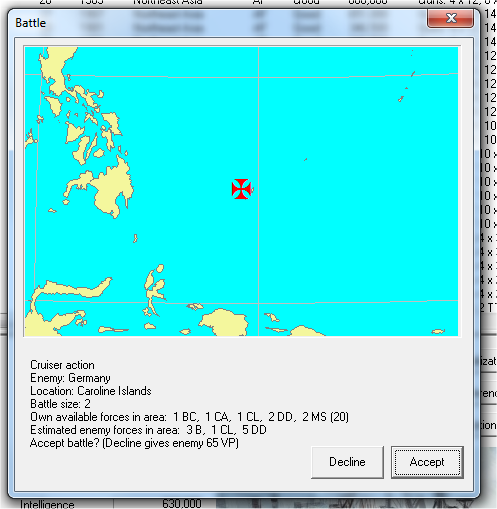
The cruiser Olympia and the destroyers Bainbridge and Rodriguez sailed out to face the German force, at the moment consisting of the Gazelle-class cruiser Thetis. Contact is made at 1035.
After an exchange, and the brief loss off rudder control by the Olympia, the enemy ship retreats north into a rain squall.
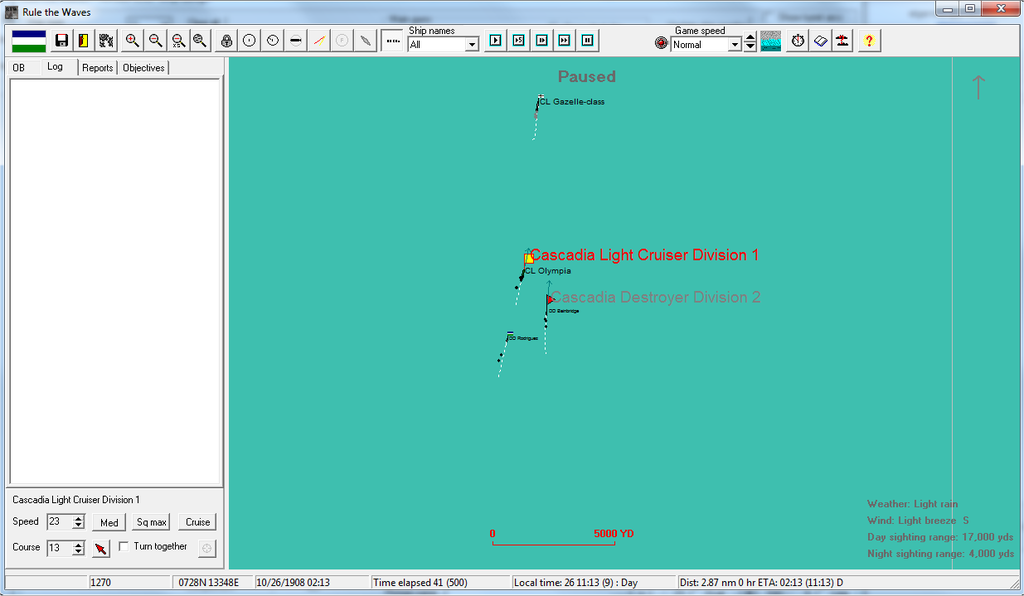
It turns northeast and clears the rain, at 1213, allowing accurate fire again. Several hits over the next hour weakened the enemy ship. Olympia's old engine starts to give trouble at 1400. But before the Thetis can slip away, she takes two 7" shells that damage her machinery and slow her down. More shellfire from Olympia sets the Thetis on fire. She keeps trying to evade, going north and south.
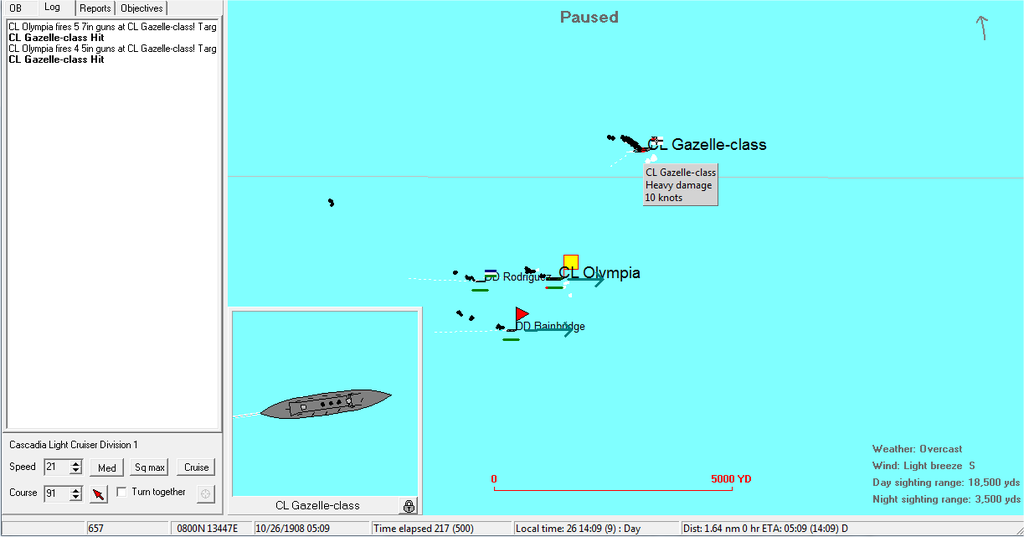
Before 1500 she loses most of her speed and is a cripple.
After many more shell hits over the next 45 minutes, she takes two torpedoes, then a third from Olympia.
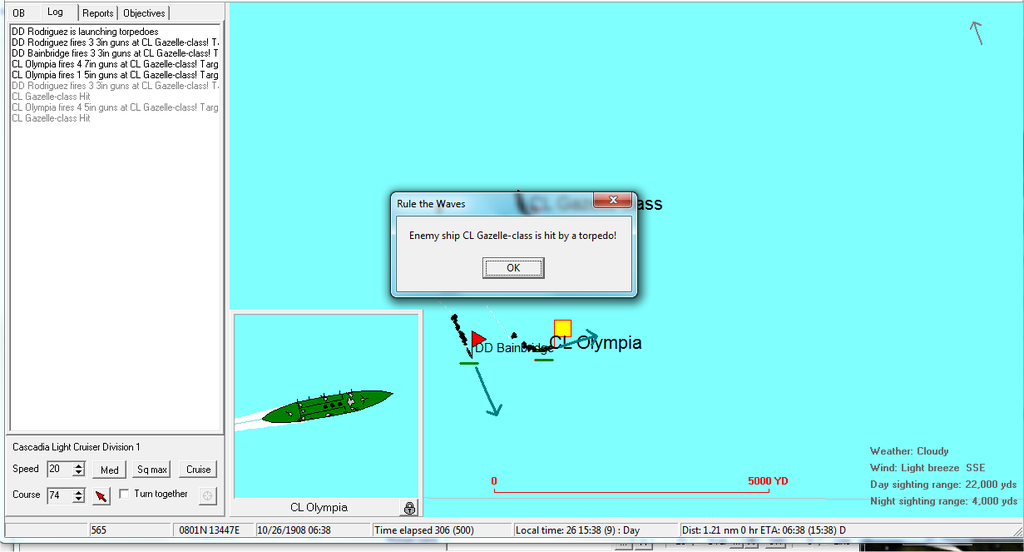
This is too much for the poor Thetis and she is soon sinking. The Rodriguez is detached to pick up her survivors.
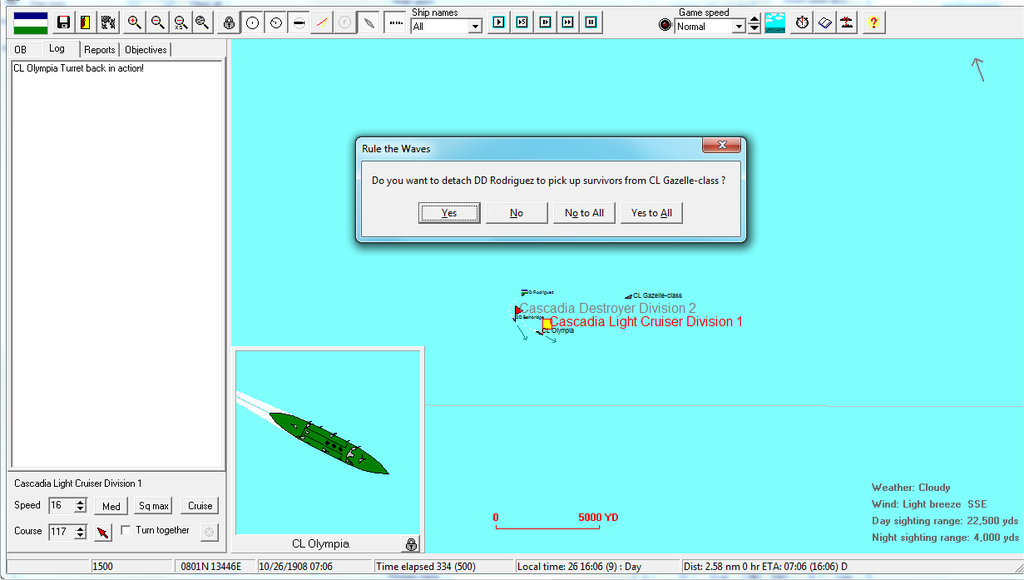
But the day wasn't over for the Olympia. As she and her destroyers steamed for the anchorage at Pelelieu, the Fürst Bismarck and two German destroyers approached from the west. Thetis had been scouting for the German armored cruiser and lost contact.
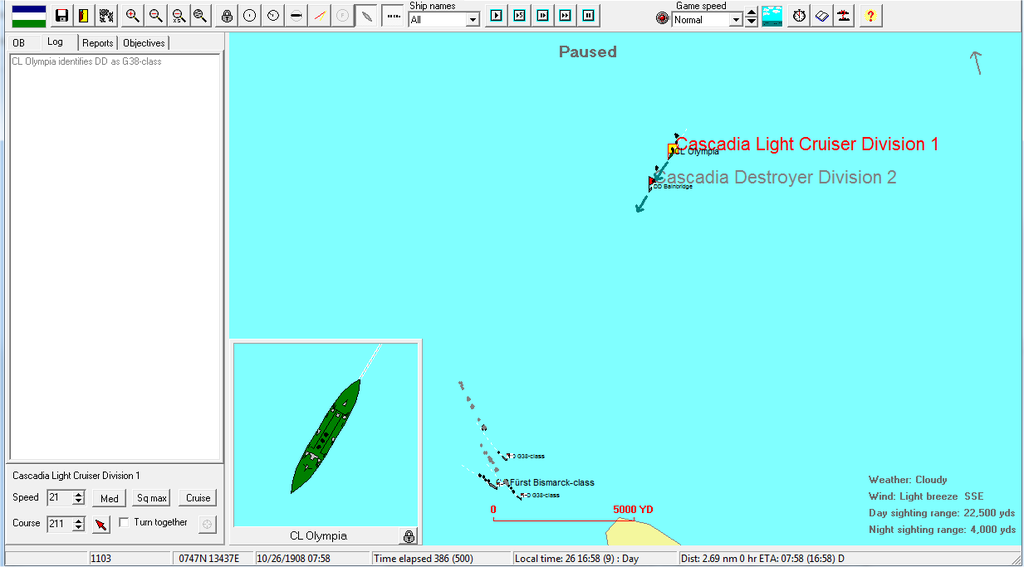
Facing a superior foe with engine trouble and reduced ammunition in her magazines, the Olympia sails east of the Palau islands and evades the CA's fire. A turn southeast guarantees she remains out of easy gun range until twilight reduces visibility enough that the German ships break off.
Her work done, the Olympia returned to port.
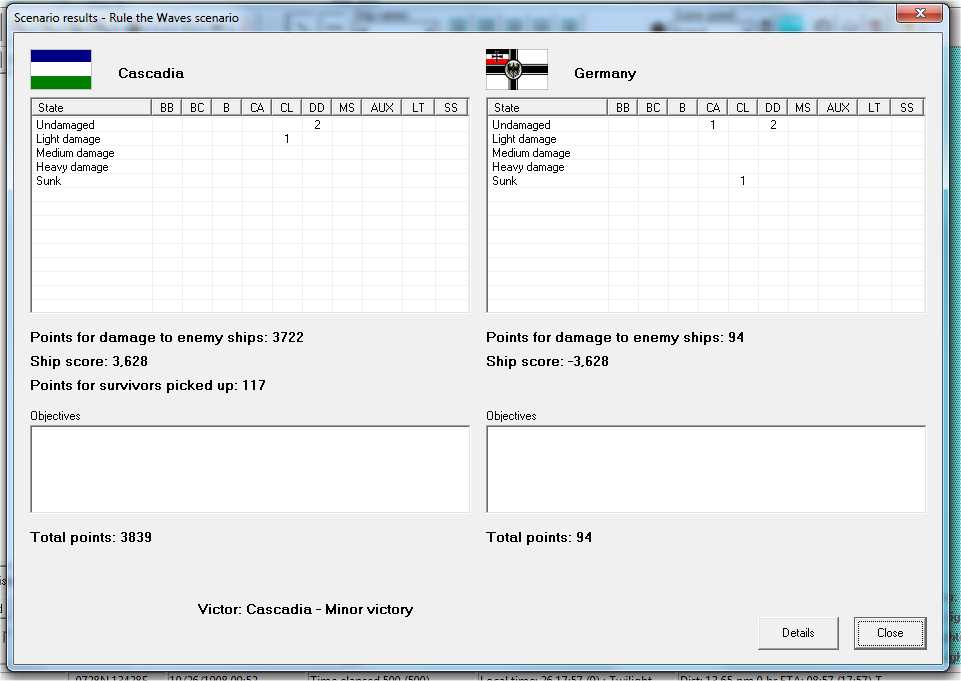
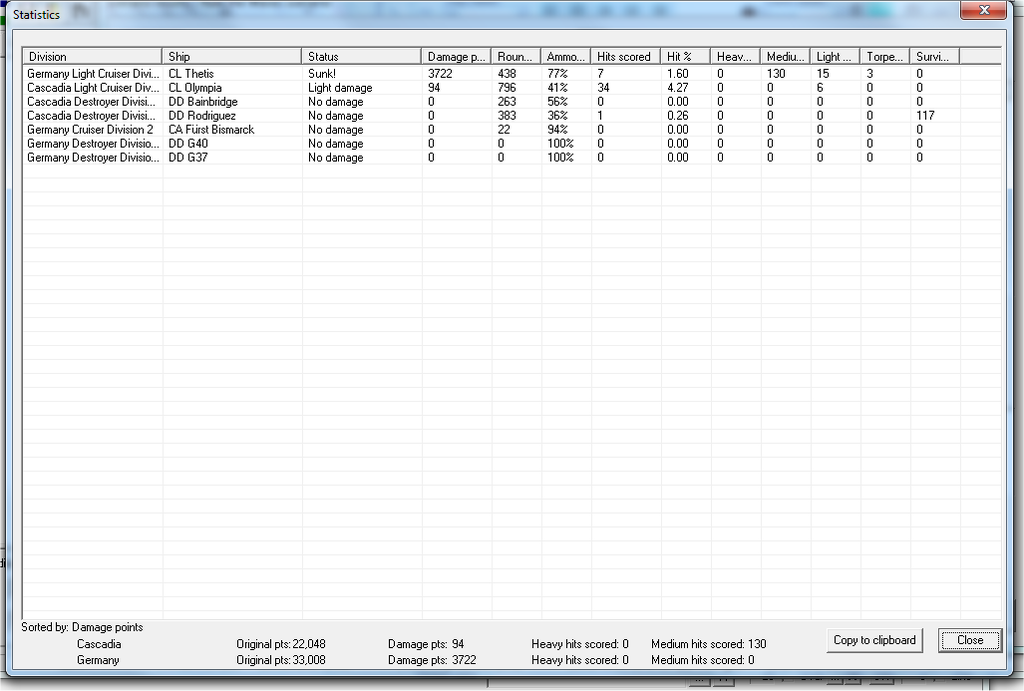
The Presidential campaign turned incredibly bitter. Matthews, while not a Hawk, was still unwilling to pronounce himself a "peace candidate". He gave a public speech to the effect that the issue with Germany had to be settled "with greater finality" than before, and committed himself to prosecuting the war to victory.
Graysmith and Crabbins both attacked him for this. Crabbins insisted that the Westminster Treaty was a viable outcome for peace and that the Hawks had unnecessarily provoked Germany. He stated he was ready to entertain peace at any time, and would do so as President.
Graysmith went even further. He would, upon becoming President, immediately order a cessation of all further military operations and offer Germany compensation for the reckless support of the Marianas revolt. This was far too much for many Cascadians, who dubbed Graysmith and Flagg's campaign as "the Defeat Platform",. The Socialists in turn accused Crabbins of not being devoted to the common Cascadian as he claimed; the war would not end, they argued, unless Cascadia paid compensation of some sort over the conflict that they had started. That the German price might be Samoa was not lost on many.
Nevertheless the Trade Unions and other Socialist-aligned groups turned out in droves. Peace marches were held in several major cities from Los Angeles to Vancouver. Representative Flagg attended as many as possible while stumping for Socialist candidates in all of the great industrial cities and towns. "Peace and Prosperity" was the Socialist slogan for the campaign, soon mockingly turned into "Defeat and Destitution" by Liberal and Conservative opponents of the Socialists.
Socialist support prompted a strike at Moran Brothers in Seattle, with yard workers demanding a higher wage to match the increase in profits the company was seeing from the war contracts it was getting. As both sides negotiated and jockied for popular and government support, work at the yard slowed, delaying the destroyer Kirk.
Between the war, the election, and the draft call-ups, the brief easing of social tension brought about by the German declaration of war was evaporating. Cascadian society was becoming bitterly divided over the war.[/justify]
Unrest to 6.
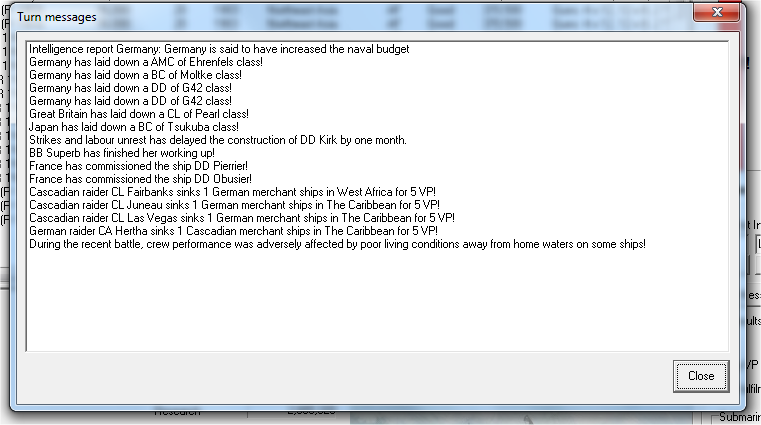
With the invasion a success and Cascadian troops ashore in China, several ships assigned to the Northeast Asia area were ordered south to joint the squadrons at Manila and Chuuk.
Additionally, another convoy of troops departed from San Francisco, bound for Marseilles and the war in Europe.
Reinforcements sent to SE Asia from Tsingtao area.
November 1908
Election Day came on the first Thursday of the month, the 5th. Over that day and the day after the results were tallied. In the end, Matthews won.
In retrospect it was not surprising. For all of the Socialists' peace campaigning, many Cascadians from all walks of life wanted a chance to prove their country. Germany was a threat to the Cascadian position in the Pacific. And to vote for a candidate pledging to do whatever it took to negotiate peace was seen as treasonous. Graysmith did a respectable showing in many of the country's strongest working areas, but he utterly failed in the interior reaches, the mining and farming towns. Crabbins did manage votes in the traditional Democratic strongholds, the small towns in the interior that the Socialists could never penetrate, but he was completely crushed between the mass of support for Matthews and the fervor of the Socialists for Graysmith.
The end result was seen as Matthews being re-elected with a mandate, albeit not a big one, to continue the war until a reasonable peace was achieved.
Cascadian scientists and engineers continued their work. Simnel & King delivered plans to the Navy for improved small tube boilers. Mare Island Naval Yard teams developed a new form of mines for anti-submersible use.

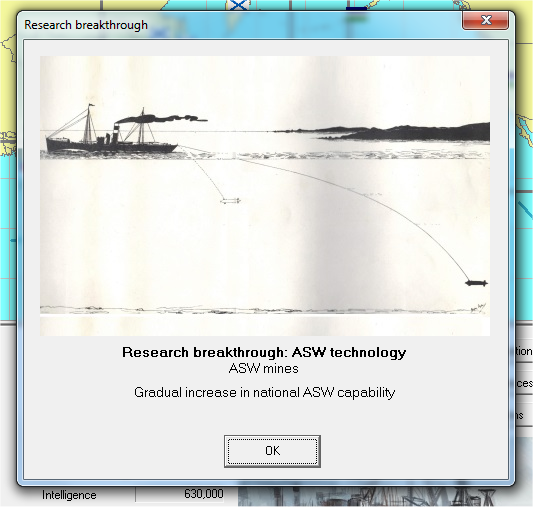
The Cain, Sheridan, and Sisko were finished and commissioned.
Cain, Sheridan, Sisko commissioned
The capture of Bretan in Saint Petersburg unraveled the entire Cascadian intelligence network in Russia. Due to the resulting leak another agent, Michael Roston, was caught with Russian mobilization timetables while trying to get out of the city.
With tensions with Russia so high, the Admiralty disavowed Roston.
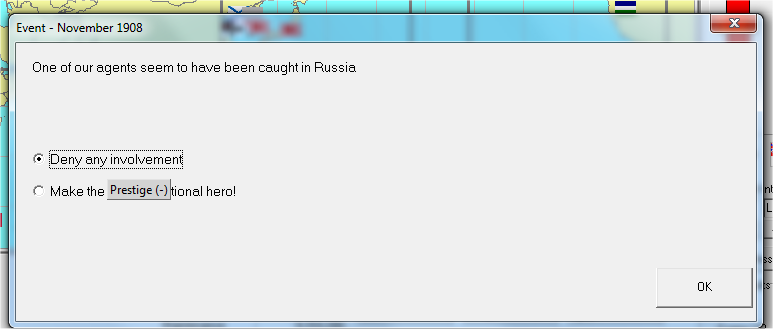
But it wasn't enough. The Russian Government had decided it was time to make their stand clear. The German Ambassador was sent for. Russia pledged to join the war as Germany's ally if their demands were not met.
Those demands, communicated to the Allies, were unacceptable. France would be forced to give the Russians their full support against the Turks. Japan would give Russia special rights in Korea and demilitarize Hokkaido. Cascadia would be required to give Russia preference in Bering Strait fishing and to dismantle her Dutch Harbor naval station. Economic concessions in China would follow, and Cascadia and Japan would pledge not to take Tsingtao from Germany without Russia's permission.
The ultimatum was sent on November 9th. The three governments discussed the situation. In Paris, Delcassé saw his worst nightmare coming true. France wasn't just fighting Germany without Russian aid, she would soon be facing Russian troops as well as German. But the nation was ready to make up for 1903. And, it was thought, who was surprised at the Russian behavior? They were even worse autocrats than the Germans, a near-dictatorship that exiled dissidents to Siberia. Cascadia was a fellow Republic. And the Japanese were an up and coming power. Russia would be forced to deploy substantial reinforcements toward Manchuria to stop the Japanese Army. So, with much trepidation, Paris kept the course with her allies, although with waning enthusiasm for a war that had yet to get beyond border skirmishes in mainland France.
The news soured Matthews' re-election. But Lakeland was pleased; he saw opportunity for further Cascadian gains in the war. And wasn't Russia the target of the alliance with Japan anyway? McInnes was more circumspect about these opportunities, knowing full-well Japan would want her piece of the pie, and that nothing would sour their alliance more than for Japan and Cascadia to fight over the spoils.
The reply was nonetheless given. The Russian ultimatum was refused by all Allied governments on the 11th.
In response, Russia mobilized. The Russian fleet put to sea. On the 13th of November, 1908, the Russian Empire declared war on the three Allied governments. A treaty of alliance with Germany was signed two days later, with spoils already laid out concerning Korea, the Philippines, Alaska, China, and the Carolines. Russia agreed to support forced cessation of more French territory as well.
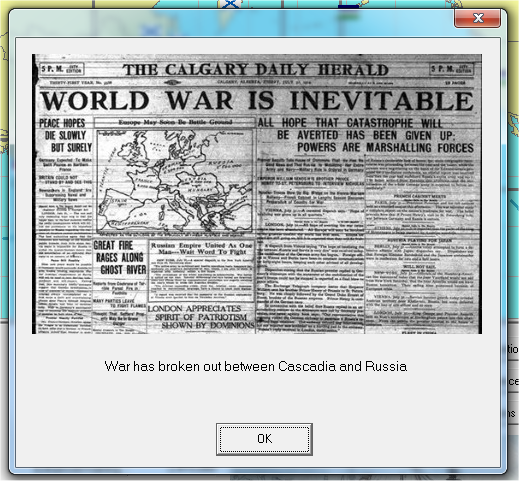
”A Radical is a man with both feet planted firmly in the air.” – Franklin Delano Roosevelt
"No folly is more costly than the folly of intolerant idealism." - Sir Winston L. S. Churchill, Princips Britannia
American Conservatism is about the exercise of personal responsibility without state interference in the lives of the citizenry..... unless, of course, it involves using the bludgeon of state power to suppress things Conservatives do not like.
DONALD J. TRUMP IS A SEDITIOUS TRAITOR AND MUST BE IMPEACHED
"No folly is more costly than the folly of intolerant idealism." - Sir Winston L. S. Churchill, Princips Britannia
American Conservatism is about the exercise of personal responsibility without state interference in the lives of the citizenry..... unless, of course, it involves using the bludgeon of state power to suppress things Conservatives do not like.
DONALD J. TRUMP IS A SEDITIOUS TRAITOR AND MUST BE IMPEACHED
- Elheru Aran
- Emperor's Hand
- Posts: 13073
- Joined: 2004-03-04 01:15am
- Location: Georgia
Re: Let's Play "Rule The Waves" w/ Steve's Custom Country "Cascadia"
Woot for DD's O'Neill and Jackson! 
Any big engagements like Jutland to look forward to?
Any big engagements like Jutland to look forward to?
It's a strange world. Let's keep it that way.
Re: Let's Play "Rule The Waves" w/ Steve's Custom Country "Cascadia"
Hopefully any large engagements are more decisive than Jutland. But I too, want to see a full-scale dreadnought engagement. 
You will be assimilated...bunghole!
Re: Let's Play "Rule The Waves" w/ Steve's Custom Country "Cascadia"
Sadly not. A couple of fights with the BCs or BBs in them, but most of my battles were cruiser battles.
”A Radical is a man with both feet planted firmly in the air.” – Franklin Delano Roosevelt
"No folly is more costly than the folly of intolerant idealism." - Sir Winston L. S. Churchill, Princips Britannia
American Conservatism is about the exercise of personal responsibility without state interference in the lives of the citizenry..... unless, of course, it involves using the bludgeon of state power to suppress things Conservatives do not like.
DONALD J. TRUMP IS A SEDITIOUS TRAITOR AND MUST BE IMPEACHED
"No folly is more costly than the folly of intolerant idealism." - Sir Winston L. S. Churchill, Princips Britannia
American Conservatism is about the exercise of personal responsibility without state interference in the lives of the citizenry..... unless, of course, it involves using the bludgeon of state power to suppress things Conservatives do not like.
DONALD J. TRUMP IS A SEDITIOUS TRAITOR AND MUST BE IMPEACHED
- Eternal_Freedom
- Castellan
- Posts: 10413
- Joined: 2010-03-09 02:16pm
- Location: CIC, Battlestar Temeraire
Re: Let's Play "Rule The Waves" w/ Steve's Custom Country "Cascadia"
At least I get to do something at least.
I suspect it'll take 10-15 years before any two sides have enough ships for a Jutland-sized battle, especially since no-one, especially not Cascadia, is laying down 4 BBs a year.
I suspect it'll take 10-15 years before any two sides have enough ships for a Jutland-sized battle, especially since no-one, especially not Cascadia, is laying down 4 BBs a year.
Baltar: "I don't want to miss a moment of the last Battlestar's destruction!"
Centurion: "Sir, I really think you should look at the other Battlestar."
Baltar: "What are you babbling about other...it's impossible!"
Centurion: "No. It is a Battlestar."
Corrax Entry 7:17: So you walk eternally through the shadow realms, standing against evil where all others falter. May your thirst for retribution never quench, may the blood on your sword never dry, and may we never need you again.
Centurion: "Sir, I really think you should look at the other Battlestar."
Baltar: "What are you babbling about other...it's impossible!"
Centurion: "No. It is a Battlestar."
Corrax Entry 7:17: So you walk eternally through the shadow realms, standing against evil where all others falter. May your thirst for retribution never quench, may the blood on your sword never dry, and may we never need you again.
Re: Let's Play "Rule The Waves" w/ Steve's Custom Country "Cascadia"
The war started out badly for Russia. Within days of the declaration of war, a Russian submersible assigned to Sakhalin was sunk off the coast of Hokkaido by a Japanese patrol.
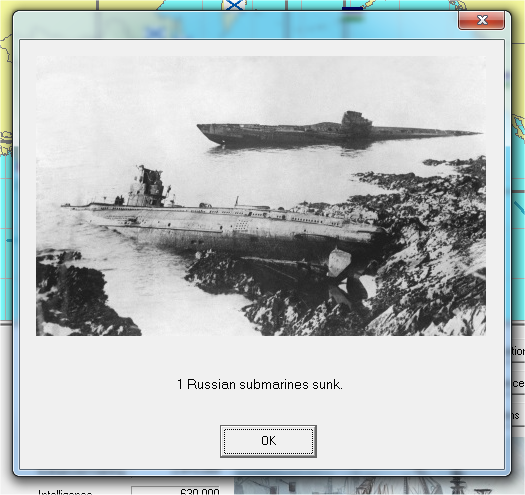
The Fairbanks and San Jose sunk three German ships in African waters.
The German raider Gefion ran low on fuel due to her pursuits and had to put into port, where she was interned.

The German Pacific Squadron attempted a full sortie against the Cascadian ships at Chuuk. The Germans hoped that the spread out Cascadian forces would allow them to defeat the Cascadian fleet in detail.
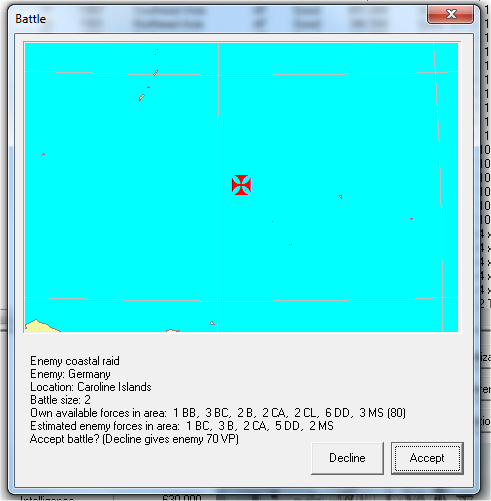
But as they approached, German scouts identified the ships in the lagoon. And the fact that among them was the Sovereign. As the German fleet had nothing to equal the world's most powerful battleship yet, the Germans decided to withdraw.
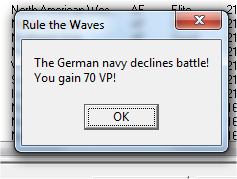
The election defeat did nothing to slow Flagg down. He continued to assert himself and the Socialist Party nationally, provoking strikes and labor unrest while demanding higher wages. National steel production declined from a major strike at several Seattle-area steel mills. Combined with the ongoing labor unrest at Moran Brothers, this delayed the destroyer Adama.
Other war measures were effective in improving production. Increased shift times allowed Mare Island Naval Yard to shorten construction on the Viper.
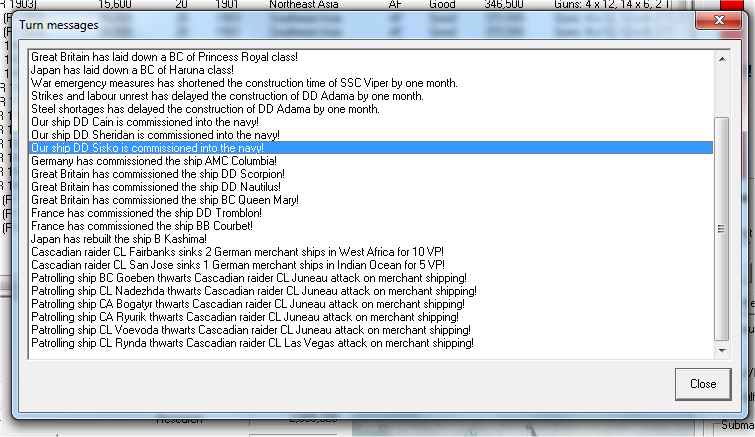
Puget Sound
29 November 1908
Captain Wallace stood in the open, wet air and felt the light winter drizzle patter on his cover and his uniform greatcoat. Beside him Commander Walter Pentworth was standing, having joined him on the deck for this occasion.
In front of them the forward main turrets of the Superb were at rest. Uniformed sailors were standing on and around the mighty 13" gun emplacements, as they were across the deck. They all looked out upon the coast of the Olympic Peninsula in silence as it moved by at a brisk 16 knots.
Around them, ferries and coastal traffic made sure to stay clear. The Superb was given the run of the Sound as she departed for her station at Chuuk with the Battle Fleet.
"Good lads," Captain Wallace said. He still had a slight Scots brogue to his voice, even after decades away from his family's ancestral homeland. "It's always right to be somber when sailing from home. Especially on a task like ours. We just have to make sure their spirit is up for the battles to come, Commander."
"Yes, Captain," Pentworth agreed.
"The Germans and the Russians. Our natural foes if you ask me. Repressive lot they are." Captain Wallace held up his binoculars and spied Mt. Olympus, on the like-named peninsula, in the distance. It was only barely visible through the gray skies of the new winter. "My regards to Commander Stirling, the engines are running smooth."
"I'll let him know, sir."
"Nervous, Pentworth?"
"A little. I would rather my son know his father when he grew up, sir."
"Ah. Yes." Wallace nodded. "A good reason to be nervous, Commander. Just remember that it's one thing to be nervous, another to lose nerve. We'll need that nerve if we're to come home with our ship again."
"Agreed."
He said nothing more as they approached Port Townsend. The Strait of Juan de Fuca was ahead, and from there they would be out on the Pacific. Hawai'i and Chuuk awaited.
So did the war.
December 1908
The Kirk was commissioned.
Design and doctrine arguments delay the development of anti-submersible Q-ships.
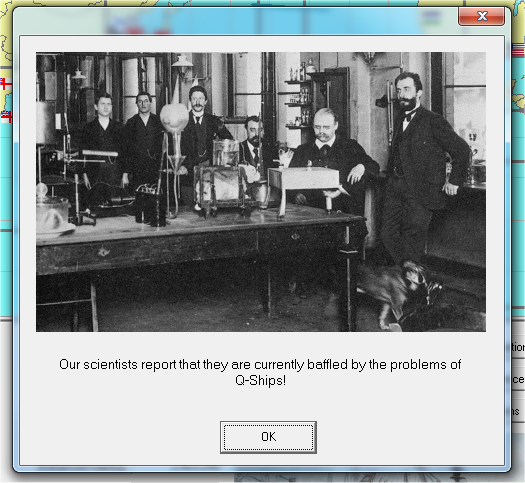
The Fairbanks and San Jose reported more success. The German armored cruiser Freya also scored a Cascadian ship in Southeast Asia. The Russian armored cruiser Bayan never got a chance, though. She ran low on fuel pursuing possible targets and ended up in internment.

A naval engagement between the French and German fleets sees the destroyer G-37 badly damaged.
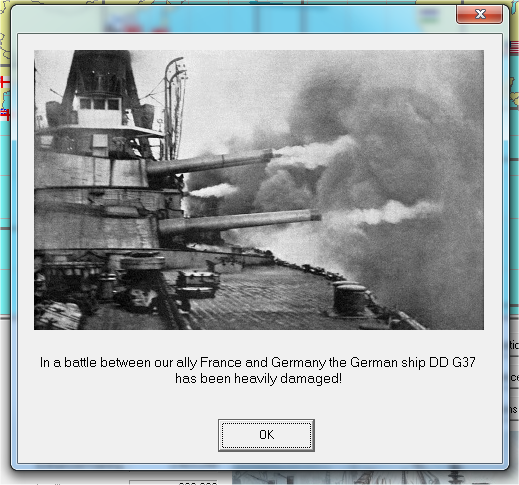
Japan carried out a desultory bombardment of Sakhalin, rattling Russian confidence
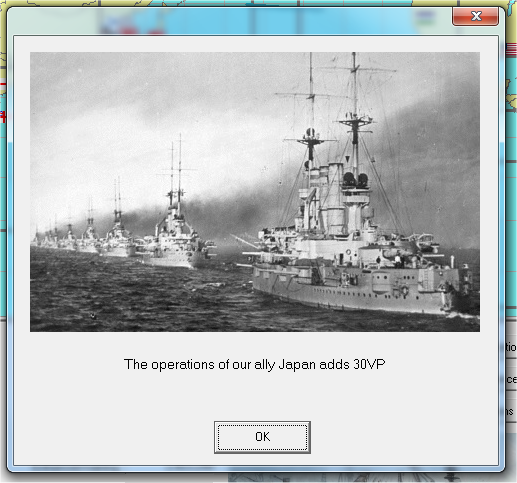
Cascadian ships sailing near Kamchatka en route to station off China detect a Russian fleet near Kronotsky Point. The Russians refuse to give battle.
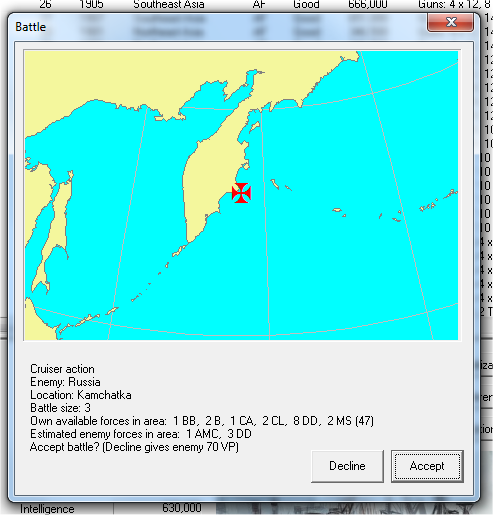
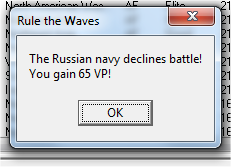
Meanwhile, the Germans attempt a daring raid on Victoria Island to force Cascadia to redeploy some of their heavy units back to home waters. The predreadnought Weissenburg and a destroyer are assigned to the task.
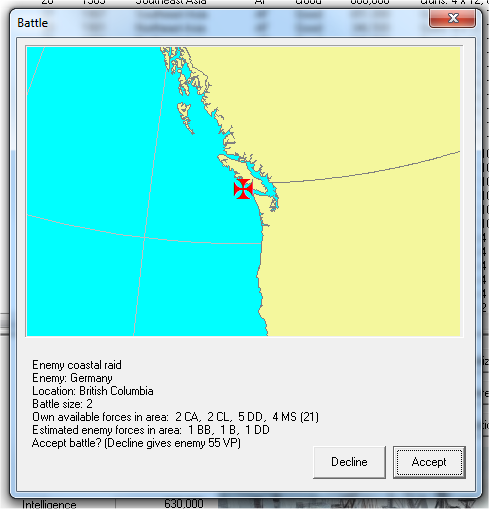
On patrol in the waters of the Northwest Pacific Coast are the armored cruiser Chinook, the cruisers Seattle and Esquimalt, and the destroyers Whipple, Nelson, and Vernon.
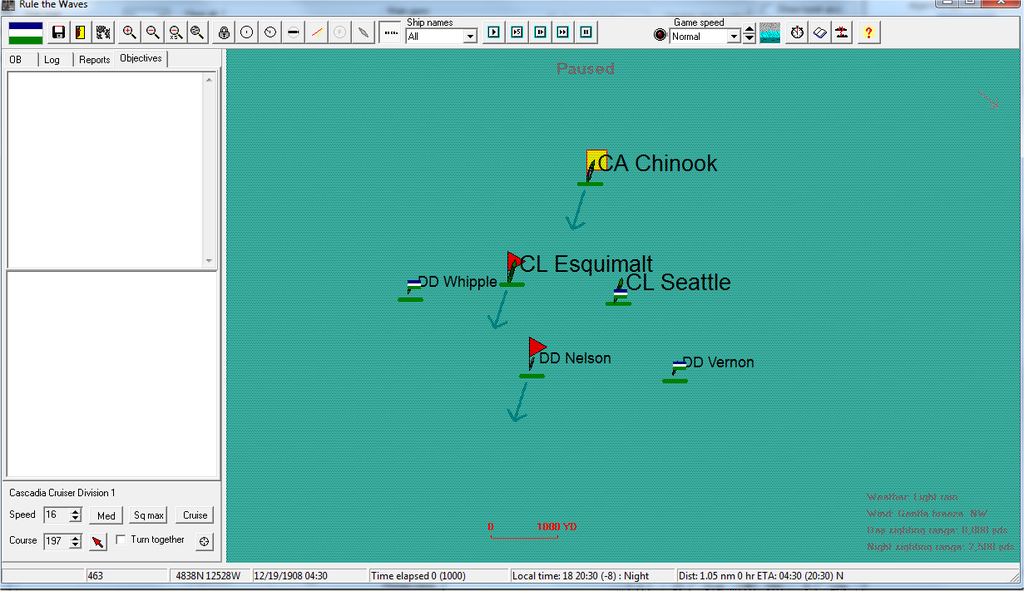
Chinook leads Seattle, Esquimalt, Whipple, Nelson, Vernon
The night is the usual rainy one for December, and the ships continue their patrol pattern off of Victoria Island and a naval munitions depot within range of heavy guns.
During the patrol, the Seattle loses contact with the other cruisers and strays north.
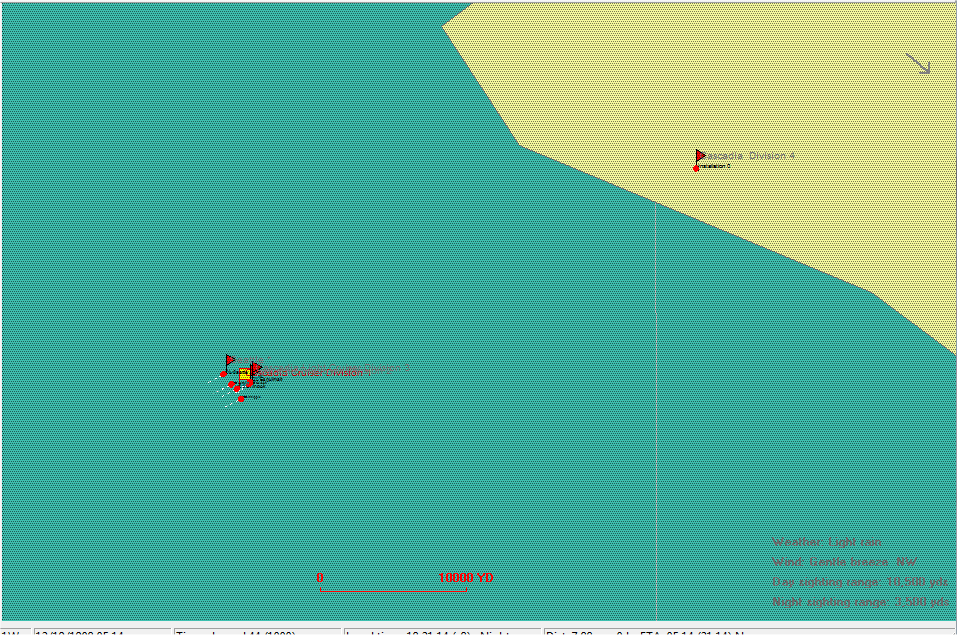
After a night of no contacts, an enemy ship briefly appears in the pre-dawn night. It turns northwest and disappears into the darkness.
Within ten minutes it is spotted again, as is a second vessel. Chinook takes a hit to her coal bunker that limits damage.
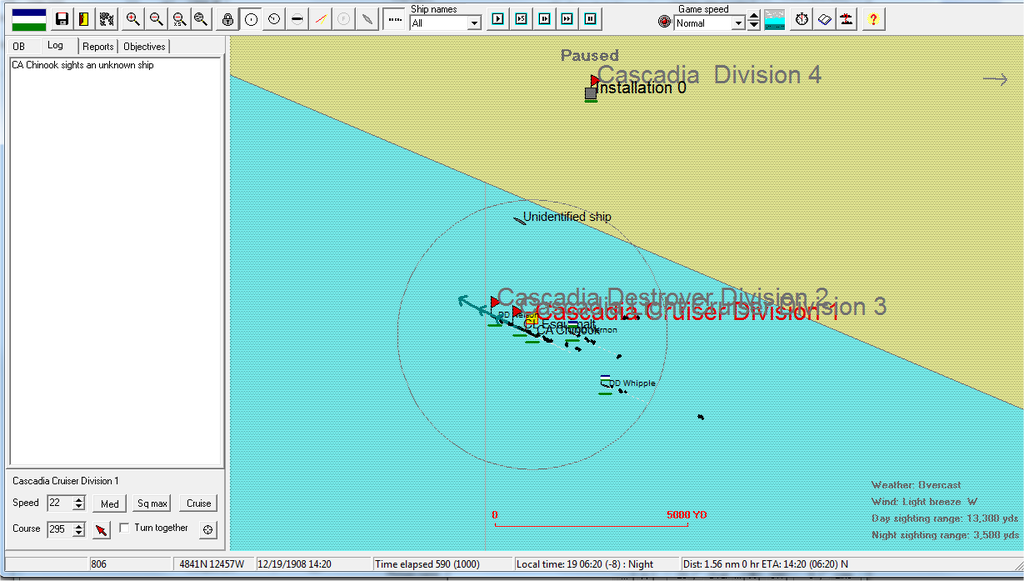
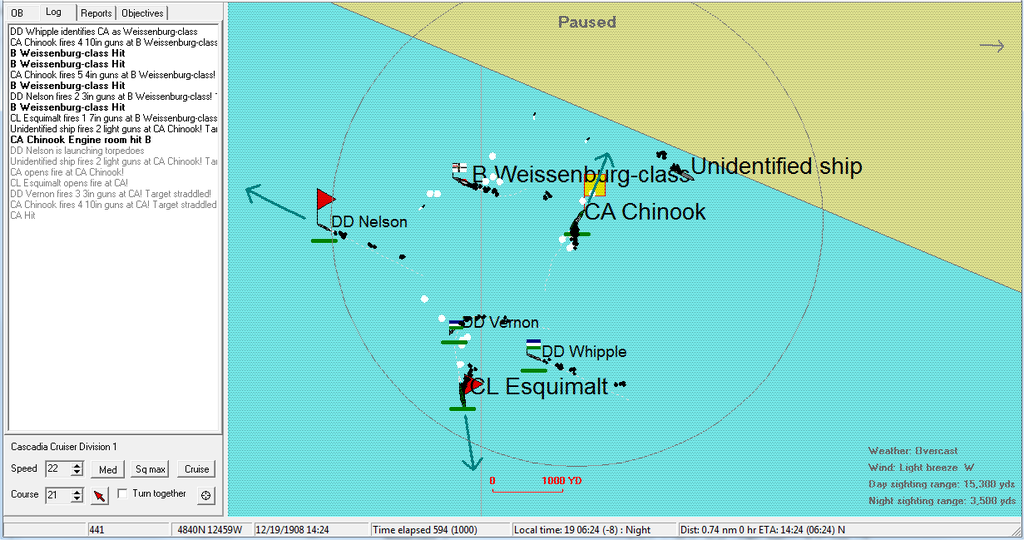
After realizing they're facing a battleship, the Cascadian ships swarm it, attempting torpedo runs while shelling it repeatedly. The enemy fleet returns fire and badly damages the Nelson, which has to make for Esquimalt with severe damage.
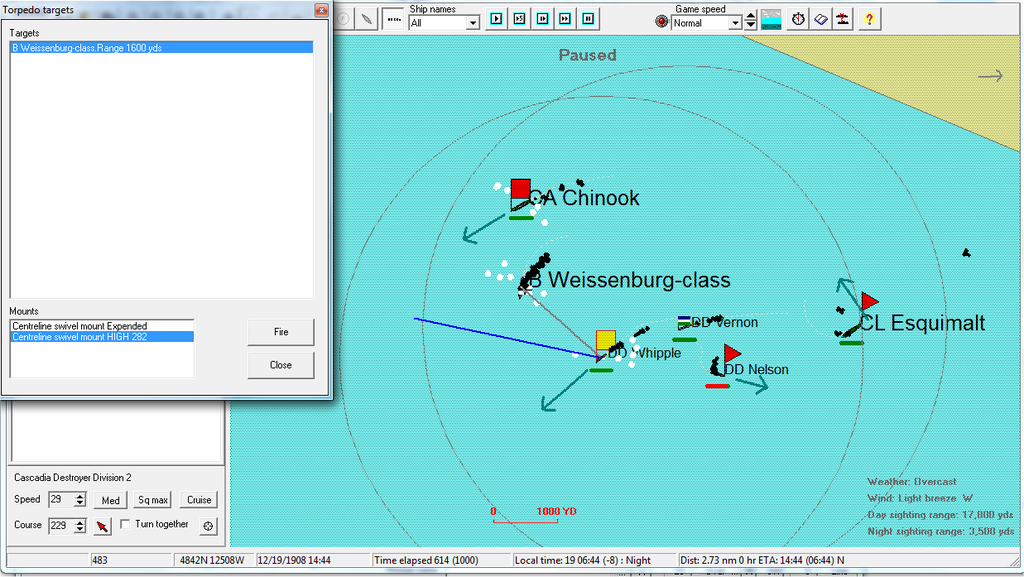
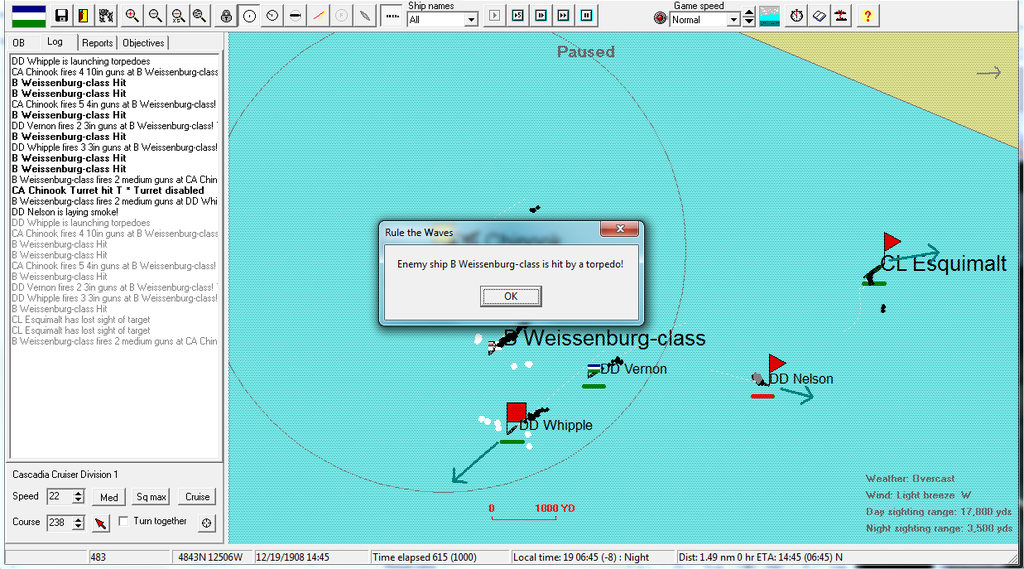
For the next hour the remaining ships lob torpedoes and shells at the beleaguered German ship. Her guns begin to go silent as she takes increasing damage. Finally at 0745 the Esquimalt puts a torpedo into her, crippling her permanently.
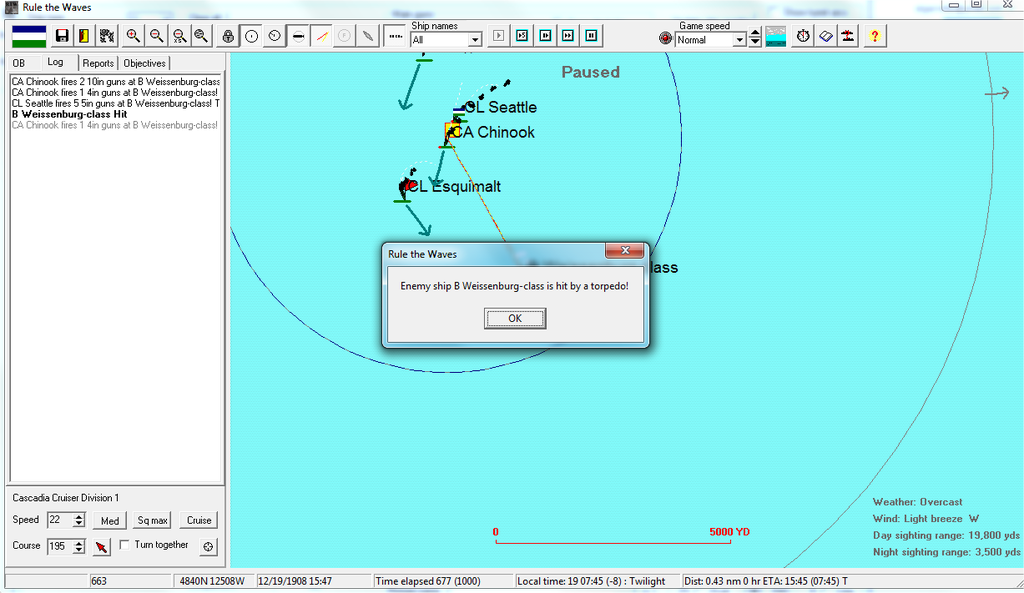
Another half an hour of intense shelling by the Cascadian ships finishes Weissenburg off. The Seattle returns in time to pick up the survivors with the Vernon.
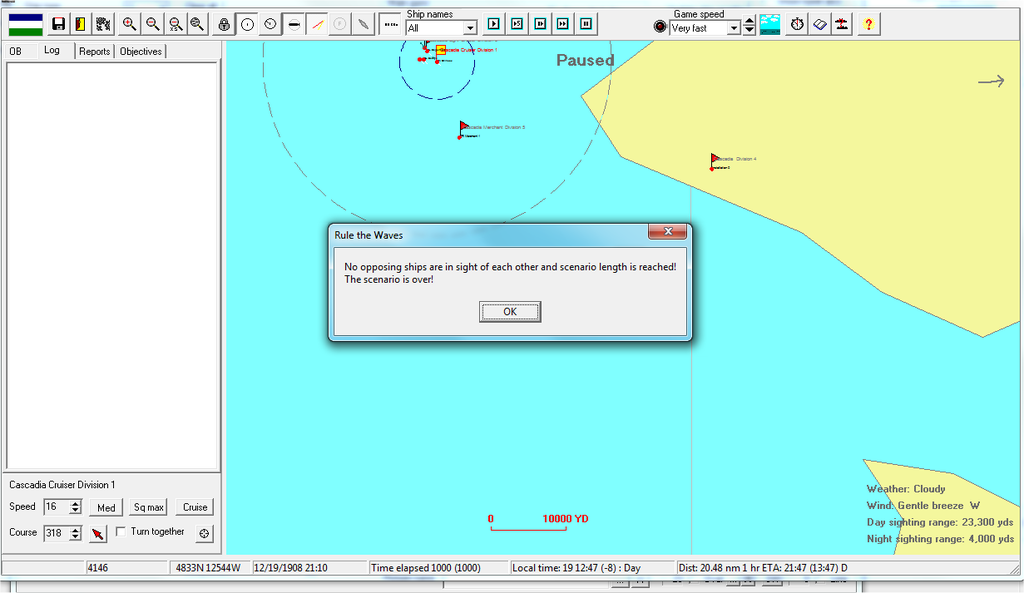
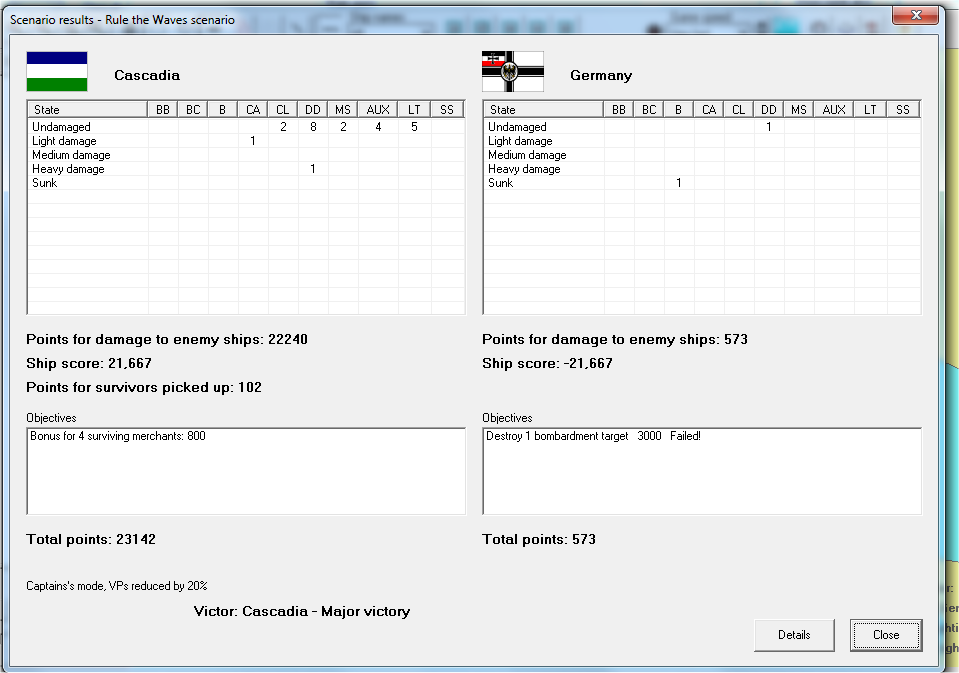
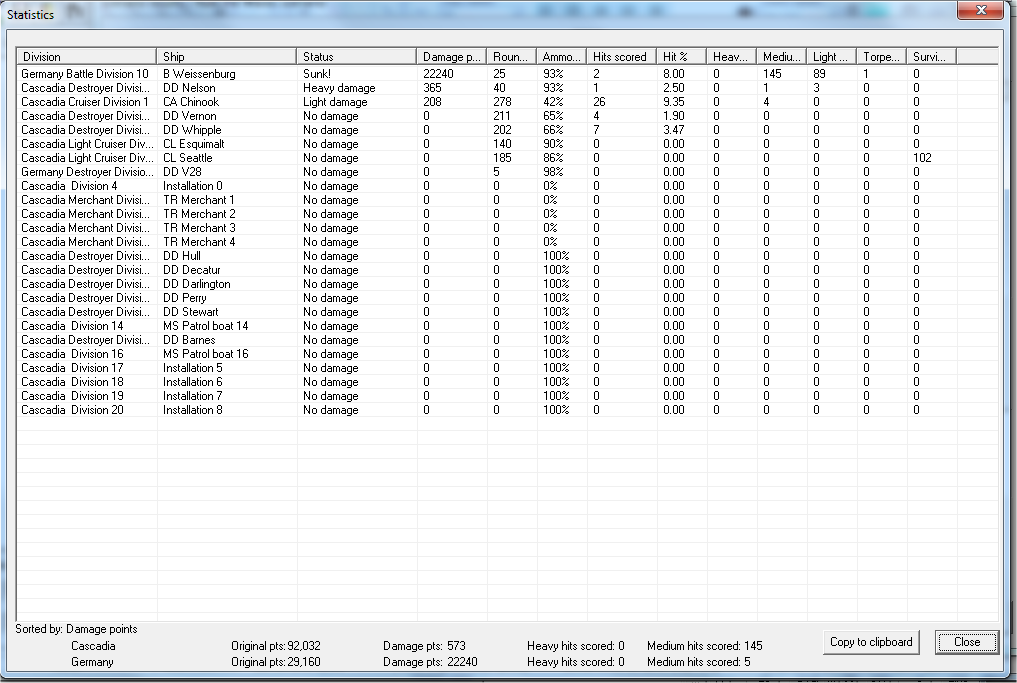
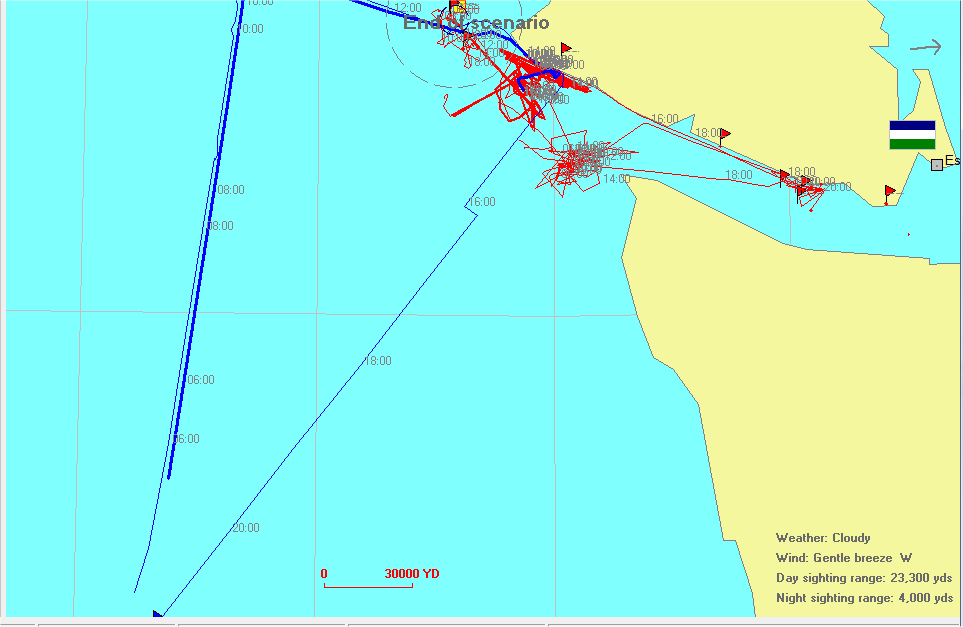
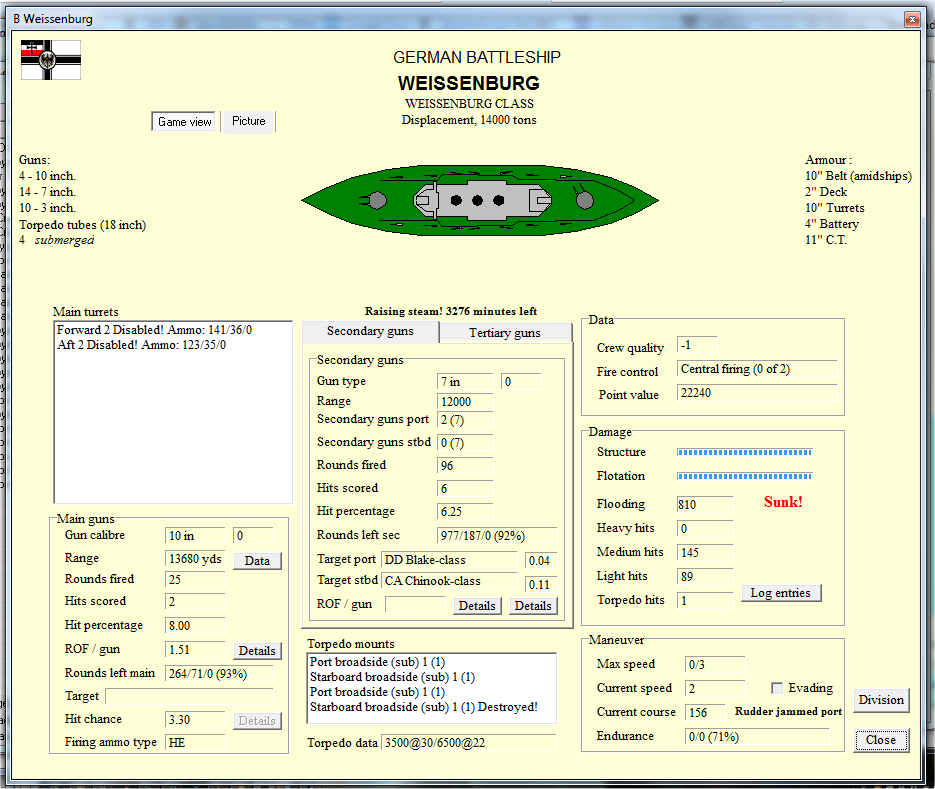

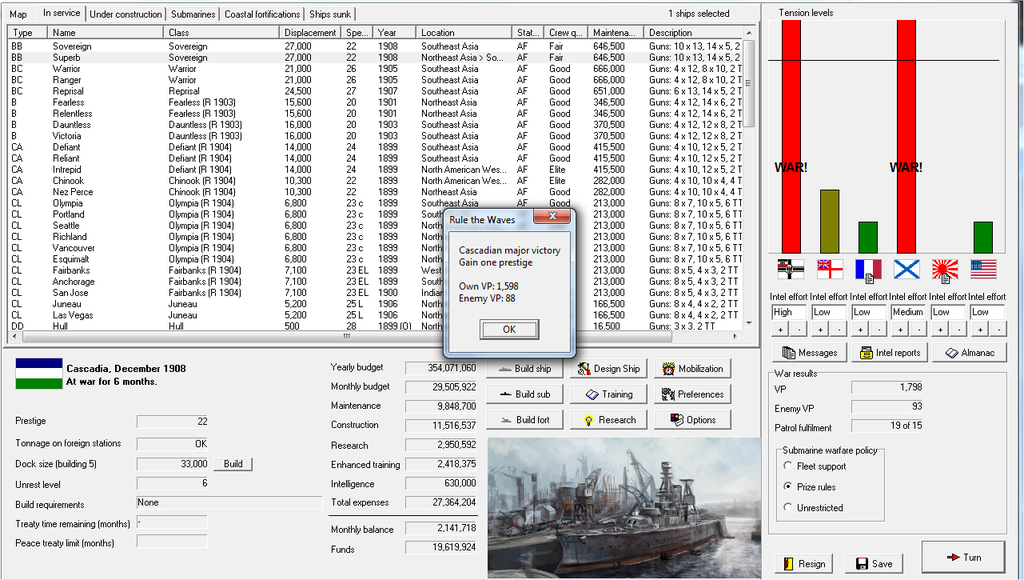
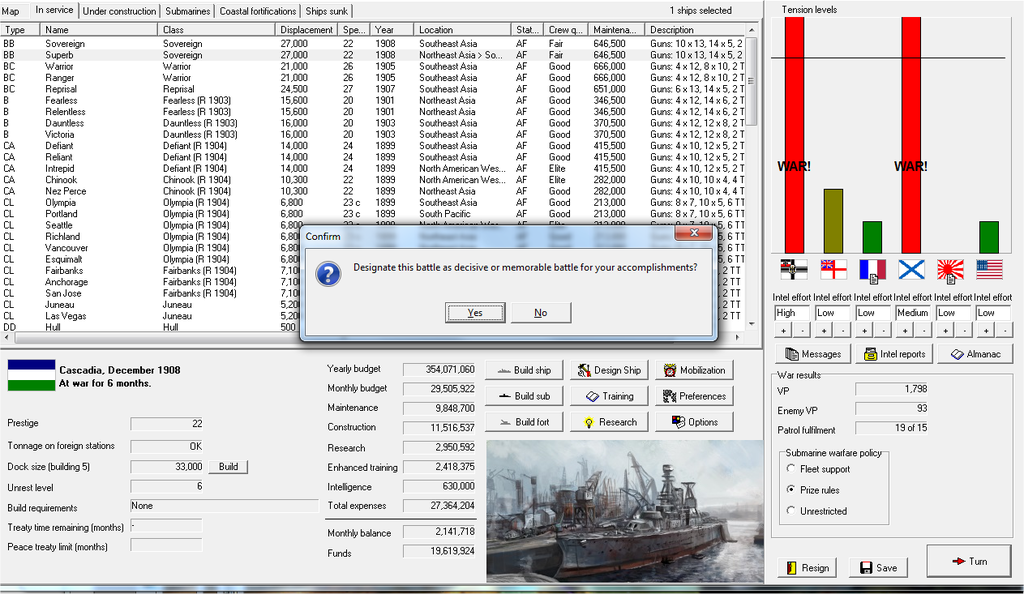
War measures also increase the work done on the Shark, moving that coastal submersible's launch up by a month. The ongoing steel shortage forces a month's loss of work on the Reynolds.
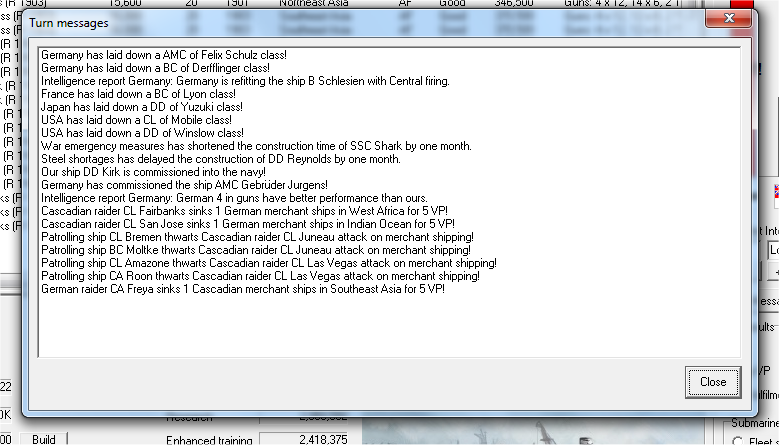
Toward the end of the year, Admiral Garrett approves a second Constitution-class ship. It is named the Liberty. The accelerated construction of the Constitution is scaled back to help fund the new ship.

The Fairbanks and San Jose sunk three German ships in African waters.
The German raider Gefion ran low on fuel due to her pursuits and had to put into port, where she was interned.

The German Pacific Squadron attempted a full sortie against the Cascadian ships at Chuuk. The Germans hoped that the spread out Cascadian forces would allow them to defeat the Cascadian fleet in detail.

But as they approached, German scouts identified the ships in the lagoon. And the fact that among them was the Sovereign. As the German fleet had nothing to equal the world's most powerful battleship yet, the Germans decided to withdraw.

The election defeat did nothing to slow Flagg down. He continued to assert himself and the Socialist Party nationally, provoking strikes and labor unrest while demanding higher wages. National steel production declined from a major strike at several Seattle-area steel mills. Combined with the ongoing labor unrest at Moran Brothers, this delayed the destroyer Adama.
Other war measures were effective in improving production. Increased shift times allowed Mare Island Naval Yard to shorten construction on the Viper.

Puget Sound
29 November 1908
Captain Wallace stood in the open, wet air and felt the light winter drizzle patter on his cover and his uniform greatcoat. Beside him Commander Walter Pentworth was standing, having joined him on the deck for this occasion.
In front of them the forward main turrets of the Superb were at rest. Uniformed sailors were standing on and around the mighty 13" gun emplacements, as they were across the deck. They all looked out upon the coast of the Olympic Peninsula in silence as it moved by at a brisk 16 knots.
Around them, ferries and coastal traffic made sure to stay clear. The Superb was given the run of the Sound as she departed for her station at Chuuk with the Battle Fleet.
"Good lads," Captain Wallace said. He still had a slight Scots brogue to his voice, even after decades away from his family's ancestral homeland. "It's always right to be somber when sailing from home. Especially on a task like ours. We just have to make sure their spirit is up for the battles to come, Commander."
"Yes, Captain," Pentworth agreed.
"The Germans and the Russians. Our natural foes if you ask me. Repressive lot they are." Captain Wallace held up his binoculars and spied Mt. Olympus, on the like-named peninsula, in the distance. It was only barely visible through the gray skies of the new winter. "My regards to Commander Stirling, the engines are running smooth."
"I'll let him know, sir."
"Nervous, Pentworth?"
"A little. I would rather my son know his father when he grew up, sir."
"Ah. Yes." Wallace nodded. "A good reason to be nervous, Commander. Just remember that it's one thing to be nervous, another to lose nerve. We'll need that nerve if we're to come home with our ship again."
"Agreed."
He said nothing more as they approached Port Townsend. The Strait of Juan de Fuca was ahead, and from there they would be out on the Pacific. Hawai'i and Chuuk awaited.
So did the war.
December 1908
The Kirk was commissioned.
Design and doctrine arguments delay the development of anti-submersible Q-ships.

The Fairbanks and San Jose reported more success. The German armored cruiser Freya also scored a Cascadian ship in Southeast Asia. The Russian armored cruiser Bayan never got a chance, though. She ran low on fuel pursuing possible targets and ended up in internment.

A naval engagement between the French and German fleets sees the destroyer G-37 badly damaged.

Japan carried out a desultory bombardment of Sakhalin, rattling Russian confidence

Cascadian ships sailing near Kamchatka en route to station off China detect a Russian fleet near Kronotsky Point. The Russians refuse to give battle.


Meanwhile, the Germans attempt a daring raid on Victoria Island to force Cascadia to redeploy some of their heavy units back to home waters. The predreadnought Weissenburg and a destroyer are assigned to the task.

On patrol in the waters of the Northwest Pacific Coast are the armored cruiser Chinook, the cruisers Seattle and Esquimalt, and the destroyers Whipple, Nelson, and Vernon.

Chinook leads Seattle, Esquimalt, Whipple, Nelson, Vernon
The night is the usual rainy one for December, and the ships continue their patrol pattern off of Victoria Island and a naval munitions depot within range of heavy guns.
During the patrol, the Seattle loses contact with the other cruisers and strays north.

After a night of no contacts, an enemy ship briefly appears in the pre-dawn night. It turns northwest and disappears into the darkness.
Within ten minutes it is spotted again, as is a second vessel. Chinook takes a hit to her coal bunker that limits damage.


After realizing they're facing a battleship, the Cascadian ships swarm it, attempting torpedo runs while shelling it repeatedly. The enemy fleet returns fire and badly damages the Nelson, which has to make for Esquimalt with severe damage.


For the next hour the remaining ships lob torpedoes and shells at the beleaguered German ship. Her guns begin to go silent as she takes increasing damage. Finally at 0745 the Esquimalt puts a torpedo into her, crippling her permanently.

Another half an hour of intense shelling by the Cascadian ships finishes Weissenburg off. The Seattle returns in time to pick up the survivors with the Vernon.








War measures also increase the work done on the Shark, moving that coastal submersible's launch up by a month. The ongoing steel shortage forces a month's loss of work on the Reynolds.

Toward the end of the year, Admiral Garrett approves a second Constitution-class ship. It is named the Liberty. The accelerated construction of the Constitution is scaled back to help fund the new ship.
”A Radical is a man with both feet planted firmly in the air.” – Franklin Delano Roosevelt
"No folly is more costly than the folly of intolerant idealism." - Sir Winston L. S. Churchill, Princips Britannia
American Conservatism is about the exercise of personal responsibility without state interference in the lives of the citizenry..... unless, of course, it involves using the bludgeon of state power to suppress things Conservatives do not like.
DONALD J. TRUMP IS A SEDITIOUS TRAITOR AND MUST BE IMPEACHED
"No folly is more costly than the folly of intolerant idealism." - Sir Winston L. S. Churchill, Princips Britannia
American Conservatism is about the exercise of personal responsibility without state interference in the lives of the citizenry..... unless, of course, it involves using the bludgeon of state power to suppress things Conservatives do not like.
DONALD J. TRUMP IS A SEDITIOUS TRAITOR AND MUST BE IMPEACHED
- Eternal_Freedom
- Castellan
- Posts: 10413
- Joined: 2010-03-09 02:16pm
- Location: CIC, Battlestar Temeraire
Re: Let's Play "Rule The Waves" w/ Steve's Custom Country "Cascadia"
Sweet, time to get into the war.
Incidentally, since you've given me a slight Scots accent, you might want me/him to bring up the clan motto at some point: Pro Libertate/For Freedom. Seems to fit Cascadia
Incidentally, since you've given me a slight Scots accent, you might want me/him to bring up the clan motto at some point: Pro Libertate/For Freedom. Seems to fit Cascadia
Baltar: "I don't want to miss a moment of the last Battlestar's destruction!"
Centurion: "Sir, I really think you should look at the other Battlestar."
Baltar: "What are you babbling about other...it's impossible!"
Centurion: "No. It is a Battlestar."
Corrax Entry 7:17: So you walk eternally through the shadow realms, standing against evil where all others falter. May your thirst for retribution never quench, may the blood on your sword never dry, and may we never need you again.
Centurion: "Sir, I really think you should look at the other Battlestar."
Baltar: "What are you babbling about other...it's impossible!"
Centurion: "No. It is a Battlestar."
Corrax Entry 7:17: So you walk eternally through the shadow realms, standing against evil where all others falter. May your thirst for retribution never quench, may the blood on your sword never dry, and may we never need you again.
Re: Let's Play "Rule The Waves" w/ Steve's Custom Country "Cascadia"
January 1909
The destroyer Reynolds was commissioned.
The beginning of the year brought with it news of demonstrations and social disturbances striking several Russian cities.
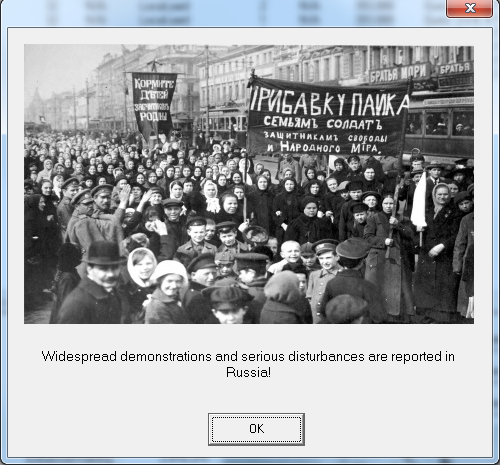
Tsar Nicholas was beginning to repent of allowing himself to be talked into the war. So far it had only seen setbacks. The Japanese Army had won the opening battles in Northern Korea and Manchuria. The Germans were calling for extra forces in Alsace-Lorraine to prepare for a large-scale offensive when Russia needed as many troops as it could send to Manchuria. Now the protests and disturbances shook his prior confidence that Russia was ready for the war.
Under his instructions, the Russian Embassy in the United States approached the Cascadians with a status quo antebellum peace agreement.
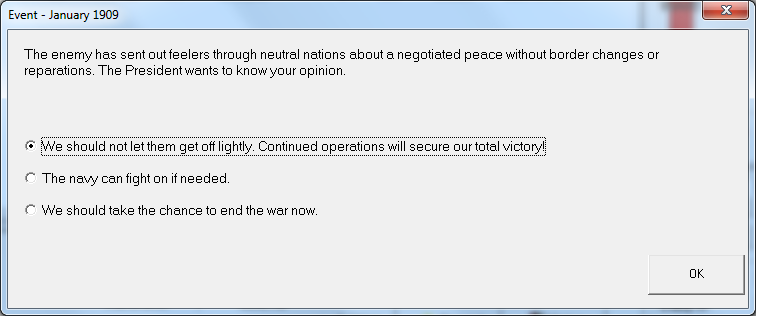
The response in Portland was mixed. The growing influence of Flagg and other peace supporters threatened the toppling of the Government one day, should they lose their parliamentary majorities. But the country was winning the war on the sea. Admiral Garrett proposed that it was too early to make peace, not without undermining the nation's confidence. With his recommendation at hand, the Hawks countered the Russian proposal with one requiring Germany withdraw from the Marianas Islands and cede Lorraine back to France.
The Cascadian counter-offer was a waste. None of the other powers wanted peace yet. Japan had its sights set on Manchuria. Cascadia wanted Tsingtao and possibly other German or Russian possessions in the Pacific. France was eager to reclaim Alsace-Lorraine. Germany was also quite devoted to the war now, believing it the best chance they had to put France down for another generation and then claim Samoa by overwhelming the Cascadians and Japanese in the Pacific.
In the end, Tsar Nicholas II's peace offer was meaningless by any pragmatic purpose.
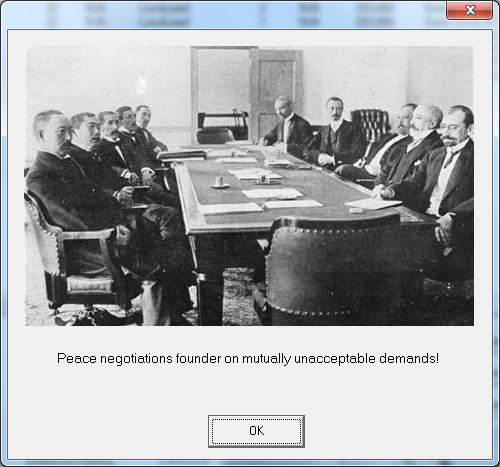
During the month, raiding had mostly petered out. The German cruiser Hertha continued to prowl off the Cascadian coast, avoiding the Cascadian cruisers tasked to her destruction. She could only manage one ship sent to the bottom in all of the month.
Fairbanks did the same. Still operating out of the French ports along Africa's western coasts, the raiding cruiser spotted and sunk a Russian merchantman before she could get to a neutral port.
The French fleet bombarded the Tanganyikan coast, to some moderate effect.
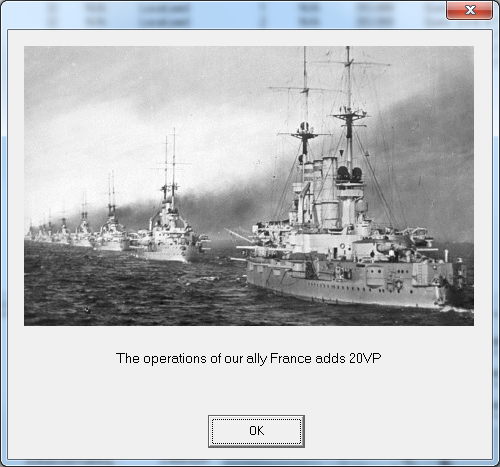
Meanwhile there was a one-sided naval combat in Korea Bay.
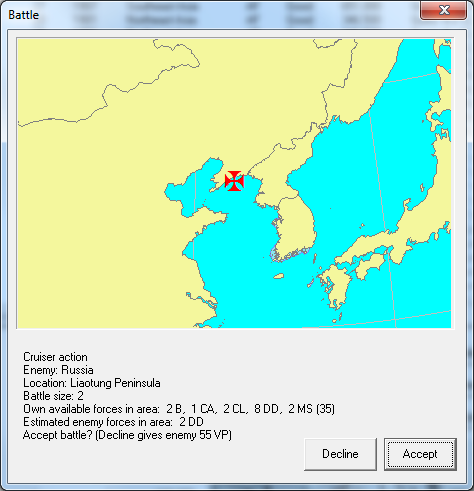
Cascadian cruisers supporting the siege of Tsingtao sortied into the northern part of the Yellow Sea, near the Liaotung Peninsula. The Nez Perce, Vancouver, and Richland led four destroyers in the sortie.
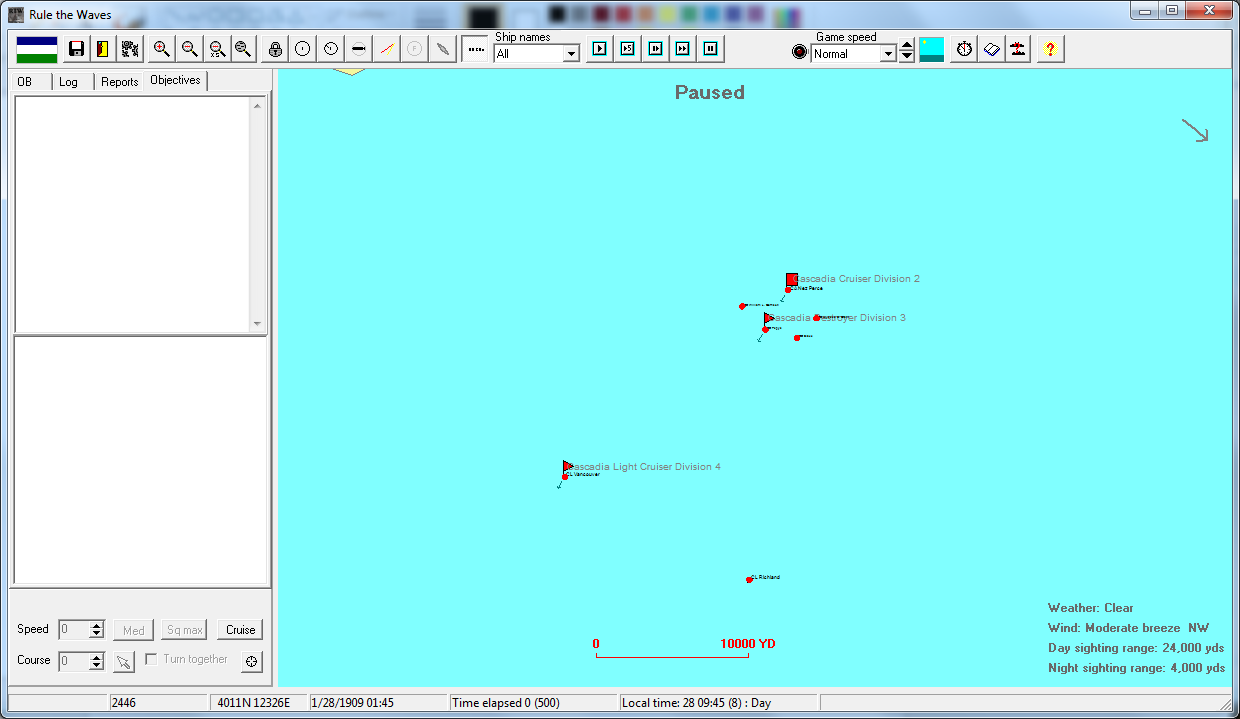
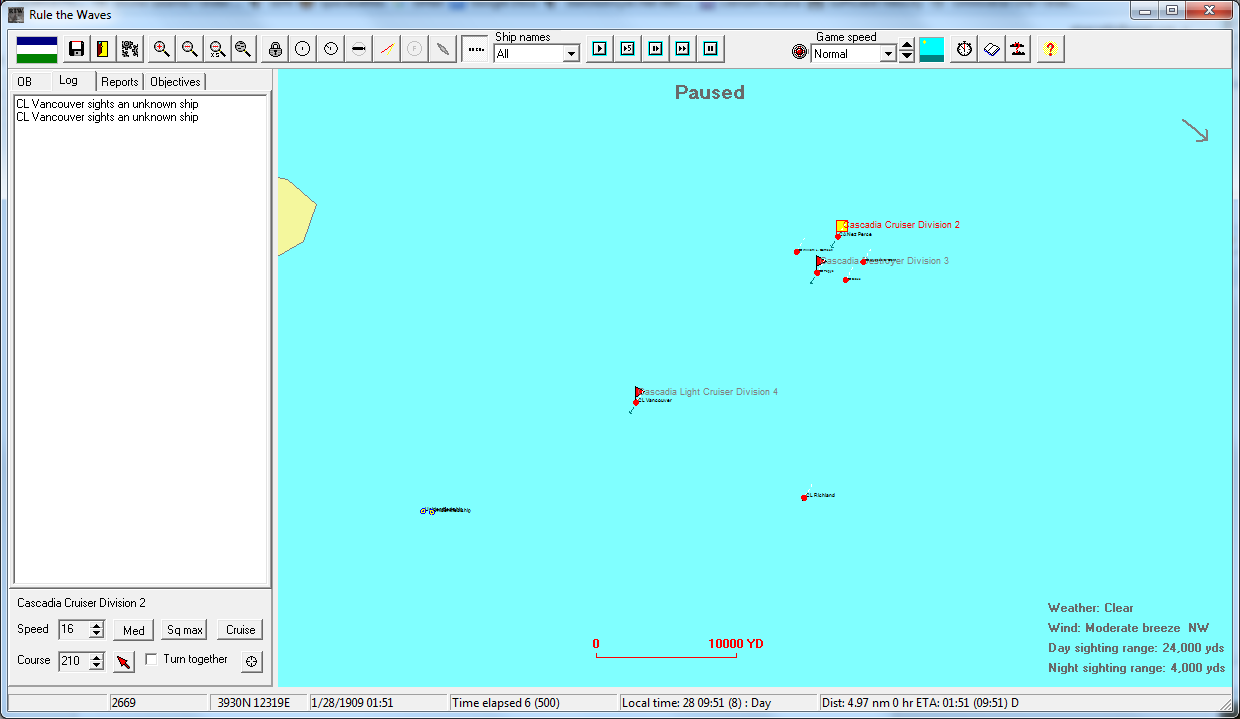
They caught two Russian destroyers patrolling out of Port Arthur and sank them both after about eighty minutes of maneuvering and firing. This success was followed up by sweeping the coastline and picking off two Russian merchant ships. With the clean sweep completed, the Nez Perce and her force returned to their siege positions.
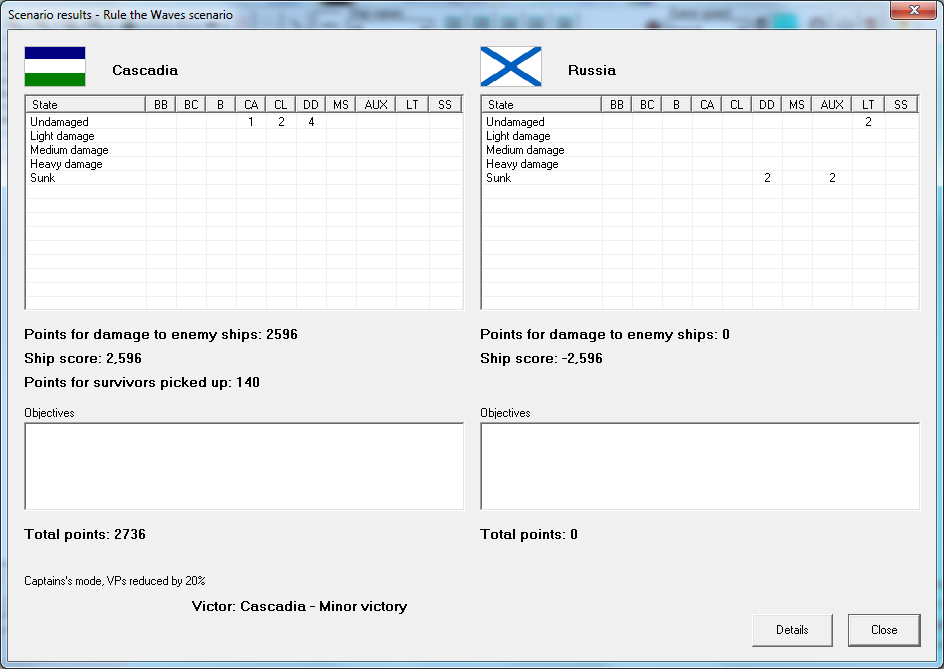
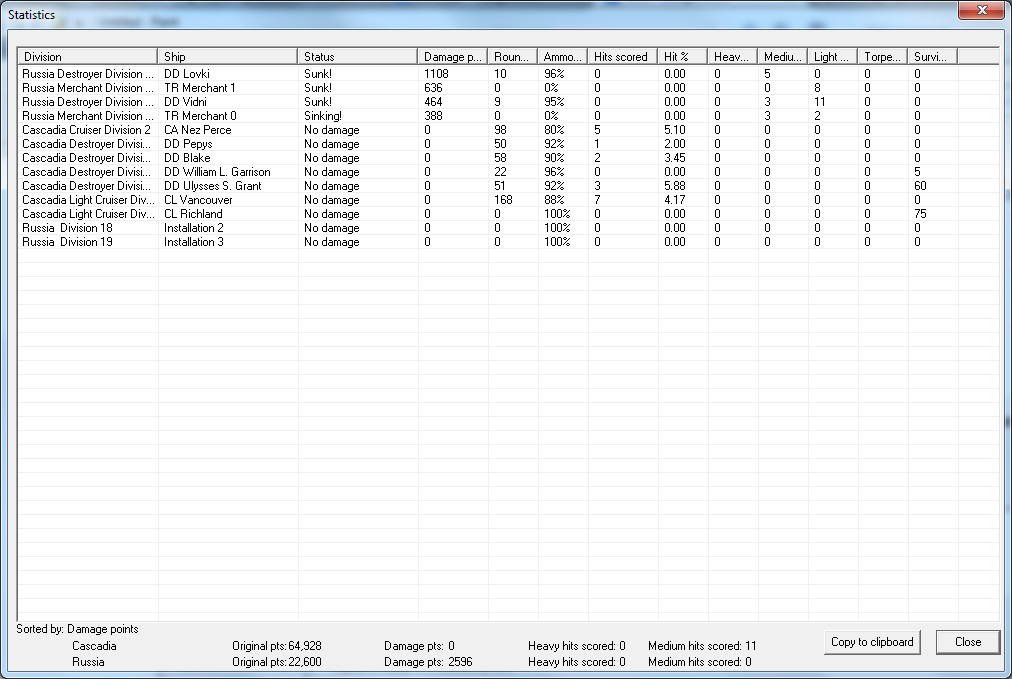
To better support efforts against the large German fleet amassing in Rabaul and Guam, the Navy ordered expansions to the naval facilities at Chuuk, Palau, and Yap.

The Admiralty
Portland, Federal District
28 January 1909
"What is it, precisely, that I am looking at?", Admiral Garrett asked his new Chief of Naval Design and Procurement, Vice Admiral Arnold Davies.
The tall Albertan man had placed a technical drawing of what looked to be a big metal box with slight curves on the ends and a large caterpillar track on the bottom. "A landship of some sort," Davies answered. "A fellow I know back in Calgary proposed it a year or so ago."
"What fellow?"
"An American immigrant from Kansas working as a draftsman for a farm equipment company, Johnson Brothers," Davies clarified. "Tom Barnes is the name. Anyway, he passed it on to me when I was last home checking up on my parents' farm. With a war looming he thought it might work against enemy trenches and defenses."
"Hrm. The armored steel hull might work, I suppose. You could pass this on to… who's that fellow now in charge at the Army Quartermaster?"
"General Knox."
"Ah. Knox, yes. Send it on to him, with my blessing. Anything to help our friends in the Army deal with German trenches once they get to France."
February 1909
With Cascadian and Japanese support, the rebellions on Saipan and Tinian continued to reduce the German garrisons and tie down German forces in the Pacific. The leader of the rebelling forces, Don Pedro de la Vega, urged the two powers to invade as soon as possible. While his rebels were holding their own for the moment, they lacked the manpower to wage even an attritional war. The revolt needed immediate reinforcement if it was to survive.
But whether it could get such reinforcement was up to debate. The Japanese fleet was remaining concentrated in the Sea of Japan and Yellow Sea, supporting Japan's Manchurian aspirations. Cascadia also had a substantial force in place to support the forthcoming invasion of Kiautschou. The Cascadian naval forces in the Philippines and Carolines were only powerful enough to thwart any German moves against Cascadian holdings or Japanese Formosa, not to support an invasion of the islands.
And so, for de la Vega and his people, the rebellion against Germany became a question of how long they could hold out.
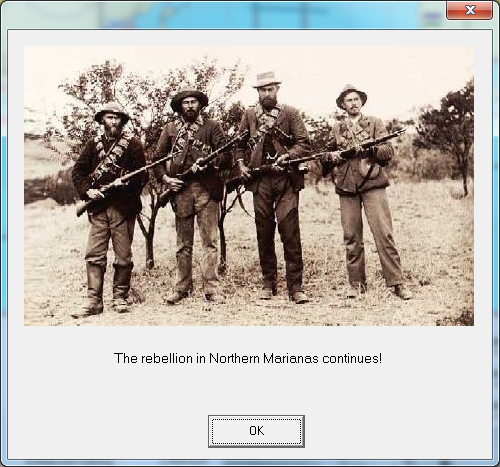
The situation in Russia remained explosive. Increased protests and demonstrations rocked the great cities of Russia throghout the month while the price of bread increased.
More disturbances in Russia
The Carter and Adama commissioned.
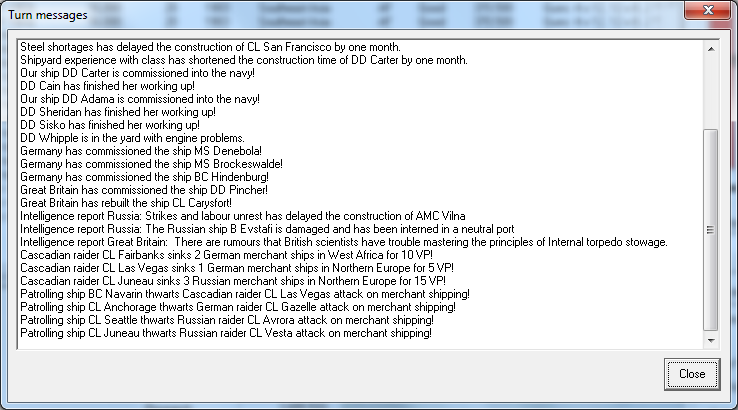
The Executive Mansion
Portland, Federal District
8 February 1909
President Matthews and Secretary of State Lakeland were overseeing the day's meeting of the War Cabinet. The strategy elements of the meeting had led to Admiral Garrett's summoning, as it had with the Army Chief of Staff, General Patrick Landers.
They were now pouring over a map of France and Germany's common border. Markings were placed to show where the Cascadian Expeditionary Army, now 400,000 strong, were awaiting orders with the French to commence an offensive.
It was the nature of that effort now being discussed. "The Army is in need of more funds to furnish the gear and arms our boys need in Europe," Landers explained. He kept his eyes on Garrett before saying, "I think we would best be served if the Army were granted more of the war budget that was set aside for the Navy."
It didn't surprise Garrett in the slightest to hear that. "My ships are what keep our communications with France open," the Admiral pointed out. "I can't afford to have much taken from me."
Landers frowned at that. "Admiral, with all due respect, your ships can't win a land war. And if the French are forced out of the war by German armies, your ships will be outnumbered when the Germans send their fleet to the Pacific. My boys need that support."
The Admiral considered that. He thought of his own efforts, the budgets he was spending to assist with them… and finally nodded. "I understand. I could make do with some diversion of funds from the Navy, so long as the Army makes sure to make good use of them."
"Our boys will, sir, I can guarantee that," Landers insisted.
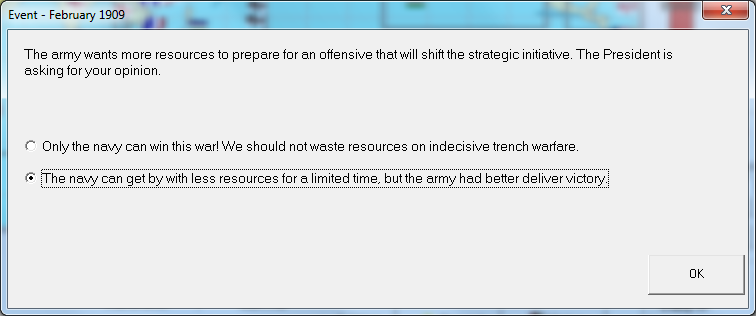
West Portland, Oregon
12 February 1909
Admiral Garrett stepped out of the horseless cab with his umbrella up and catching the rain pouring down. A late winter rain had turned the weather gloomy… excellent weather for a war, he supposed. For the mood of one anyway.
He entered the home and allowed Josephine to take his umbrella and coat. "They're waiting for you in the parlor, sir," she said. "The miss and the children."
"Really? It's about dinner time, though, I would imagine the dining room…" He said nothing more at that point and went on to the parlor.
Rachel was in a chair. Gabbie, now a rambunctious four year old, was in her lap looking tthrough a childrens' picture book. Sophie, tall and growing into womanhood like a hand fitting into a glove, was in a plain dress and enamored in her own book. Thomas was sitting beside Rachel. He had something in his hand.
The Admiral looked at his younger son. Thomas had a look about him of anticipation and nervousness. And he could see Rachel was frowning. "What did you get, Tom?" He kept an even expression. "A response from Berkeley?"
Thomas wordlessly handed him the paper. He took it and unfolded it.
The heading said it all. "National Service Administration".
A painful twist filled Admiral Garrett's stomach.
Thomas had been drafted.
"I'm to report next week," Thomas explained. "For medical evaluation."
"I see." He found a seat and considered the paper in his hand. "Well, I… I am certainly surprised."
"Can't you stop it?", Rachel asked. "He's going to be accepted to Berkeley. He's too smart to be shanghaied into the Army!"
"It is out of my power, love," he answered in apology. "National Service answers to the War Office, not the Navy."
"But there must be something you can do!", she insisted. "Some way to keep him in university!"
"I have no authority to do anything on this matter, darling," the Admiral sighed. "It's not my department. The Service department will decide whether or not Tom goes to the Army or Navy or anywhere."
"It's… alright, mother," Thomas insisted. "And some of the other boys are talking about enlisting together. They'll let us, I hear. We'll get posted to a battalion being raised in West Portland."
"I'd rather you weren't at all!", Rachel shouted. "You're too brilliant, Tom, to go off and get killed in Europe. You'll serve the nation better as a scholar, not a soldier!"
Rachel was so clearly upset that the Admiral went over to her and set a hand on her shoulder. He had to admit he was reeling himself. Rafael had chosen his service; Thomas was being ordered into the army by the Government. His son was not soldier material. He was a thinker.
But the Republic was at war. And she was calling her sons to the colors. He couldn't stop that.
It was a terrible thing to be confronted with. The idea of Thomas dying on a distant battlefield, far from the cool green hills of the Cascadian heartland or the warm Californian sun he was born under.
It made all of those parents who had tried to slip their sons into Canada and the United States all the more understandable now. That the idea occurred to the Admiral stunned him. It would destroy his career if something like that happened…
"Mom, Pa, it'll be fine," Thomas insisted. "I'll sign up with Mike and Lewis and the others. We'll watch each other's backs." His voice lacked the confidence his words tried to convey. "I mean… there's nothing else I can do anyway. Not unless I leg it for Canada or the US, right? And that would ruin you, Pa. It'd cost you the Admiralty. I'm not going to let you down like that."
"There is the possibility of a deferment," the Admiral said. "If you can show you are going to higher education in a field of national importance."
"You did talk about becoming a doctor," Rachel said hopefully.
"That was just one idea," Thomas reminded his mother. "I really want to study law. I don't think they give deferments for that."
"There is military law," the Admiral pointed out. "The Judge Advocate Generals' Offices in each service. You would have to commit to becoming an officer with a regular commission, of course."
"I know. Well… I'm not sure. I'll see what the examiner says, I suppose."
The Admiral put a hand on his son's shoulder. "Whatever happens, I'm proud of you, Tom. I know you'll do something both smart and right."
"I'll always be proud of you," Rachel added. "I just think this is wrong for you."
This entire time the girls had remained quiet. Gabriela was still little, of course, but Sophie was reading a bit too intently. Admiral Garrett looked to her. "Sophie, are you alright?"
His question went unanswered. He called to her again.
That seemed to prompt a reaction. "I hate it," she said simply, and with some anger.
"Sophie?"
"I hate that Tom is being taken by the war," Sophie declared. "I hate the war and I think it should be stopped. All it does is get people killed."
Which, of course, was not an untrue view on war. He took his daughter by the shoulder, gently, and said, "I know it does. But there are principles in matters, dear. Sometimes peace can be worse than war."
"That doesn't make sense," Sophie protested.
"Not now, it doesn't. But when you've seen more of the world, more of how terrible things can be… you'll understand."
Even as he said those things, a chill went through the Admiral. Rafael would be graduating the Academy in a year. And now his other son was drafted. Both of them would face danger in the war if it continued on much longer.
And, as things stood, it would be going on for quite a while.
Mare Island designers perfected new Diesel engines for submersible craft.
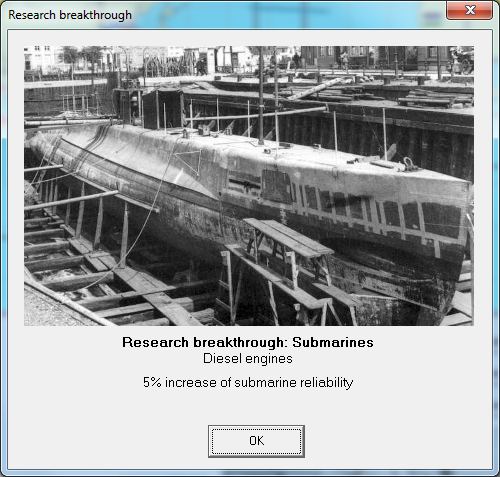
Contact was lost with the Tarpon in Alaskan waters. Reports indicated a Russian gunboat may have caught the ship on the surface and sunk her before she could dive.
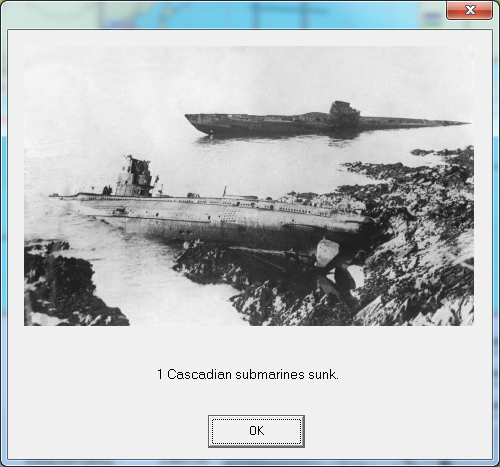
It was a decent month for Cascadian raiders. Fairbanks sank 2 German merchantmen in the waters off Cameroon. Las Vegas claimed another German north of Ireland. The Juneau had the best hunting of all, claiming three Russian merchant ships in the North Sea and off the Norwegian Coast.
The Marine Nationale conducted another attack on German possessions in Africa, causing damage to several shore installations.
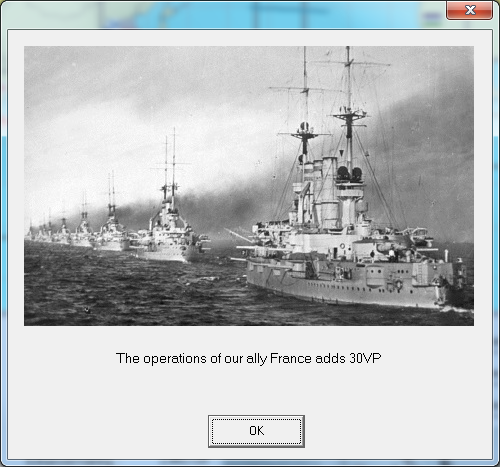
The Cascadian Navy launched a major sortie into the Bismarcks, attempting to bring large elements of the German fleet to battle.
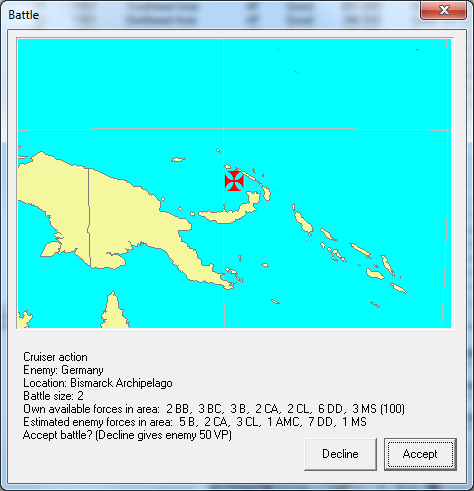
The battlecruiser Reprisal led a formation with the armored cruiser Reliant and the destroyers Bainbridge, Rodriguez, and Abraham Lincoln. They sighted the enemy not long after dawn in the waters between New Ireland and New Britain. The German armored cruiser Prinz Adalbert, a Prinz Heinrich-class ship, led three destroyers north from New Britain.
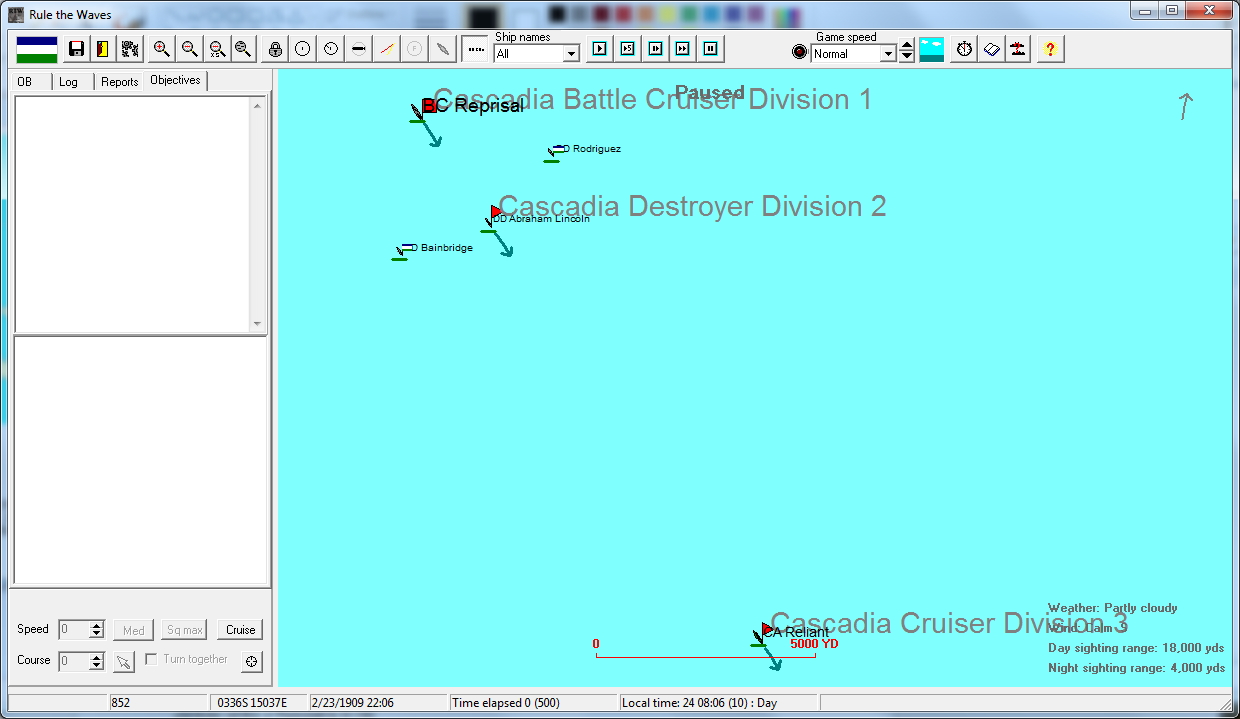
The battle immediately became fierce. The Lincoln lost a turret temporarily to enemy destroyer shelling. Reprisal took repeated hits from the Prinz Adalbert, but the enemy shells couldn't penetrate her superior armor. The Prinz Adalbert soon took several hits of her own from Reprisal and Reliant. By 1000 she was burning and crippled. She started to sink ten minutes later.
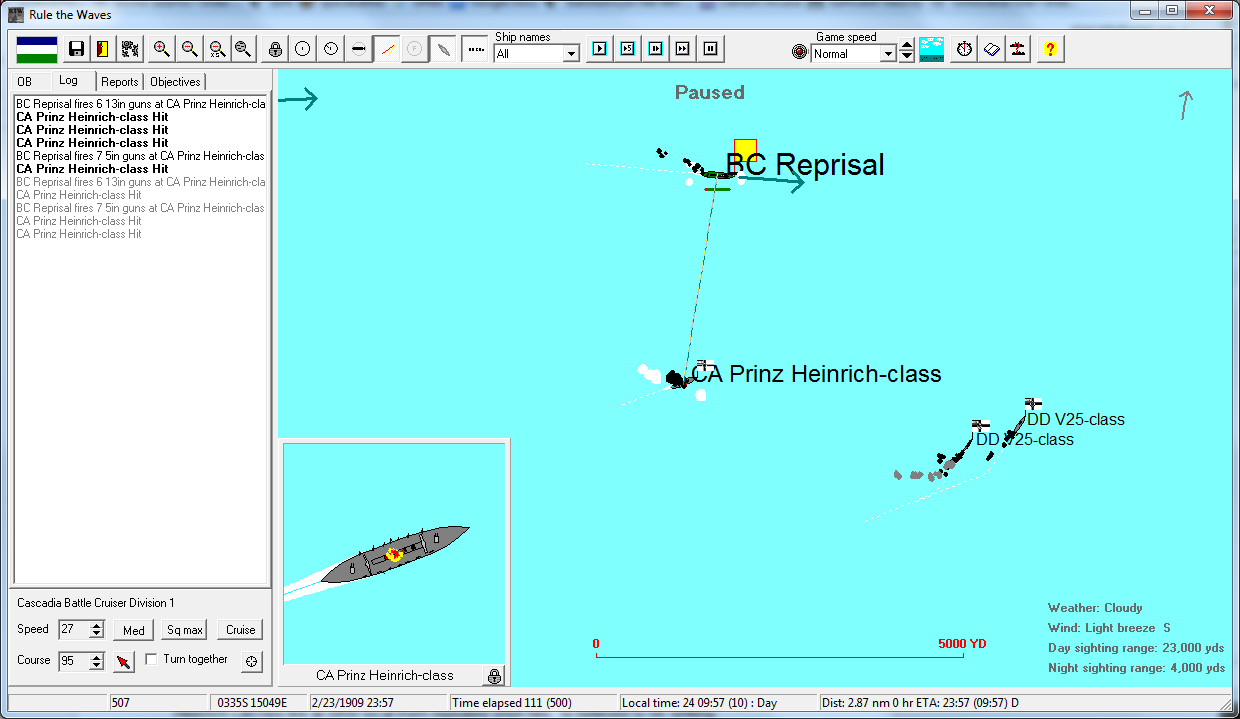
Meanwhile Reprisal caught another contact; an enemy destroyer who had fallen away from the battle with engine damage. Reprisal caught up and sunk her with repeated hits from her casemate and deck guns.
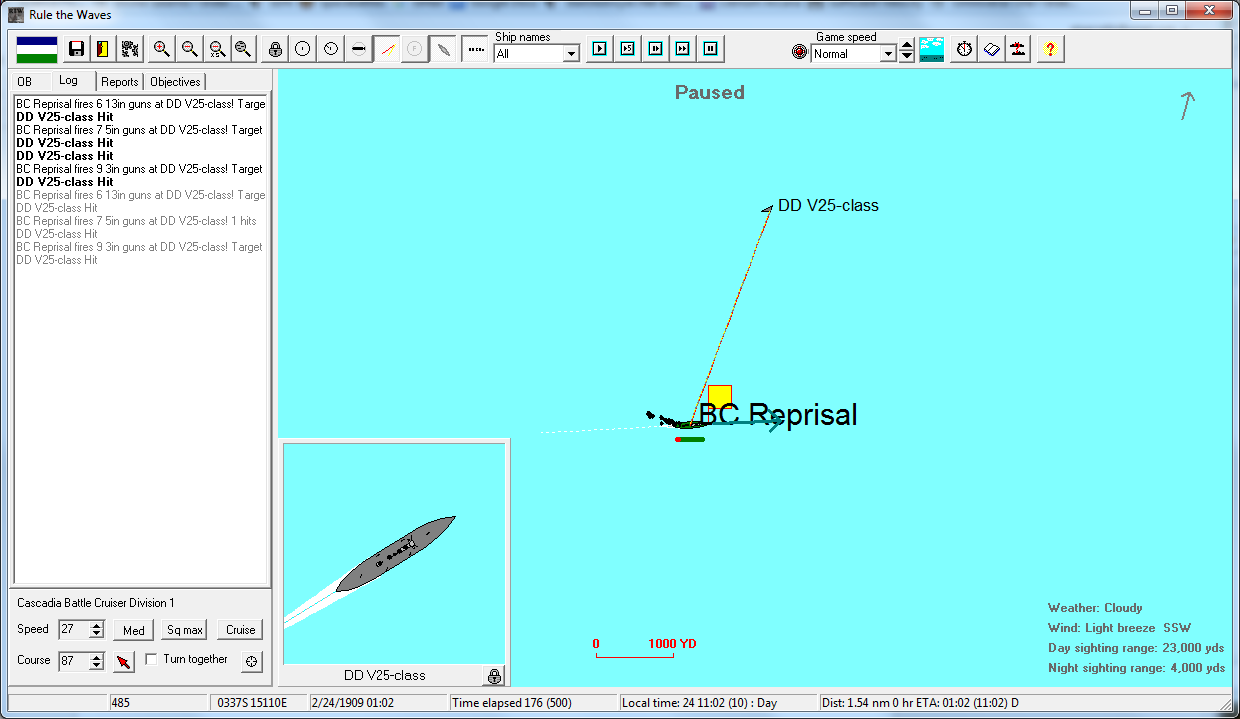
The second of three enemy destroyers was chased to the New Ireland coast and sunk by shellfire from Bainbridge.
The Battle of the Bismarcks was thus a clear and complete Cascadian victory. The German Pacific Fleet grew even more cautious afterward, worried that losing any further ships would ruin Germany's presence in the Pacific.
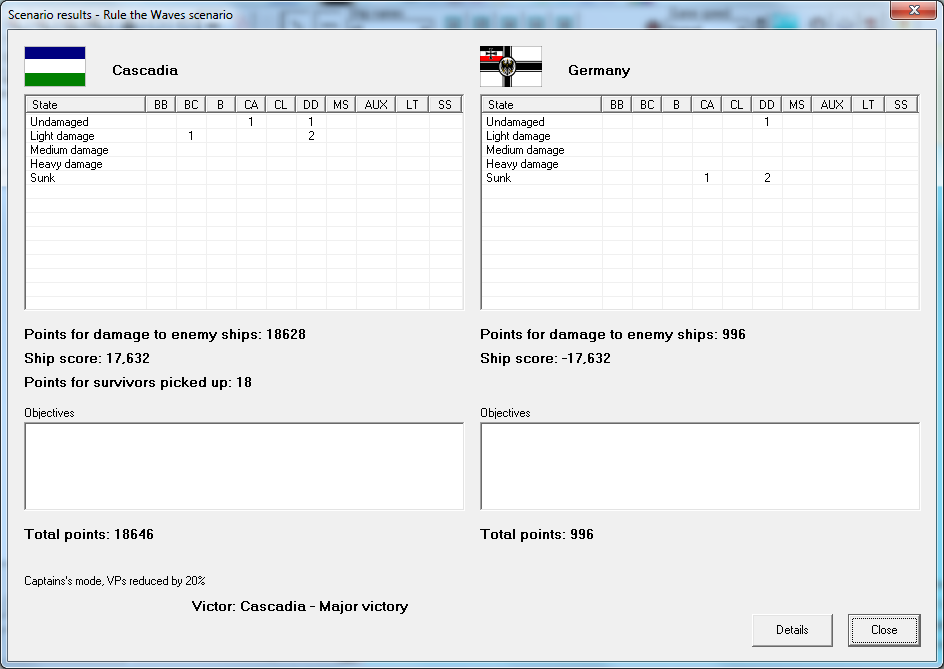
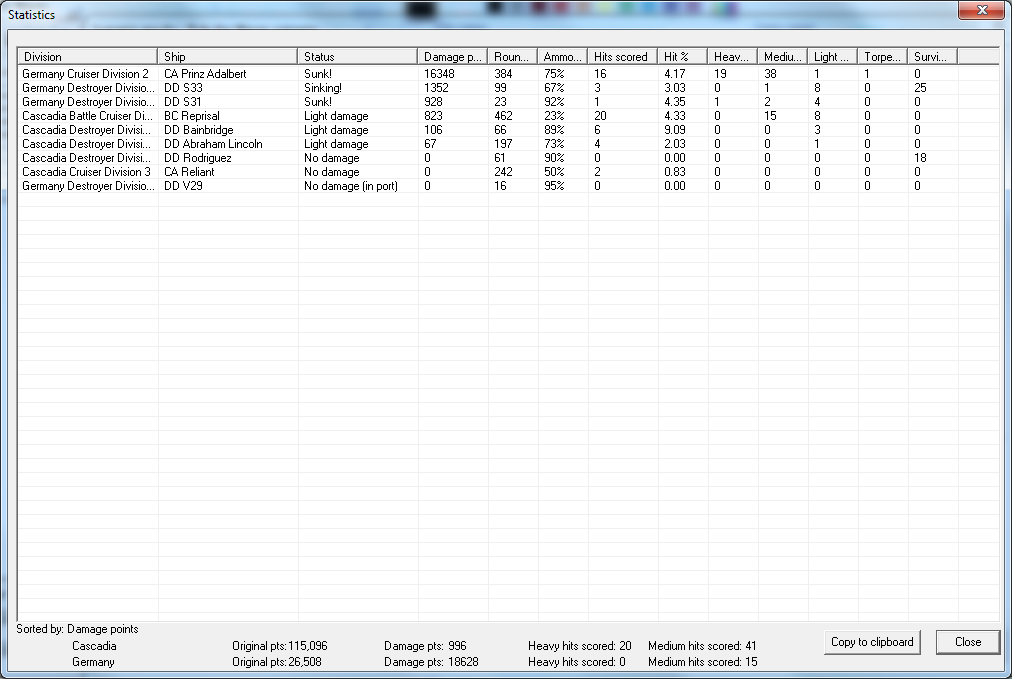
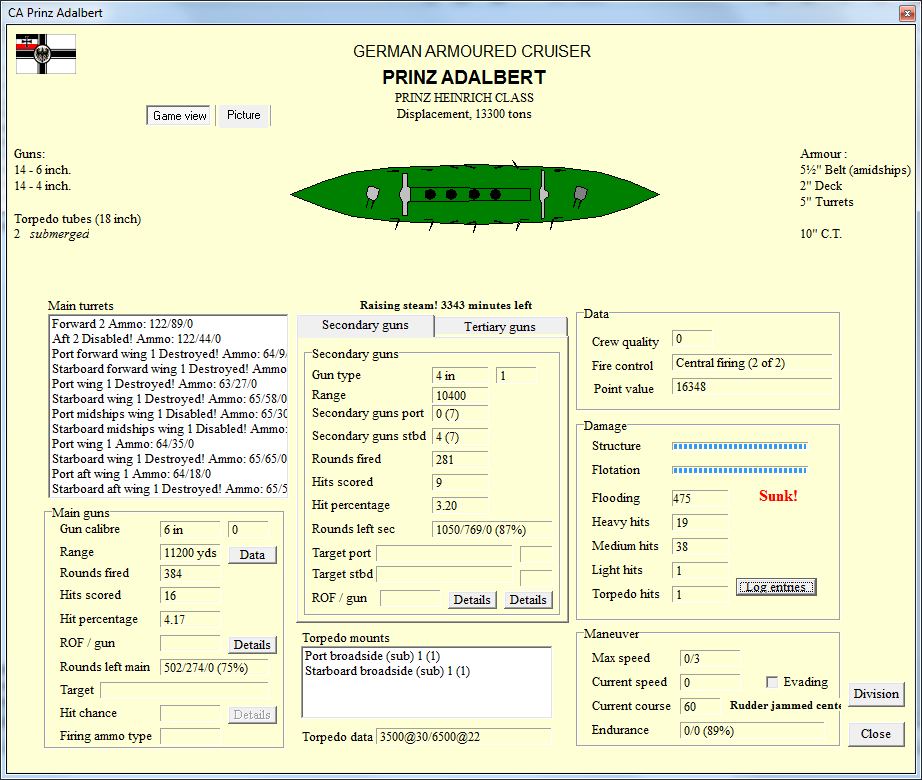
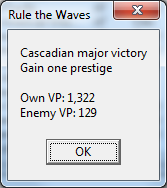
March 1909
The Riker is commissioned.
The Japanese Government approves the dispatch of advisors to Cascadian yards to demonstrate hydraulic riveting techniques, to improve the efficiency of hull designs.
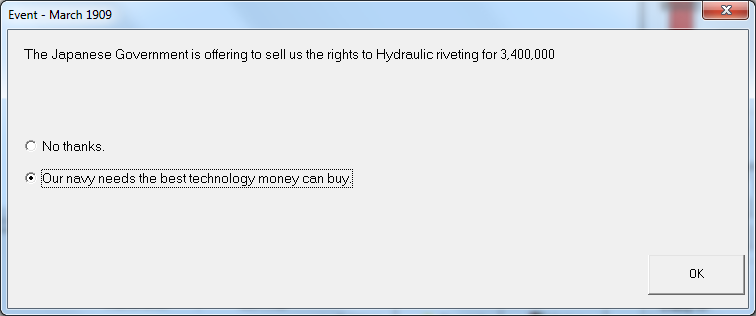
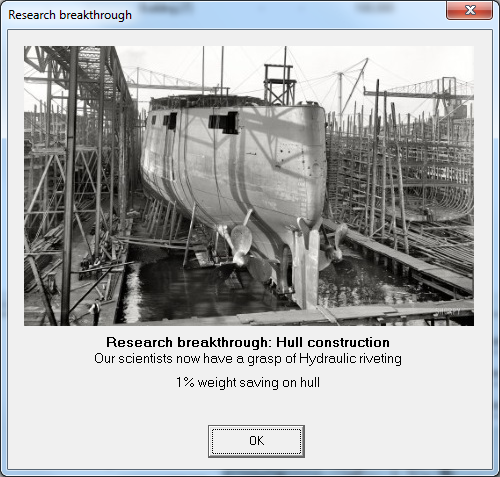
Naval Artillery reported that they had completed work on crafting triple turrets for warships.
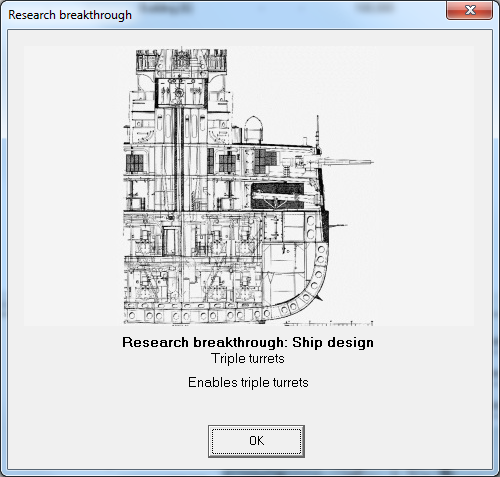
The Hertha arrived in West Africa, where she sank a Cascadian merchant near the Congo.
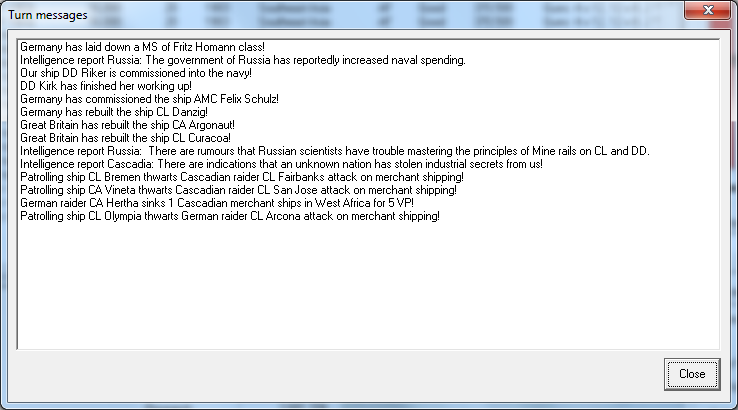
The Japanese dislodged Russian troops from another defensive position near the Yalu river.
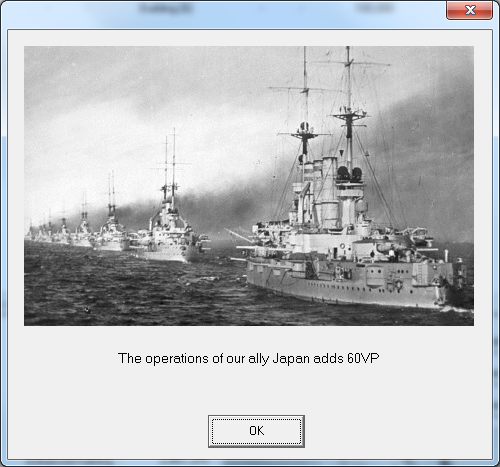
The Russian fleet ignored a challenge toward the Liaotung Peninsula by a Cascadian detachment.
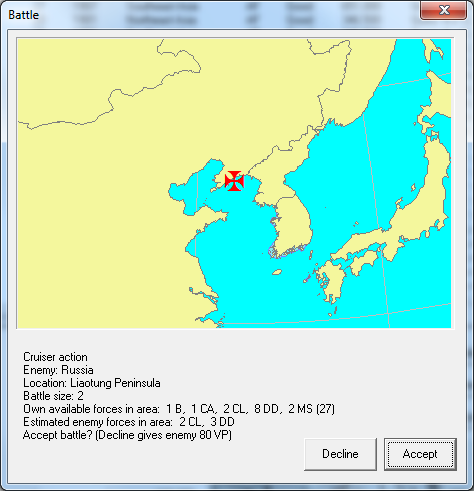
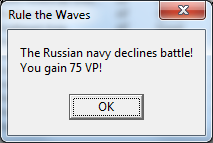
A Russian Griden-class cruiser, the AlmazI, intercepts the San Jose northeast of Ceylon.
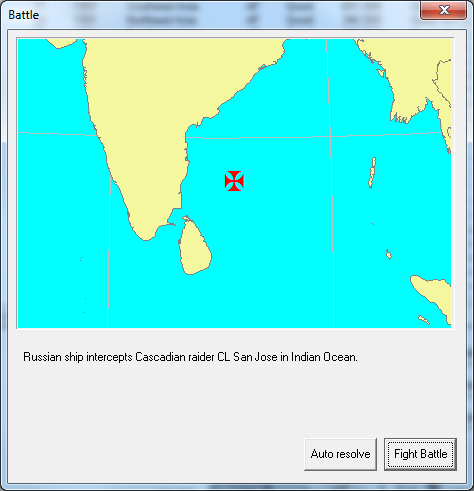
Realizing he is outgunned, the Russian tries to break north. The San Jose pursues and begins a chase of several hours before the shellfire slows the Russian enough that San Jose puts a torpedo into her and finishes the Russian cruiser off.
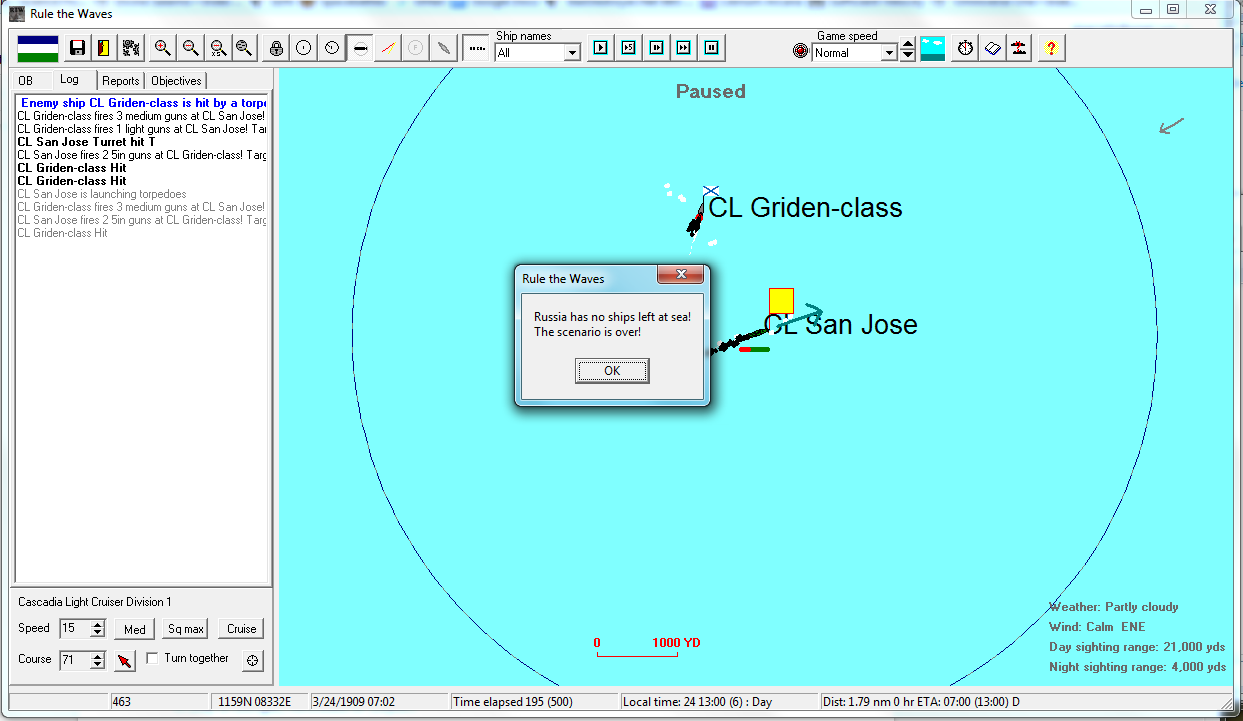
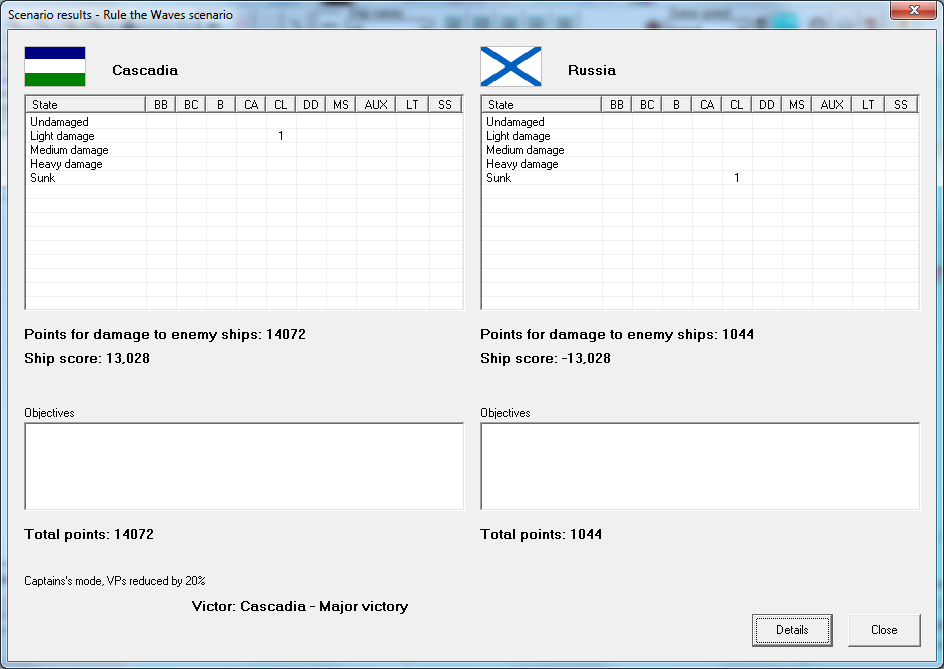
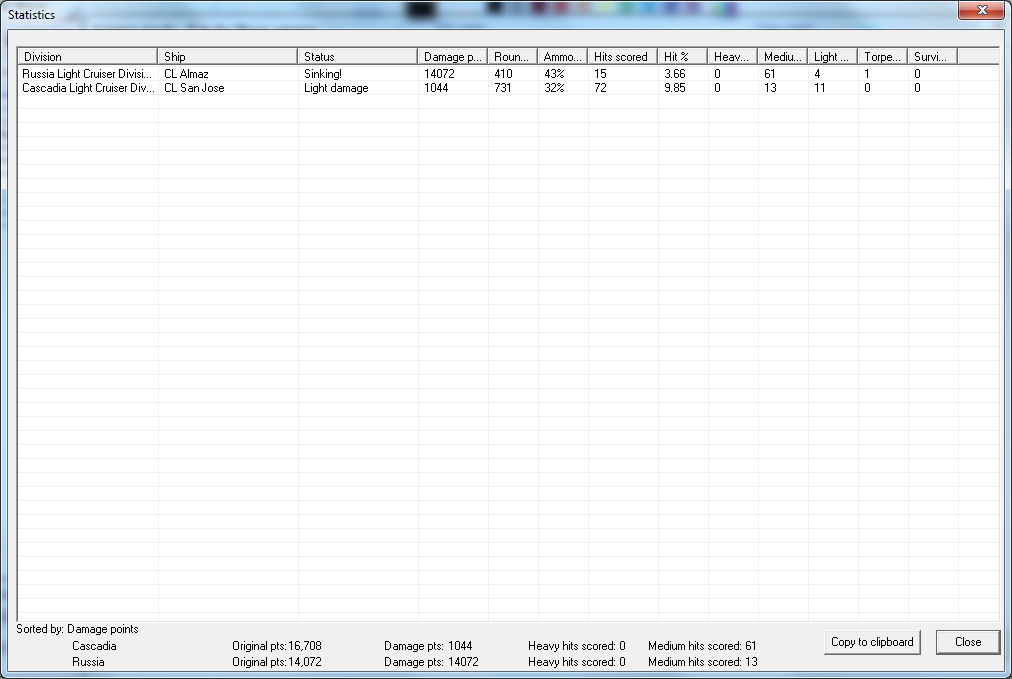
In France, the Cascadian Expeditionary Force reaches a strength of 450,000 combat ready troops, a substantial contribution if still relatively small compared to the number of French and German men under the colors in Europe.
General Roger Parker, commander of the force, confers with the French Army on their employment. The decision is made to place the two forces, organized into the 1st and 2nd Armies and IX Corps as a ready reserve, into the flank of an intended French offensive in April. The French had intelligence of a planned German offensive with the arriving Russian forces and believed a spoiling attack could catch the Russo-German armies by surprise. The Cascadians and the Japanese Expeditionary Force, a two corps-sized army under General Maresuke Nogi, would participate on the flank of the French attack into Lorraine, tasked with securing northern roadways into Lorraine towards Metz.
April 1909
The Cascadian 8th Infantry Division, under Major General Andrew Brewer, continues its campaign to take Tsingtao. In a series of tightly-fought actions the 8th Infantry Division and its attached regiments take several critical positions despite intensive resistance in the heights of the concession zone, tightening the noose around the German-held Chinese city and isolating several German units from their main defenses.
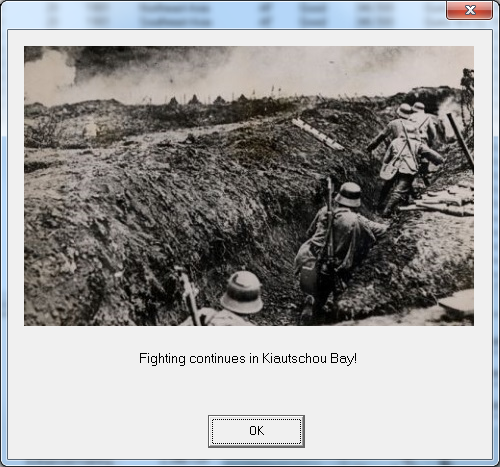
On the 8th of April the weather permitted the launching of the Allied offensive. The Germans were caught by some surprise and lost several forward positions to the Allied armies.
But this success soon rebounded against them. Von Schlieffen ordered a counter-attack. German divisions were thrown into the northern flank against the relatively untried Cascadian and Japanese divisions. Initially the German counter-offensive was blunted in fierce fighting - one action would lead to correspondents dubbing the Cascadian 2nd Guards Regiment worthy of their nickname of "The Iron Wall" - until the Cascadian 4th Division broke under fierce German shelling and attack. The Cascadian positions faltered and General Brewer was compelled to order a withdrawal back to their starting lines. The Germans, looking to turn this into a rout of the Allied armies in France, launched a second attack on the beleaguered Cascadian forces. IX Corps was sent in to recover the situation and prevent the Germans from overrunning the Cascadian units as they retreated to their starting positions.
The French, recognizing the danger to their flanks, fell back from their own gains and attempted a counter-attack on the German flank that was thrown back with heavy losses.
By the end of the month, the Allied armies were back to their starting position, having suffered over two hundred thousand casualties with nothing to show for it. Several Cascadian brigades and regiments were utterly devastated. The Cascadian Expeditionary Force had suffered over 90,000 casualties by the end of the month. The Japanese had suffered proportional losses given their numbers. France had lost well over 100,000. The offensive was a terrible failure and resulted in the sacking of several French commanders as well as the commanders of the two Cascadian Armies and the commander of 4th Division. The German Army was spent for the moment, but with Russian reinforcements arriving the momentum along the border was with them.
In Cascadia, the wires coming from Europe soon turned the hope of a victory into frustration and despair. All of Representative Flagg's predictions seemed to be coming true; the Cascadian Navy had yet to win a truly big success and the Army in France had just suffered a major setback. Cascadian boys were dying by the thousands on French soil for nothing.
Secretary of State Lakeland soon found his Government challenged. A war appropriations bill in the House came under intense attack and soon developed into a real threat of toppling his Cabinet. Lakeland threw his full weight into wrangling the despairing Liberals flirting with the Doves back into line. On its final vote, the bill passed by two extra votes than needed, a narrow victory that prevented Lakeland from being toppled for the moment.
But he needed a victory of some sort soon, or he wouldn't be able to save his Government.
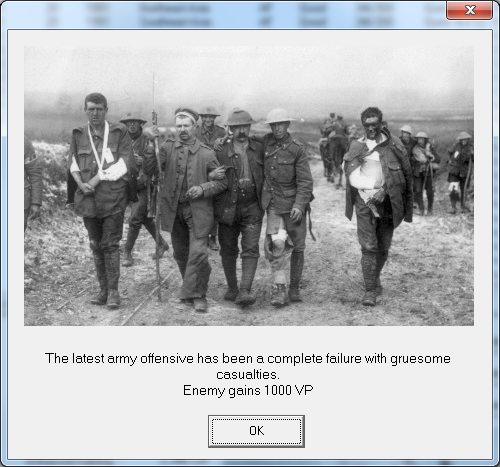
The Jackson and O'Neill are commissioned, finishing the run of Kirk-class destroyers.
The Bremerton is also commissioned before her lead-ship, the San Francisco. During trials, however, it turns out that errors in construction have caused the ship to be slightly overweight.
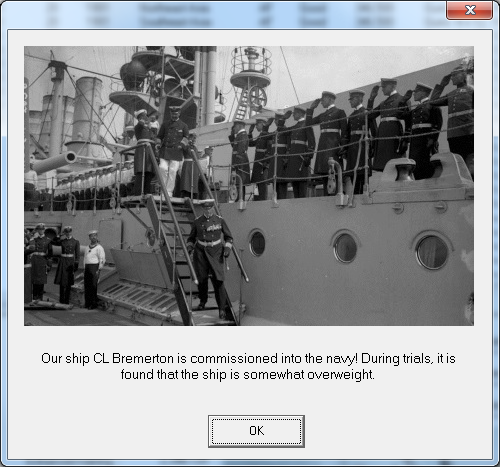
Another good month for the raiders passes. Fairbanks sinks three merchantmen in the waters of West Africa. Juneau got another in the North Sea, and Las Vegas sank two.
Meanwhile the Germans lost one raider, with the Hansa being interned. The Russian cruiser Rossiya sank a Cascadian merchantman in the Mediterranean.
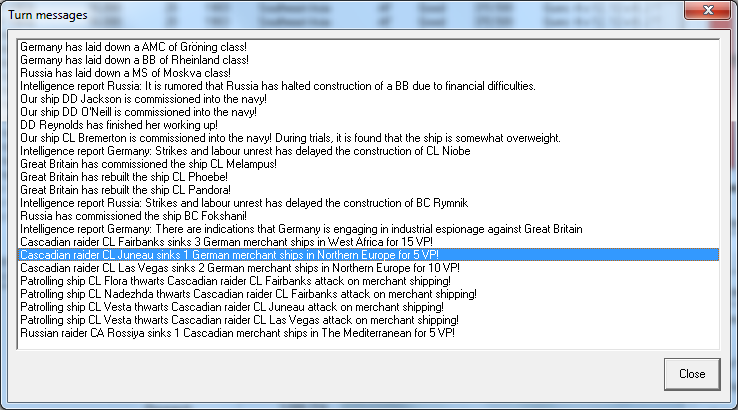

Russian Rossiya sinks 1 Cas in Med
The Nez Perce led a raiding force that intercepted a Russian coastal convoy near Vladivostok, in heavy rain and bad weather. The armored cruiser and her fellows fell upon the enemy rapidly, forced to stay within 1,000 yards due to the bad visibility of the storm conditions.
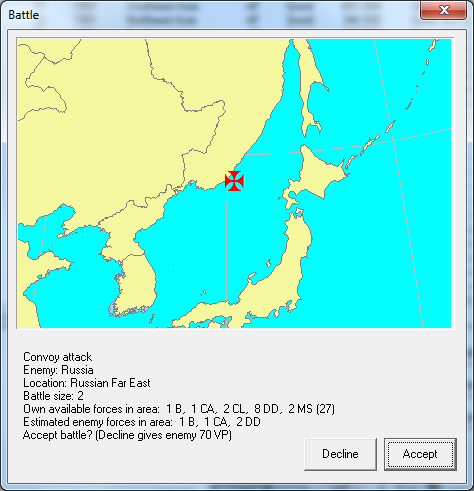
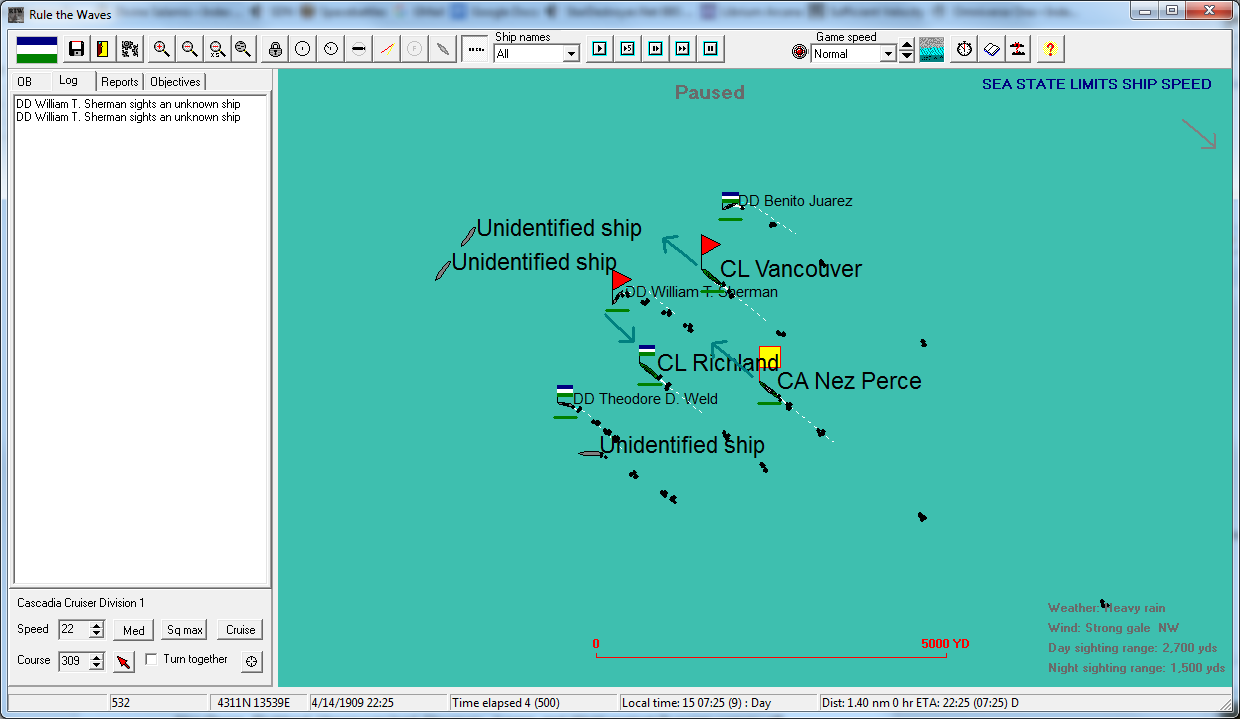
The conditions were so bad that Vancouver accidentally rammed one of the enemy transports due to a mistake in maneuver.

After half an hour two of the enemy merchants were completely sunk. The others had fatal blows and would go down in the storm.
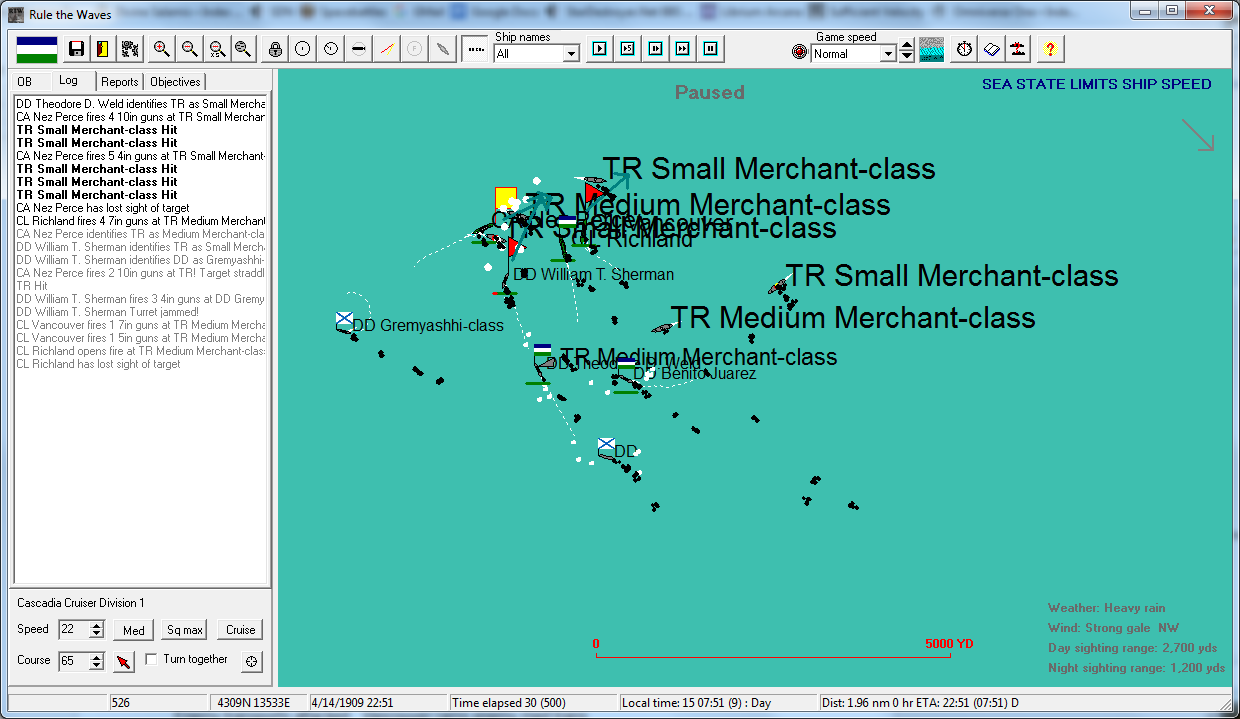
The force attempted to chase the enemy escorts fleeing toward Vladivostok. But wind conditions soon whipped up into a full storm and the Weld took damage. With the mission accomplished, the Cascadian force broke off and returned to port.
Nez Perce, Richland, Vancouver lead Sherman, Juarez, and Weld against Russian convoy off Primorsk Coast - Heavy Rain, contact at 0721 visibility 1.5k yards
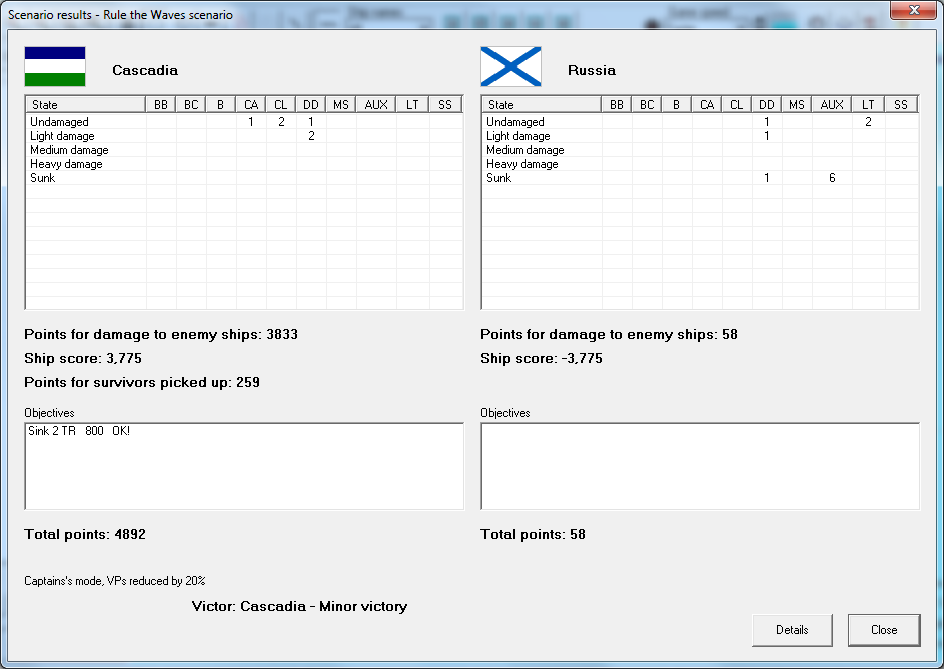
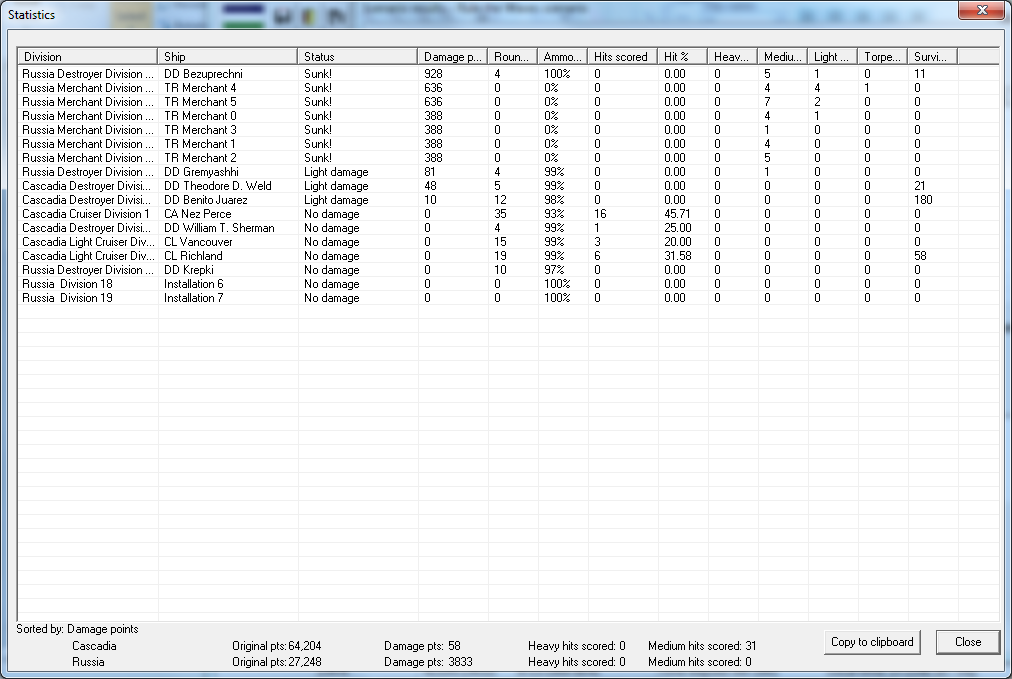
With the funds from the war and the completion of the Kirk-class ships, Admiral Garrett decided to order a third ship of the Constitution line, the Republic.
Third Constitution, Republic, laid.
May 1909
May Day came. And with it, Representative Flagg and his party threw massive Socialist rallies in Portland, San Francisco, Seattle, Vancouver, and several other major cities. The marches and speeches celebrated the advancement of the labor movement and the increased voting for Socialist candidates. With the disaster in France known, it was also converted into an anti-war demonstration. Flagg stopped short of advocating the complete overthrow of the government but he did call on more strikes and anti-war marches to push the Parliament into toppling Lakeland's Cabinet. Privately he was certain that the defeat in Europe provided the necessary first step to defeating the Hawks in Parliament. The war was not going according to Lakeland's plan.
And then, suddenly, it wasn't going to Flagg's either.
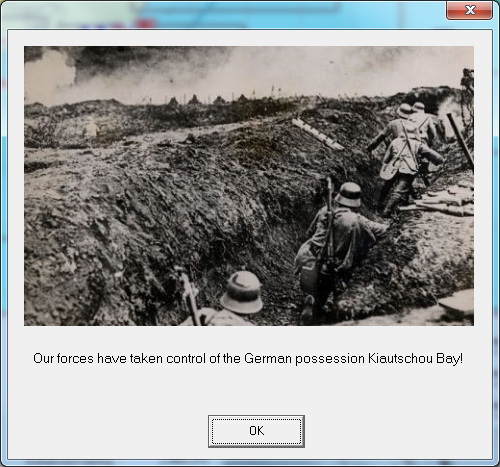
"It is with great pleasure that I present to you, Mister President, and to the people of Cascadia... the Chinese city of Tsingtao, with over 4,000 German prisoners…." - Excerpt of telegraph wired from General Brewer, Tsingtao, to President Matthews and the Army Chiefs of Staff, Portland. Signed 2 May 1909.
After over half a year under siege from vigorous Cascadian attacks, having been abandoned by the German Pacific Squadron and placed under blockade by Cascadian and Japanese ships, the German governor Oscar von Truppel relented. The entirety of the German concession in China was surrendered to the Cascadian Republic.
The fall of Tsingtao was the jolt Cascadian morale needed after the bloody April in Europe. German power in the Pacific, while not destroyed, had been severely undermined. Cascadia immediately opened negotiations with the Chinese government with the intent of taking over the German concession. In Portland Parliament ordered a reward for General Brewer and his troops. Newspapers across the nation trumpeted the victory. A town in Montana renamed itself Brewerville, and the city of Boise celebrated their native son by a popular push to have him elected mayor when the war was over.
In Berlin, Chancellor von Bülow's sour predictions suddenly seemed to be coming true. Tsingtao had been Germany's gate to the markets of China and its teeming masses. Now that vital port was in Cascadian hands, and Germany had nothing with which to compel her to return it. A growing peace party in the Reichstag demanded a change in the ministry and negotiations before Germany's losses mounted.
Cascadian shipyards finished their dock expansion.
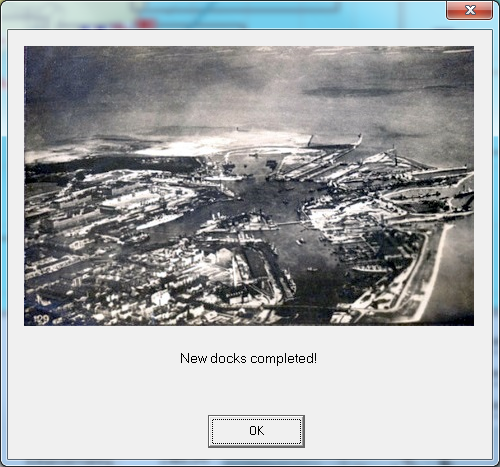
The San Francisco was commissioned.
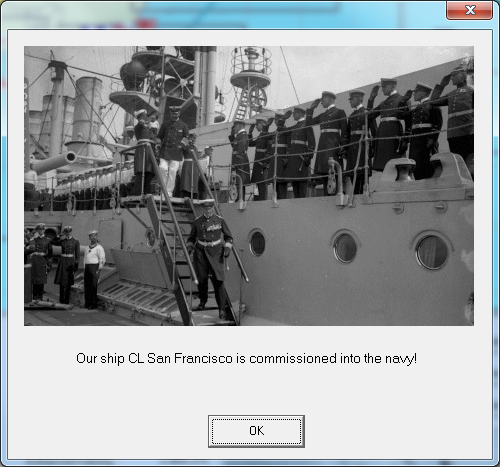
The Admiralty approved construction and employment of Q-ships; armed anti-submersible ships disgusied as trawlers and merchants.
Q-Ships research advanced
It was slim pickings for the Cascadian Navy in May. Only the Fairbanks succeeded in a sinking, in West Africa. The German Gefion sank two Cascadian merchants in Southeast Asia, threatening the ongoing trade with British Malaya and the Dutch East Indies, while the Nymphe sank two ships on the routes to Hawai'i while prowling the East Pacific.
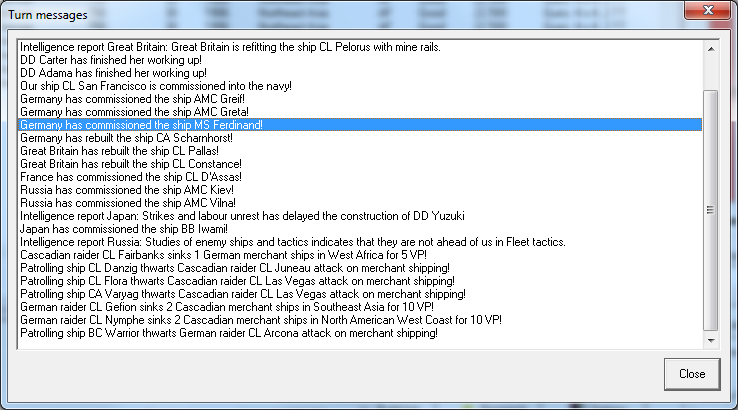
French forces took another key city in Togo, threatening that German colony with collapse.
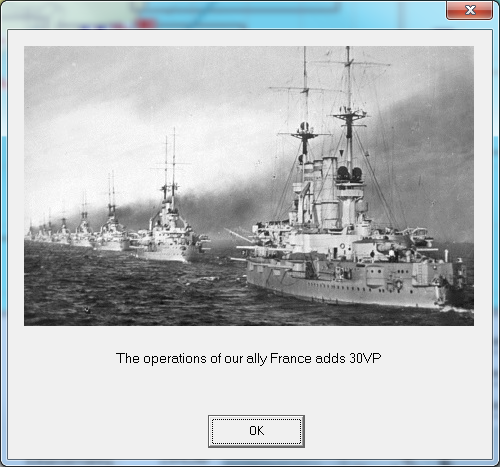
The loss of morale was not Germany's alone. The Russian fleets in the Pacific showed a lack of energy, refusing to engage the Cascadian fleet off Vladivostok and even calling off a coastal raid on Cape Disappointment on the Cascadian Coast due to the presence of Cascadian cruisers.
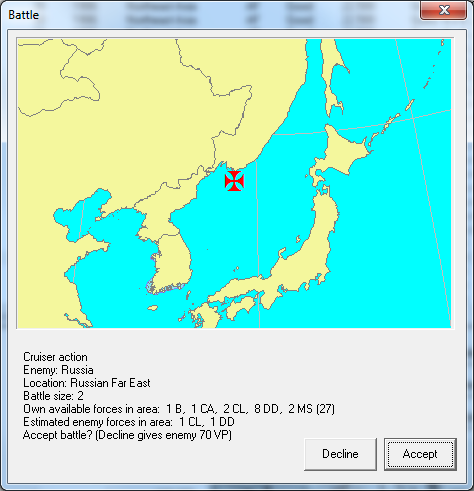
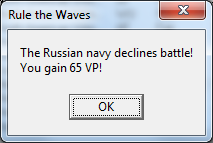
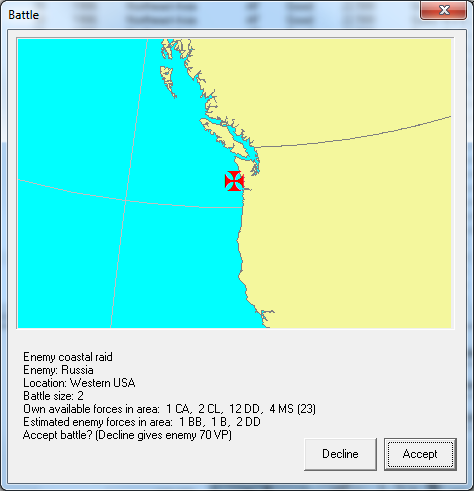
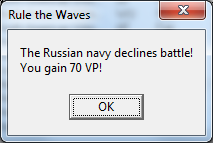
The Navy immediately contracted for an expansion to the German fleet base at Tsingtao, now under Cascadian control.
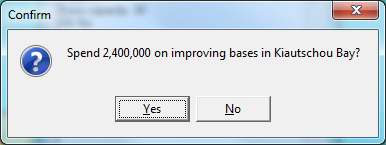
A second Sacramento-class cruiser, the Tacoma, was ordered.
Due to the defeat in April, the Cascadian Army begins to take the armored treaded vehicle concept seriously. The Kansas-born inventor, Thomas Barnes of Calgary, is hired to join the Army engineers in improving the design. By the end of the month work was already proceeding on the first test models, with plans to begin production as soon as the design was considered suitable.
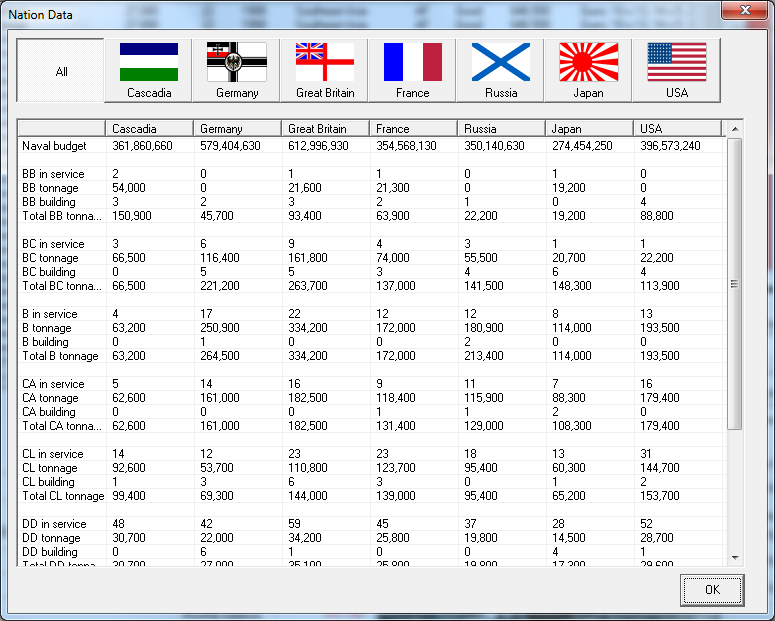
June 1909
The fall of Tsingtao gave one last ember to the faltering forces of de la Vega in Saipan. This was necessary, as his supporters on Tinian were now surrendering their last stronghold to the victorious German garrison. Meeting with a Cascadian supply force, de la Vega pleaded for the Cascadians to immediately invade Saipan before his worn down guerrillas were crushed utterly.
De la Vega's plight was known in Portland. President Matthews urged the Army and Navy to act. But the German forces in the Pacific were still too strong to safely conduct an invasion, Admiral Garrett insisted. He needed time to bring their reinforced Pacific Squadron and its battleships to battle. The Army went even further and refused to commit to such a rapid invasion; its forces in the Pacific were still re-orientating from thee taking of Tsingtao, and another group of divisions were on their way to France. The Army wouldn't have the manpower ready for another few months, at least.
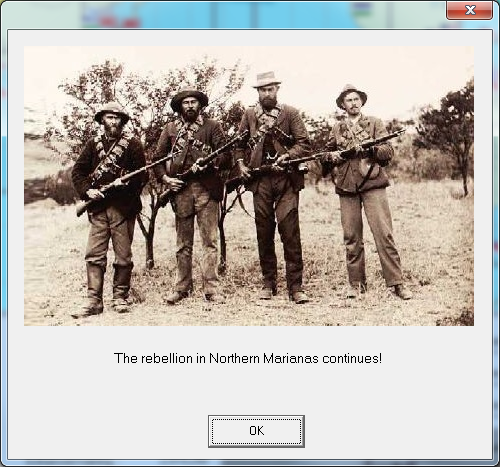
French naval officials requested permission to purchase plans for Cascadian naval ordnance, specifically the increased oblique penetration capabilities they had now. The sale was approved.
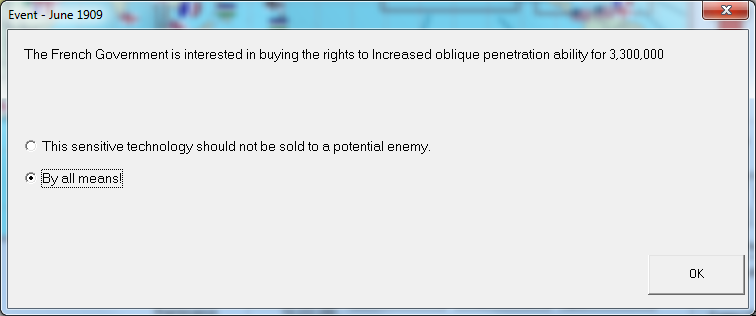
Japan defeated another Russian counter-attack on the Yalu River. The Japanese were on the verge of another offensive toward Mukden or Port Arthur.
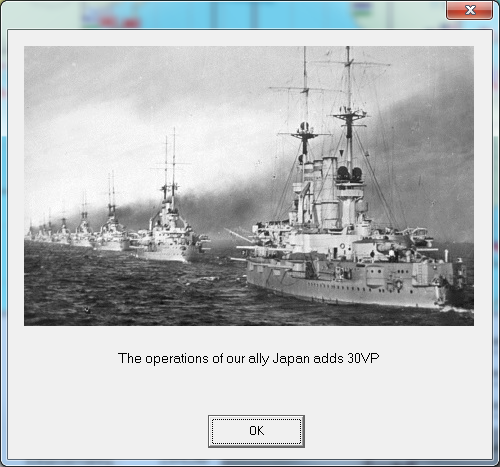
Another German submersible was sunk, this time off the coast of Normandy.
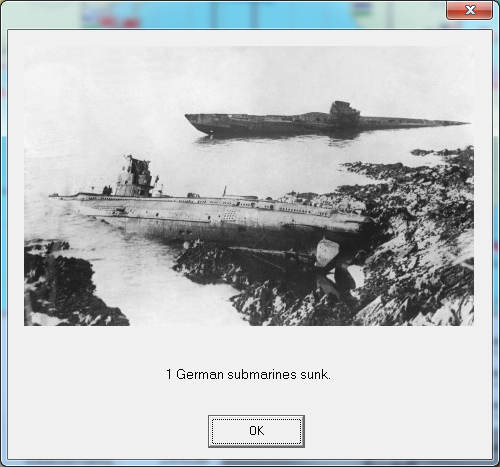
The Russians refused an engagement in the waters off Kamchatka.
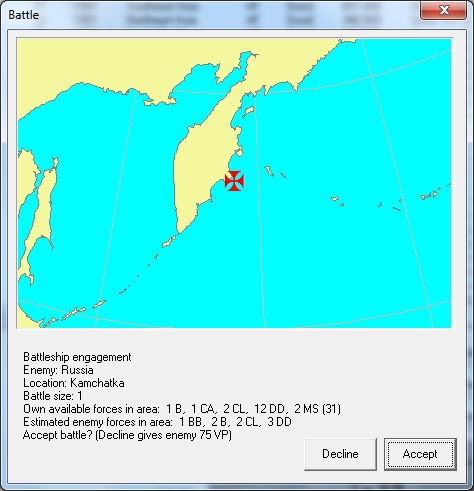
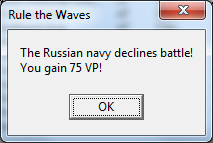
On June 6th, at 1642 local, a Russian armored cruiser nearly intercepted the Fairbanks off the Congo.
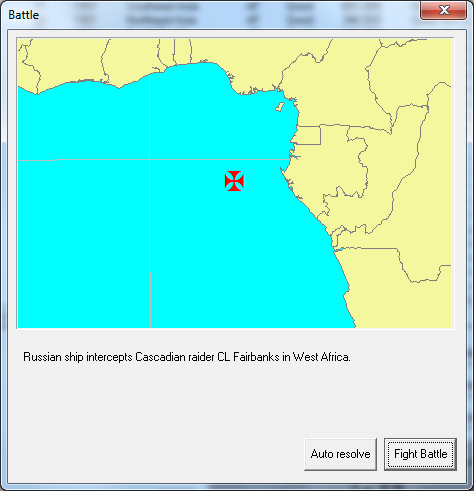
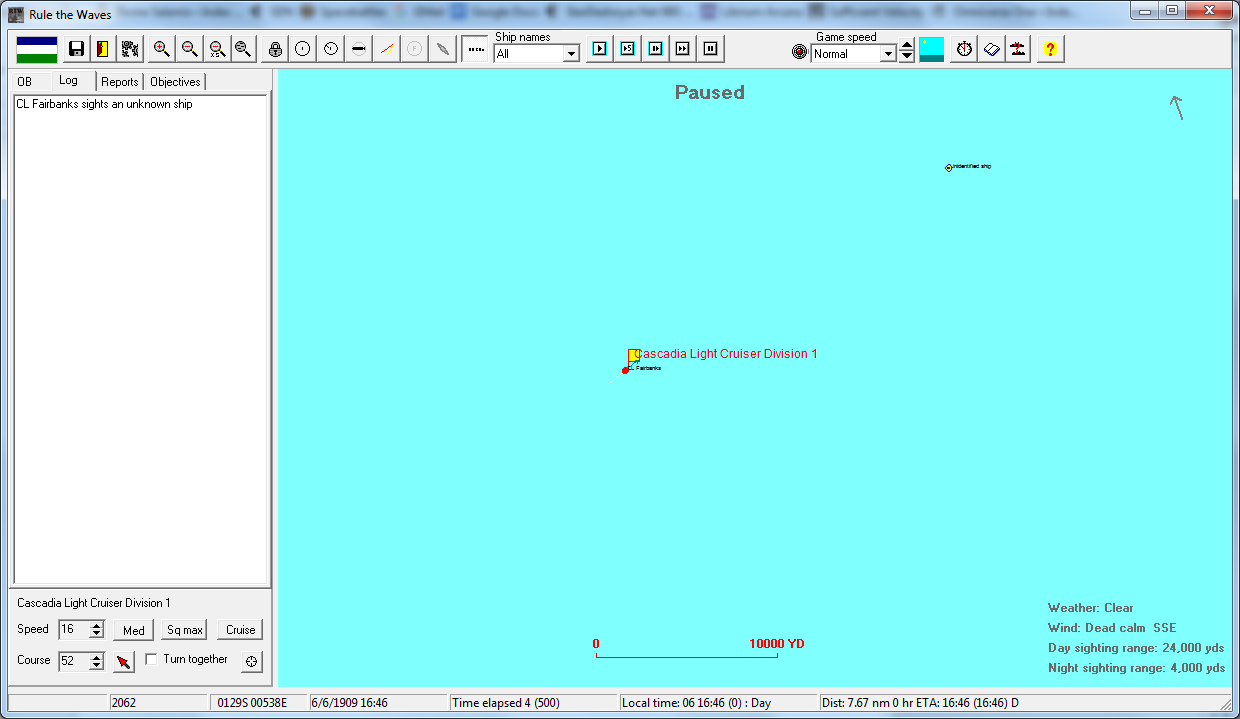
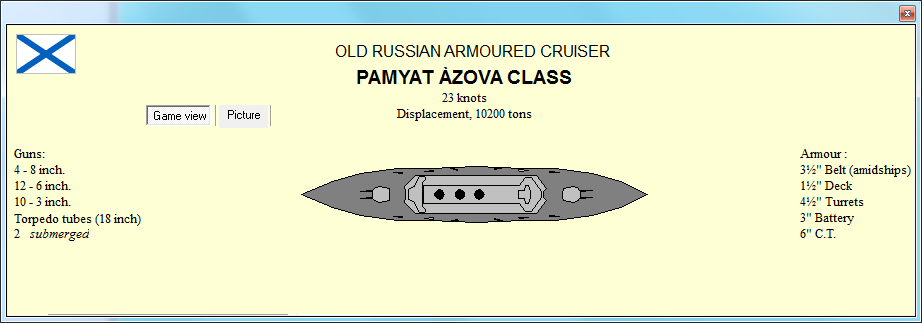
Fairbanks turned northwest to evade and got away during dusk before the Russian got into firing range.
A new dock expansion project was ordered.

The wartime budget expansions had given Admiral Garrett one unexpected ability: the ability to expand the Navy's construction planning by sustaining work on three new sovereign-type battleships as well as the new model of scout cruisers.
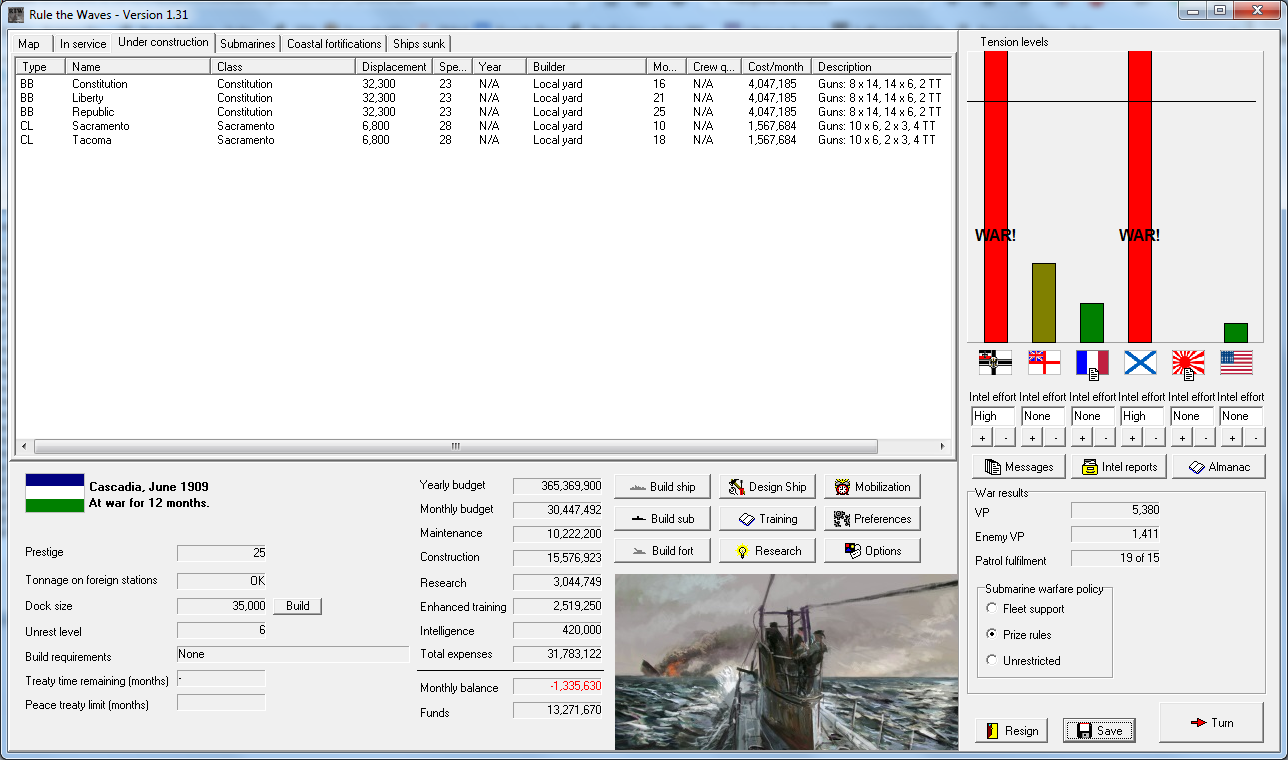
The destroyer Reynolds was commissioned.
The beginning of the year brought with it news of demonstrations and social disturbances striking several Russian cities.

Tsar Nicholas was beginning to repent of allowing himself to be talked into the war. So far it had only seen setbacks. The Japanese Army had won the opening battles in Northern Korea and Manchuria. The Germans were calling for extra forces in Alsace-Lorraine to prepare for a large-scale offensive when Russia needed as many troops as it could send to Manchuria. Now the protests and disturbances shook his prior confidence that Russia was ready for the war.
Under his instructions, the Russian Embassy in the United States approached the Cascadians with a status quo antebellum peace agreement.

The response in Portland was mixed. The growing influence of Flagg and other peace supporters threatened the toppling of the Government one day, should they lose their parliamentary majorities. But the country was winning the war on the sea. Admiral Garrett proposed that it was too early to make peace, not without undermining the nation's confidence. With his recommendation at hand, the Hawks countered the Russian proposal with one requiring Germany withdraw from the Marianas Islands and cede Lorraine back to France.
The Cascadian counter-offer was a waste. None of the other powers wanted peace yet. Japan had its sights set on Manchuria. Cascadia wanted Tsingtao and possibly other German or Russian possessions in the Pacific. France was eager to reclaim Alsace-Lorraine. Germany was also quite devoted to the war now, believing it the best chance they had to put France down for another generation and then claim Samoa by overwhelming the Cascadians and Japanese in the Pacific.
In the end, Tsar Nicholas II's peace offer was meaningless by any pragmatic purpose.

During the month, raiding had mostly petered out. The German cruiser Hertha continued to prowl off the Cascadian coast, avoiding the Cascadian cruisers tasked to her destruction. She could only manage one ship sent to the bottom in all of the month.
Fairbanks did the same. Still operating out of the French ports along Africa's western coasts, the raiding cruiser spotted and sunk a Russian merchantman before she could get to a neutral port.
The French fleet bombarded the Tanganyikan coast, to some moderate effect.

Meanwhile there was a one-sided naval combat in Korea Bay.

Cascadian cruisers supporting the siege of Tsingtao sortied into the northern part of the Yellow Sea, near the Liaotung Peninsula. The Nez Perce, Vancouver, and Richland led four destroyers in the sortie.


They caught two Russian destroyers patrolling out of Port Arthur and sank them both after about eighty minutes of maneuvering and firing. This success was followed up by sweeping the coastline and picking off two Russian merchant ships. With the clean sweep completed, the Nez Perce and her force returned to their siege positions.


To better support efforts against the large German fleet amassing in Rabaul and Guam, the Navy ordered expansions to the naval facilities at Chuuk, Palau, and Yap.

The Admiralty
Portland, Federal District
28 January 1909
"What is it, precisely, that I am looking at?", Admiral Garrett asked his new Chief of Naval Design and Procurement, Vice Admiral Arnold Davies.
The tall Albertan man had placed a technical drawing of what looked to be a big metal box with slight curves on the ends and a large caterpillar track on the bottom. "A landship of some sort," Davies answered. "A fellow I know back in Calgary proposed it a year or so ago."
"What fellow?"
"An American immigrant from Kansas working as a draftsman for a farm equipment company, Johnson Brothers," Davies clarified. "Tom Barnes is the name. Anyway, he passed it on to me when I was last home checking up on my parents' farm. With a war looming he thought it might work against enemy trenches and defenses."
"Hrm. The armored steel hull might work, I suppose. You could pass this on to… who's that fellow now in charge at the Army Quartermaster?"
"General Knox."
"Ah. Knox, yes. Send it on to him, with my blessing. Anything to help our friends in the Army deal with German trenches once they get to France."
February 1909
With Cascadian and Japanese support, the rebellions on Saipan and Tinian continued to reduce the German garrisons and tie down German forces in the Pacific. The leader of the rebelling forces, Don Pedro de la Vega, urged the two powers to invade as soon as possible. While his rebels were holding their own for the moment, they lacked the manpower to wage even an attritional war. The revolt needed immediate reinforcement if it was to survive.
But whether it could get such reinforcement was up to debate. The Japanese fleet was remaining concentrated in the Sea of Japan and Yellow Sea, supporting Japan's Manchurian aspirations. Cascadia also had a substantial force in place to support the forthcoming invasion of Kiautschou. The Cascadian naval forces in the Philippines and Carolines were only powerful enough to thwart any German moves against Cascadian holdings or Japanese Formosa, not to support an invasion of the islands.
And so, for de la Vega and his people, the rebellion against Germany became a question of how long they could hold out.

The situation in Russia remained explosive. Increased protests and demonstrations rocked the great cities of Russia throghout the month while the price of bread increased.
More disturbances in Russia
The Carter and Adama commissioned.

The Executive Mansion
Portland, Federal District
8 February 1909
President Matthews and Secretary of State Lakeland were overseeing the day's meeting of the War Cabinet. The strategy elements of the meeting had led to Admiral Garrett's summoning, as it had with the Army Chief of Staff, General Patrick Landers.
They were now pouring over a map of France and Germany's common border. Markings were placed to show where the Cascadian Expeditionary Army, now 400,000 strong, were awaiting orders with the French to commence an offensive.
It was the nature of that effort now being discussed. "The Army is in need of more funds to furnish the gear and arms our boys need in Europe," Landers explained. He kept his eyes on Garrett before saying, "I think we would best be served if the Army were granted more of the war budget that was set aside for the Navy."
It didn't surprise Garrett in the slightest to hear that. "My ships are what keep our communications with France open," the Admiral pointed out. "I can't afford to have much taken from me."
Landers frowned at that. "Admiral, with all due respect, your ships can't win a land war. And if the French are forced out of the war by German armies, your ships will be outnumbered when the Germans send their fleet to the Pacific. My boys need that support."
The Admiral considered that. He thought of his own efforts, the budgets he was spending to assist with them… and finally nodded. "I understand. I could make do with some diversion of funds from the Navy, so long as the Army makes sure to make good use of them."
"Our boys will, sir, I can guarantee that," Landers insisted.

West Portland, Oregon
12 February 1909
Admiral Garrett stepped out of the horseless cab with his umbrella up and catching the rain pouring down. A late winter rain had turned the weather gloomy… excellent weather for a war, he supposed. For the mood of one anyway.
He entered the home and allowed Josephine to take his umbrella and coat. "They're waiting for you in the parlor, sir," she said. "The miss and the children."
"Really? It's about dinner time, though, I would imagine the dining room…" He said nothing more at that point and went on to the parlor.
Rachel was in a chair. Gabbie, now a rambunctious four year old, was in her lap looking tthrough a childrens' picture book. Sophie, tall and growing into womanhood like a hand fitting into a glove, was in a plain dress and enamored in her own book. Thomas was sitting beside Rachel. He had something in his hand.
The Admiral looked at his younger son. Thomas had a look about him of anticipation and nervousness. And he could see Rachel was frowning. "What did you get, Tom?" He kept an even expression. "A response from Berkeley?"
Thomas wordlessly handed him the paper. He took it and unfolded it.
The heading said it all. "National Service Administration".
A painful twist filled Admiral Garrett's stomach.
Thomas had been drafted.
"I'm to report next week," Thomas explained. "For medical evaluation."
"I see." He found a seat and considered the paper in his hand. "Well, I… I am certainly surprised."
"Can't you stop it?", Rachel asked. "He's going to be accepted to Berkeley. He's too smart to be shanghaied into the Army!"
"It is out of my power, love," he answered in apology. "National Service answers to the War Office, not the Navy."
"But there must be something you can do!", she insisted. "Some way to keep him in university!"
"I have no authority to do anything on this matter, darling," the Admiral sighed. "It's not my department. The Service department will decide whether or not Tom goes to the Army or Navy or anywhere."
"It's… alright, mother," Thomas insisted. "And some of the other boys are talking about enlisting together. They'll let us, I hear. We'll get posted to a battalion being raised in West Portland."
"I'd rather you weren't at all!", Rachel shouted. "You're too brilliant, Tom, to go off and get killed in Europe. You'll serve the nation better as a scholar, not a soldier!"
Rachel was so clearly upset that the Admiral went over to her and set a hand on her shoulder. He had to admit he was reeling himself. Rafael had chosen his service; Thomas was being ordered into the army by the Government. His son was not soldier material. He was a thinker.
But the Republic was at war. And she was calling her sons to the colors. He couldn't stop that.
It was a terrible thing to be confronted with. The idea of Thomas dying on a distant battlefield, far from the cool green hills of the Cascadian heartland or the warm Californian sun he was born under.
It made all of those parents who had tried to slip their sons into Canada and the United States all the more understandable now. That the idea occurred to the Admiral stunned him. It would destroy his career if something like that happened…
"Mom, Pa, it'll be fine," Thomas insisted. "I'll sign up with Mike and Lewis and the others. We'll watch each other's backs." His voice lacked the confidence his words tried to convey. "I mean… there's nothing else I can do anyway. Not unless I leg it for Canada or the US, right? And that would ruin you, Pa. It'd cost you the Admiralty. I'm not going to let you down like that."
"There is the possibility of a deferment," the Admiral said. "If you can show you are going to higher education in a field of national importance."
"You did talk about becoming a doctor," Rachel said hopefully.
"That was just one idea," Thomas reminded his mother. "I really want to study law. I don't think they give deferments for that."
"There is military law," the Admiral pointed out. "The Judge Advocate Generals' Offices in each service. You would have to commit to becoming an officer with a regular commission, of course."
"I know. Well… I'm not sure. I'll see what the examiner says, I suppose."
The Admiral put a hand on his son's shoulder. "Whatever happens, I'm proud of you, Tom. I know you'll do something both smart and right."
"I'll always be proud of you," Rachel added. "I just think this is wrong for you."
This entire time the girls had remained quiet. Gabriela was still little, of course, but Sophie was reading a bit too intently. Admiral Garrett looked to her. "Sophie, are you alright?"
His question went unanswered. He called to her again.
That seemed to prompt a reaction. "I hate it," she said simply, and with some anger.
"Sophie?"
"I hate that Tom is being taken by the war," Sophie declared. "I hate the war and I think it should be stopped. All it does is get people killed."
Which, of course, was not an untrue view on war. He took his daughter by the shoulder, gently, and said, "I know it does. But there are principles in matters, dear. Sometimes peace can be worse than war."
"That doesn't make sense," Sophie protested.
"Not now, it doesn't. But when you've seen more of the world, more of how terrible things can be… you'll understand."
Even as he said those things, a chill went through the Admiral. Rafael would be graduating the Academy in a year. And now his other son was drafted. Both of them would face danger in the war if it continued on much longer.
And, as things stood, it would be going on for quite a while.
Mare Island designers perfected new Diesel engines for submersible craft.

Contact was lost with the Tarpon in Alaskan waters. Reports indicated a Russian gunboat may have caught the ship on the surface and sunk her before she could dive.

It was a decent month for Cascadian raiders. Fairbanks sank 2 German merchantmen in the waters off Cameroon. Las Vegas claimed another German north of Ireland. The Juneau had the best hunting of all, claiming three Russian merchant ships in the North Sea and off the Norwegian Coast.
The Marine Nationale conducted another attack on German possessions in Africa, causing damage to several shore installations.

The Cascadian Navy launched a major sortie into the Bismarcks, attempting to bring large elements of the German fleet to battle.

The battlecruiser Reprisal led a formation with the armored cruiser Reliant and the destroyers Bainbridge, Rodriguez, and Abraham Lincoln. They sighted the enemy not long after dawn in the waters between New Ireland and New Britain. The German armored cruiser Prinz Adalbert, a Prinz Heinrich-class ship, led three destroyers north from New Britain.

The battle immediately became fierce. The Lincoln lost a turret temporarily to enemy destroyer shelling. Reprisal took repeated hits from the Prinz Adalbert, but the enemy shells couldn't penetrate her superior armor. The Prinz Adalbert soon took several hits of her own from Reprisal and Reliant. By 1000 she was burning and crippled. She started to sink ten minutes later.

Meanwhile Reprisal caught another contact; an enemy destroyer who had fallen away from the battle with engine damage. Reprisal caught up and sunk her with repeated hits from her casemate and deck guns.

The second of three enemy destroyers was chased to the New Ireland coast and sunk by shellfire from Bainbridge.
The Battle of the Bismarcks was thus a clear and complete Cascadian victory. The German Pacific Fleet grew even more cautious afterward, worried that losing any further ships would ruin Germany's presence in the Pacific.




March 1909
The Riker is commissioned.
The Japanese Government approves the dispatch of advisors to Cascadian yards to demonstrate hydraulic riveting techniques, to improve the efficiency of hull designs.


Naval Artillery reported that they had completed work on crafting triple turrets for warships.

The Hertha arrived in West Africa, where she sank a Cascadian merchant near the Congo.

The Japanese dislodged Russian troops from another defensive position near the Yalu river.

The Russian fleet ignored a challenge toward the Liaotung Peninsula by a Cascadian detachment.


A Russian Griden-class cruiser, the AlmazI, intercepts the San Jose northeast of Ceylon.

Realizing he is outgunned, the Russian tries to break north. The San Jose pursues and begins a chase of several hours before the shellfire slows the Russian enough that San Jose puts a torpedo into her and finishes the Russian cruiser off.



In France, the Cascadian Expeditionary Force reaches a strength of 450,000 combat ready troops, a substantial contribution if still relatively small compared to the number of French and German men under the colors in Europe.
General Roger Parker, commander of the force, confers with the French Army on their employment. The decision is made to place the two forces, organized into the 1st and 2nd Armies and IX Corps as a ready reserve, into the flank of an intended French offensive in April. The French had intelligence of a planned German offensive with the arriving Russian forces and believed a spoiling attack could catch the Russo-German armies by surprise. The Cascadians and the Japanese Expeditionary Force, a two corps-sized army under General Maresuke Nogi, would participate on the flank of the French attack into Lorraine, tasked with securing northern roadways into Lorraine towards Metz.
April 1909
The Cascadian 8th Infantry Division, under Major General Andrew Brewer, continues its campaign to take Tsingtao. In a series of tightly-fought actions the 8th Infantry Division and its attached regiments take several critical positions despite intensive resistance in the heights of the concession zone, tightening the noose around the German-held Chinese city and isolating several German units from their main defenses.

On the 8th of April the weather permitted the launching of the Allied offensive. The Germans were caught by some surprise and lost several forward positions to the Allied armies.
But this success soon rebounded against them. Von Schlieffen ordered a counter-attack. German divisions were thrown into the northern flank against the relatively untried Cascadian and Japanese divisions. Initially the German counter-offensive was blunted in fierce fighting - one action would lead to correspondents dubbing the Cascadian 2nd Guards Regiment worthy of their nickname of "The Iron Wall" - until the Cascadian 4th Division broke under fierce German shelling and attack. The Cascadian positions faltered and General Brewer was compelled to order a withdrawal back to their starting lines. The Germans, looking to turn this into a rout of the Allied armies in France, launched a second attack on the beleaguered Cascadian forces. IX Corps was sent in to recover the situation and prevent the Germans from overrunning the Cascadian units as they retreated to their starting positions.
The French, recognizing the danger to their flanks, fell back from their own gains and attempted a counter-attack on the German flank that was thrown back with heavy losses.
By the end of the month, the Allied armies were back to their starting position, having suffered over two hundred thousand casualties with nothing to show for it. Several Cascadian brigades and regiments were utterly devastated. The Cascadian Expeditionary Force had suffered over 90,000 casualties by the end of the month. The Japanese had suffered proportional losses given their numbers. France had lost well over 100,000. The offensive was a terrible failure and resulted in the sacking of several French commanders as well as the commanders of the two Cascadian Armies and the commander of 4th Division. The German Army was spent for the moment, but with Russian reinforcements arriving the momentum along the border was with them.
In Cascadia, the wires coming from Europe soon turned the hope of a victory into frustration and despair. All of Representative Flagg's predictions seemed to be coming true; the Cascadian Navy had yet to win a truly big success and the Army in France had just suffered a major setback. Cascadian boys were dying by the thousands on French soil for nothing.
Secretary of State Lakeland soon found his Government challenged. A war appropriations bill in the House came under intense attack and soon developed into a real threat of toppling his Cabinet. Lakeland threw his full weight into wrangling the despairing Liberals flirting with the Doves back into line. On its final vote, the bill passed by two extra votes than needed, a narrow victory that prevented Lakeland from being toppled for the moment.
But he needed a victory of some sort soon, or he wouldn't be able to save his Government.

The Jackson and O'Neill are commissioned, finishing the run of Kirk-class destroyers.
The Bremerton is also commissioned before her lead-ship, the San Francisco. During trials, however, it turns out that errors in construction have caused the ship to be slightly overweight.

Another good month for the raiders passes. Fairbanks sinks three merchantmen in the waters of West Africa. Juneau got another in the North Sea, and Las Vegas sank two.
Meanwhile the Germans lost one raider, with the Hansa being interned. The Russian cruiser Rossiya sank a Cascadian merchantman in the Mediterranean.


Russian Rossiya sinks 1 Cas in Med
The Nez Perce led a raiding force that intercepted a Russian coastal convoy near Vladivostok, in heavy rain and bad weather. The armored cruiser and her fellows fell upon the enemy rapidly, forced to stay within 1,000 yards due to the bad visibility of the storm conditions.


The conditions were so bad that Vancouver accidentally rammed one of the enemy transports due to a mistake in maneuver.

After half an hour two of the enemy merchants were completely sunk. The others had fatal blows and would go down in the storm.

The force attempted to chase the enemy escorts fleeing toward Vladivostok. But wind conditions soon whipped up into a full storm and the Weld took damage. With the mission accomplished, the Cascadian force broke off and returned to port.
Nez Perce, Richland, Vancouver lead Sherman, Juarez, and Weld against Russian convoy off Primorsk Coast - Heavy Rain, contact at 0721 visibility 1.5k yards


With the funds from the war and the completion of the Kirk-class ships, Admiral Garrett decided to order a third ship of the Constitution line, the Republic.
Third Constitution, Republic, laid.
May 1909
May Day came. And with it, Representative Flagg and his party threw massive Socialist rallies in Portland, San Francisco, Seattle, Vancouver, and several other major cities. The marches and speeches celebrated the advancement of the labor movement and the increased voting for Socialist candidates. With the disaster in France known, it was also converted into an anti-war demonstration. Flagg stopped short of advocating the complete overthrow of the government but he did call on more strikes and anti-war marches to push the Parliament into toppling Lakeland's Cabinet. Privately he was certain that the defeat in Europe provided the necessary first step to defeating the Hawks in Parliament. The war was not going according to Lakeland's plan.
And then, suddenly, it wasn't going to Flagg's either.

"It is with great pleasure that I present to you, Mister President, and to the people of Cascadia... the Chinese city of Tsingtao, with over 4,000 German prisoners…." - Excerpt of telegraph wired from General Brewer, Tsingtao, to President Matthews and the Army Chiefs of Staff, Portland. Signed 2 May 1909.
After over half a year under siege from vigorous Cascadian attacks, having been abandoned by the German Pacific Squadron and placed under blockade by Cascadian and Japanese ships, the German governor Oscar von Truppel relented. The entirety of the German concession in China was surrendered to the Cascadian Republic.
The fall of Tsingtao was the jolt Cascadian morale needed after the bloody April in Europe. German power in the Pacific, while not destroyed, had been severely undermined. Cascadia immediately opened negotiations with the Chinese government with the intent of taking over the German concession. In Portland Parliament ordered a reward for General Brewer and his troops. Newspapers across the nation trumpeted the victory. A town in Montana renamed itself Brewerville, and the city of Boise celebrated their native son by a popular push to have him elected mayor when the war was over.
In Berlin, Chancellor von Bülow's sour predictions suddenly seemed to be coming true. Tsingtao had been Germany's gate to the markets of China and its teeming masses. Now that vital port was in Cascadian hands, and Germany had nothing with which to compel her to return it. A growing peace party in the Reichstag demanded a change in the ministry and negotiations before Germany's losses mounted.
Cascadian shipyards finished their dock expansion.

The San Francisco was commissioned.

The Admiralty approved construction and employment of Q-ships; armed anti-submersible ships disgusied as trawlers and merchants.
Q-Ships research advanced
It was slim pickings for the Cascadian Navy in May. Only the Fairbanks succeeded in a sinking, in West Africa. The German Gefion sank two Cascadian merchants in Southeast Asia, threatening the ongoing trade with British Malaya and the Dutch East Indies, while the Nymphe sank two ships on the routes to Hawai'i while prowling the East Pacific.

French forces took another key city in Togo, threatening that German colony with collapse.

The loss of morale was not Germany's alone. The Russian fleets in the Pacific showed a lack of energy, refusing to engage the Cascadian fleet off Vladivostok and even calling off a coastal raid on Cape Disappointment on the Cascadian Coast due to the presence of Cascadian cruisers.




The Navy immediately contracted for an expansion to the German fleet base at Tsingtao, now under Cascadian control.

A second Sacramento-class cruiser, the Tacoma, was ordered.
Due to the defeat in April, the Cascadian Army begins to take the armored treaded vehicle concept seriously. The Kansas-born inventor, Thomas Barnes of Calgary, is hired to join the Army engineers in improving the design. By the end of the month work was already proceeding on the first test models, with plans to begin production as soon as the design was considered suitable.

June 1909
The fall of Tsingtao gave one last ember to the faltering forces of de la Vega in Saipan. This was necessary, as his supporters on Tinian were now surrendering their last stronghold to the victorious German garrison. Meeting with a Cascadian supply force, de la Vega pleaded for the Cascadians to immediately invade Saipan before his worn down guerrillas were crushed utterly.
De la Vega's plight was known in Portland. President Matthews urged the Army and Navy to act. But the German forces in the Pacific were still too strong to safely conduct an invasion, Admiral Garrett insisted. He needed time to bring their reinforced Pacific Squadron and its battleships to battle. The Army went even further and refused to commit to such a rapid invasion; its forces in the Pacific were still re-orientating from thee taking of Tsingtao, and another group of divisions were on their way to France. The Army wouldn't have the manpower ready for another few months, at least.

French naval officials requested permission to purchase plans for Cascadian naval ordnance, specifically the increased oblique penetration capabilities they had now. The sale was approved.

Japan defeated another Russian counter-attack on the Yalu River. The Japanese were on the verge of another offensive toward Mukden or Port Arthur.

Another German submersible was sunk, this time off the coast of Normandy.

The Russians refused an engagement in the waters off Kamchatka.


On June 6th, at 1642 local, a Russian armored cruiser nearly intercepted the Fairbanks off the Congo.



Fairbanks turned northwest to evade and got away during dusk before the Russian got into firing range.
A new dock expansion project was ordered.

The wartime budget expansions had given Admiral Garrett one unexpected ability: the ability to expand the Navy's construction planning by sustaining work on three new sovereign-type battleships as well as the new model of scout cruisers.

”A Radical is a man with both feet planted firmly in the air.” – Franklin Delano Roosevelt
"No folly is more costly than the folly of intolerant idealism." - Sir Winston L. S. Churchill, Princips Britannia
American Conservatism is about the exercise of personal responsibility without state interference in the lives of the citizenry..... unless, of course, it involves using the bludgeon of state power to suppress things Conservatives do not like.
DONALD J. TRUMP IS A SEDITIOUS TRAITOR AND MUST BE IMPEACHED
"No folly is more costly than the folly of intolerant idealism." - Sir Winston L. S. Churchill, Princips Britannia
American Conservatism is about the exercise of personal responsibility without state interference in the lives of the citizenry..... unless, of course, it involves using the bludgeon of state power to suppress things Conservatives do not like.
DONALD J. TRUMP IS A SEDITIOUS TRAITOR AND MUST BE IMPEACHED
Re: Let's Play "Rule The Waves" w/ Steve's Custom Country "Cascadia"
I figured your family background made the idea of Capt. Wallace being a Scots immigrant to Cascadia reasonable.Eternal_Freedom wrote:Sweet, time to get into the war.
Incidentally, since you've given me a slight Scots accent, you might want me/him to bring up the clan motto at some point: Pro Libertate/For Freedom. Seems to fit Cascadia
And I may have him say such when he finally gets to smell battle smoke and watch German shells come flying in...
”A Radical is a man with both feet planted firmly in the air.” – Franklin Delano Roosevelt
"No folly is more costly than the folly of intolerant idealism." - Sir Winston L. S. Churchill, Princips Britannia
American Conservatism is about the exercise of personal responsibility without state interference in the lives of the citizenry..... unless, of course, it involves using the bludgeon of state power to suppress things Conservatives do not like.
DONALD J. TRUMP IS A SEDITIOUS TRAITOR AND MUST BE IMPEACHED
"No folly is more costly than the folly of intolerant idealism." - Sir Winston L. S. Churchill, Princips Britannia
American Conservatism is about the exercise of personal responsibility without state interference in the lives of the citizenry..... unless, of course, it involves using the bludgeon of state power to suppress things Conservatives do not like.
DONALD J. TRUMP IS A SEDITIOUS TRAITOR AND MUST BE IMPEACHED
Re: Let's Play "Rule The Waves" w/ Steve's Custom Country "Cascadia"
Nicely written - why do I have the feeling Garrett is likely going to lose one of his sons  ?
?
Thank you for the effort; how much time do you need to write an installment ? Probably longer than playing it out.
Thank you for the effort; how much time do you need to write an installment ? Probably longer than playing it out.
"In view of the circumstances, Britannia waives the rules."
"All you have to do is to look at Northern Ireland, [...] to see how seriously the religious folks take "thou shall not kill. The more devout they are, the more they see murder as being negotiable." George Carlin
"We need to make gay people live in fear again! What ever happened to the traditional family values of persecution and lies?" - Darth Wong
"The closet got full and some homosexuals may have escaped onto the internet?"- Stormbringer
- Eternal_Freedom
- Castellan
- Posts: 10413
- Joined: 2010-03-09 02:16pm
- Location: CIC, Battlestar Temeraire
Re: Let's Play "Rule The Waves" w/ Steve's Custom Country "Cascadia"
Ah excellent, you're thinking is spot on.Steve wrote:I figured your family background made the idea of Capt. Wallace being a Scots immigrant to Cascadia reasonable.Eternal_Freedom wrote:Sweet, time to get into the war.
Incidentally, since you've given me a slight Scots accent, you might want me/him to bring up the clan motto at some point: Pro Libertate/For Freedom. Seems to fit Cascadia
And I may have him say such when he finally gets to smell battle smoke and watch German shells come flying in...
Hmm, a 3rd Constitution...and we haven't had Enterprise yet? Bah!
Baltar: "I don't want to miss a moment of the last Battlestar's destruction!"
Centurion: "Sir, I really think you should look at the other Battlestar."
Baltar: "What are you babbling about other...it's impossible!"
Centurion: "No. It is a Battlestar."
Corrax Entry 7:17: So you walk eternally through the shadow realms, standing against evil where all others falter. May your thirst for retribution never quench, may the blood on your sword never dry, and may we never need you again.
Centurion: "Sir, I really think you should look at the other Battlestar."
Baltar: "What are you babbling about other...it's impossible!"
Centurion: "No. It is a Battlestar."
Corrax Entry 7:17: So you walk eternally through the shadow realms, standing against evil where all others falter. May your thirst for retribution never quench, may the blood on your sword never dry, and may we never need you again.